





































THE NEW NASCAR
Richmond Raceway showcases e orts by stock car racing’s governing body to broaden its fan base By Adam Cheek
We’re seeing out the dog days of summer by celebrating Richmond’s successes and sighing over the slipups
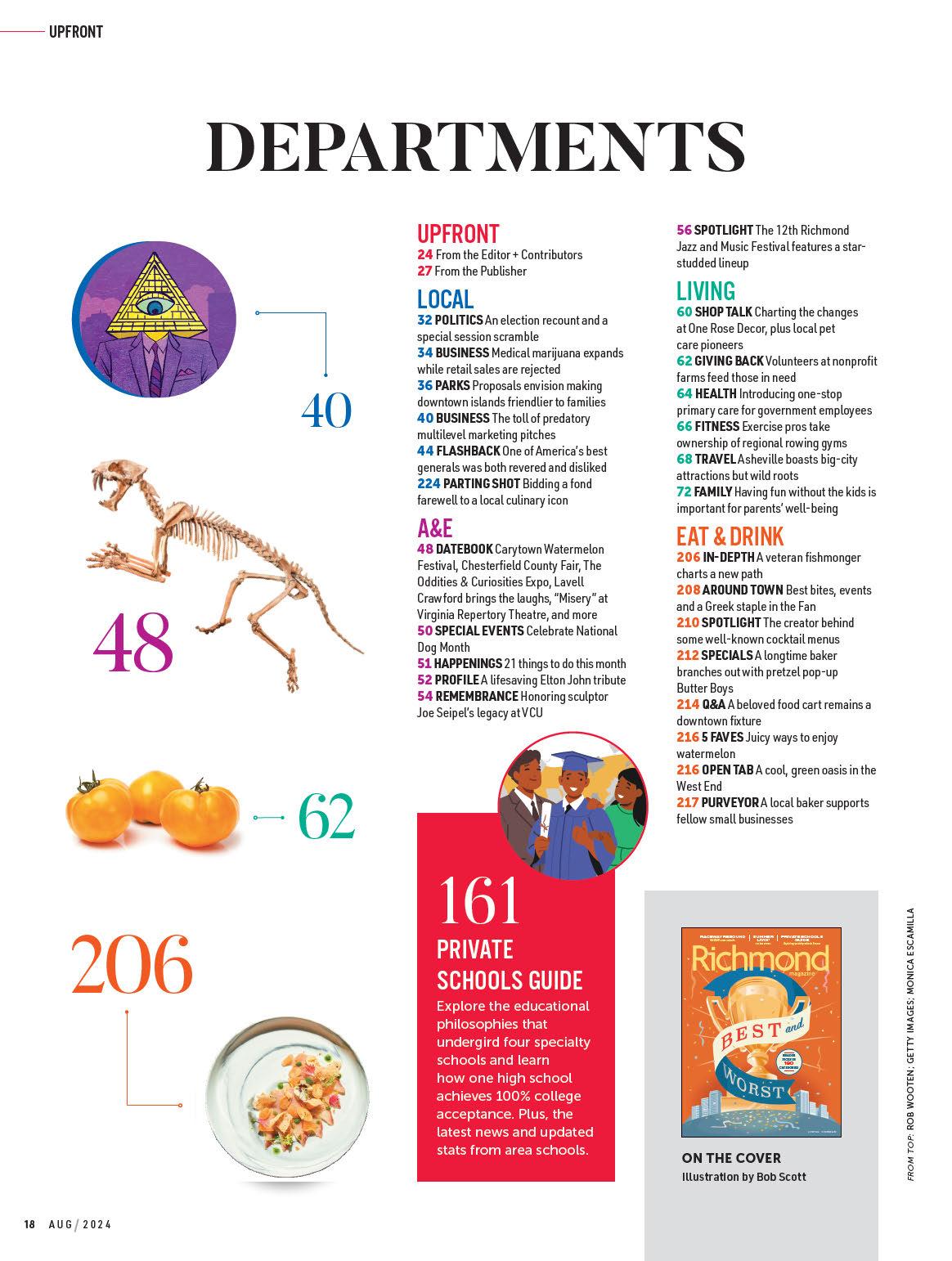

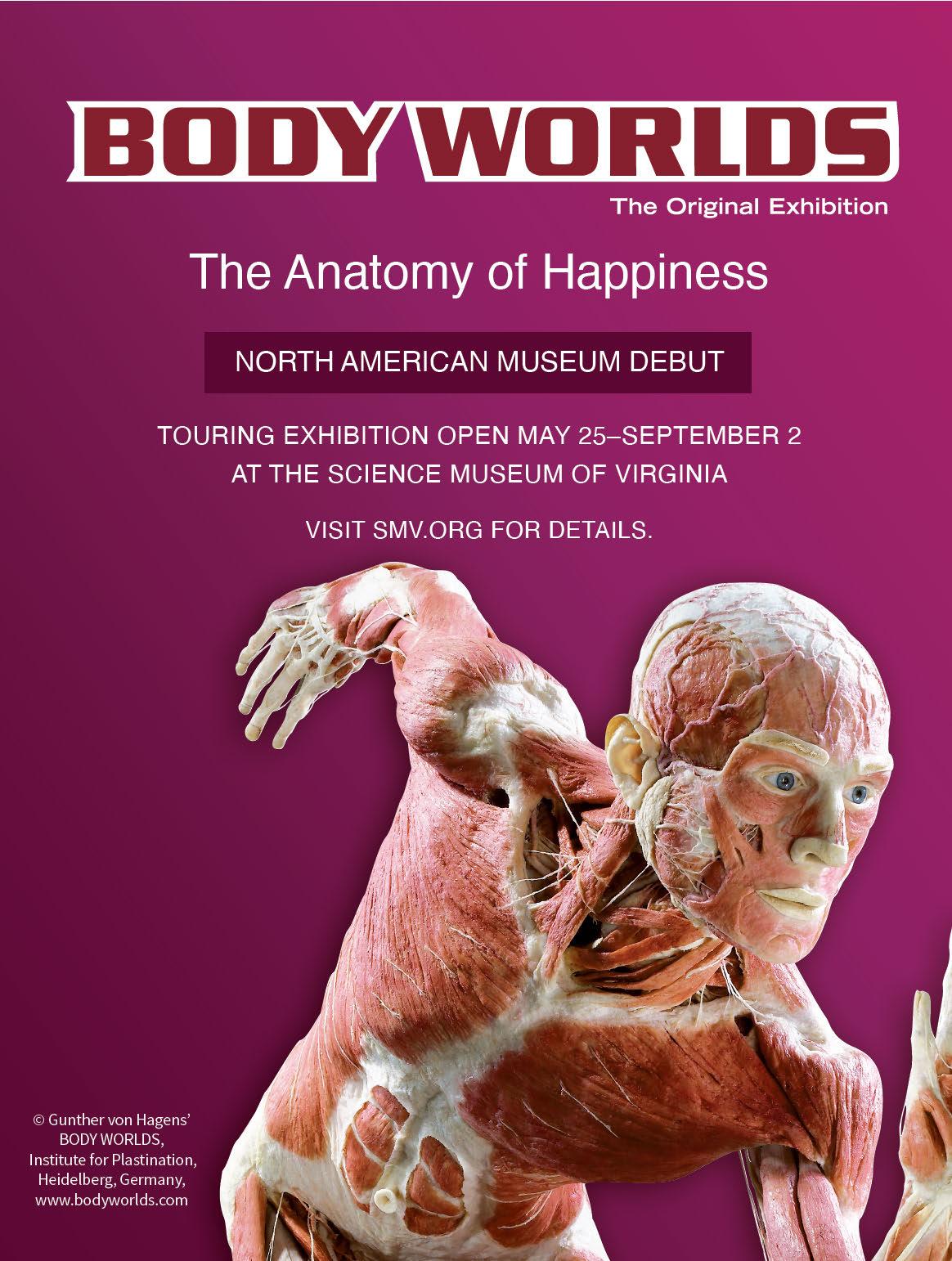
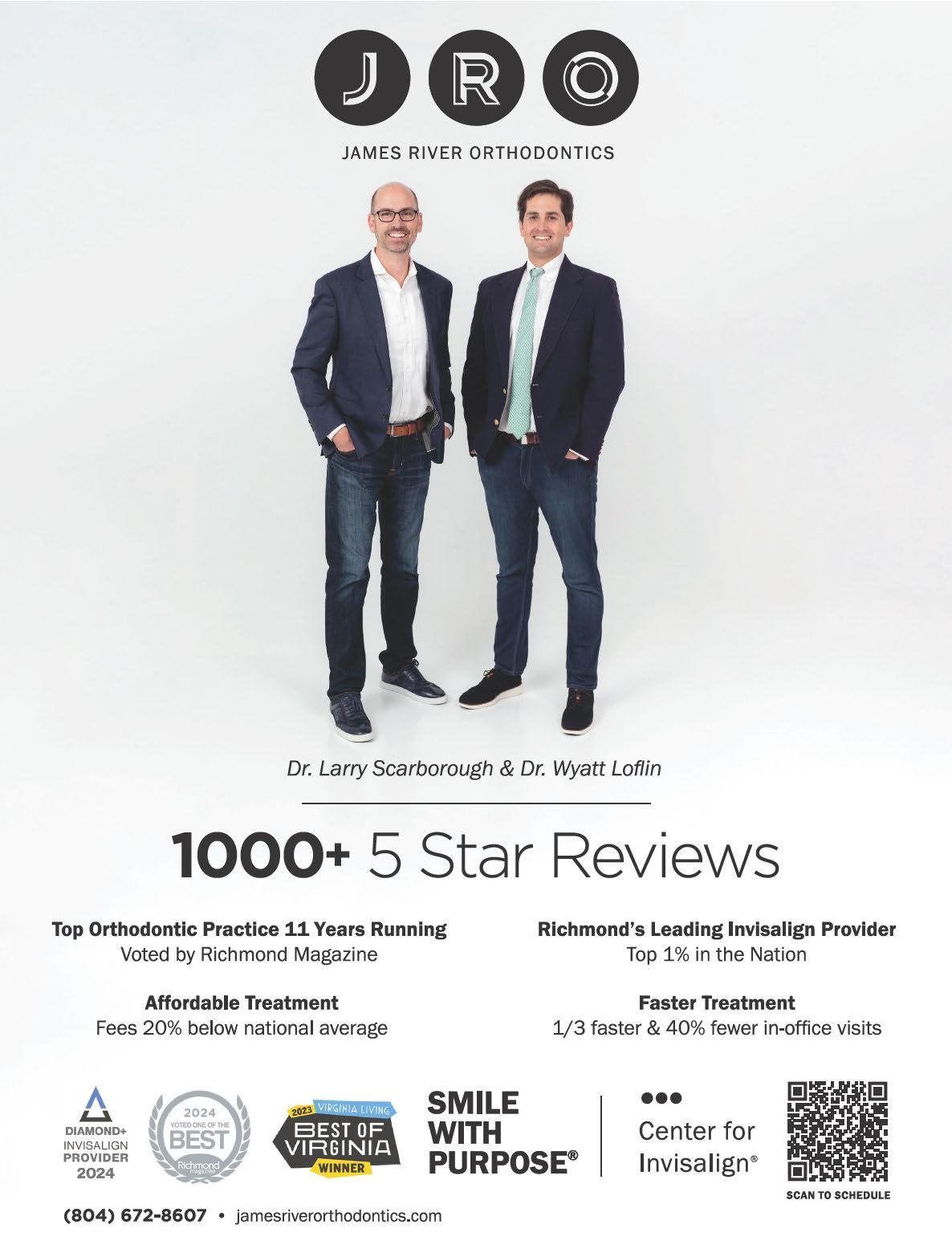


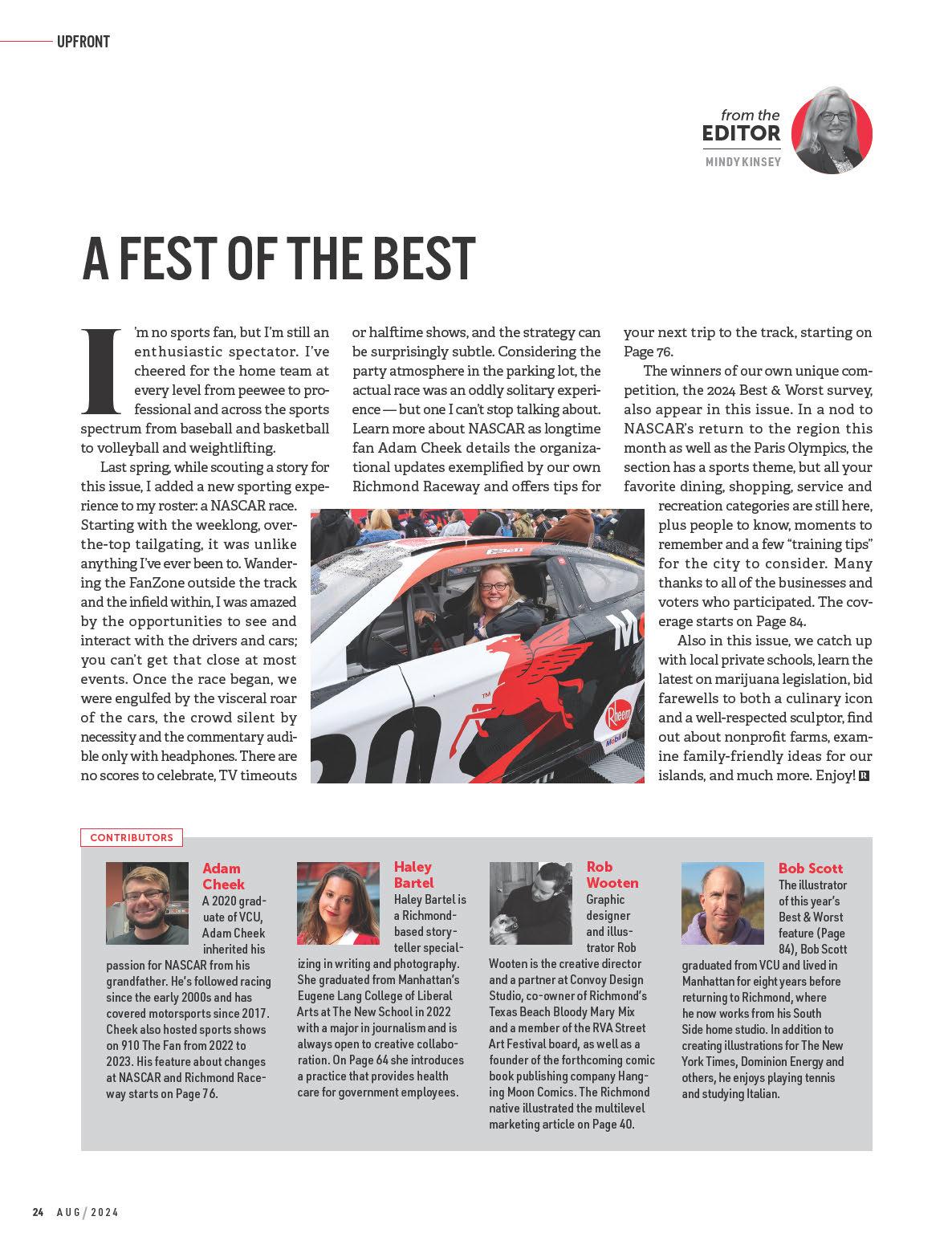


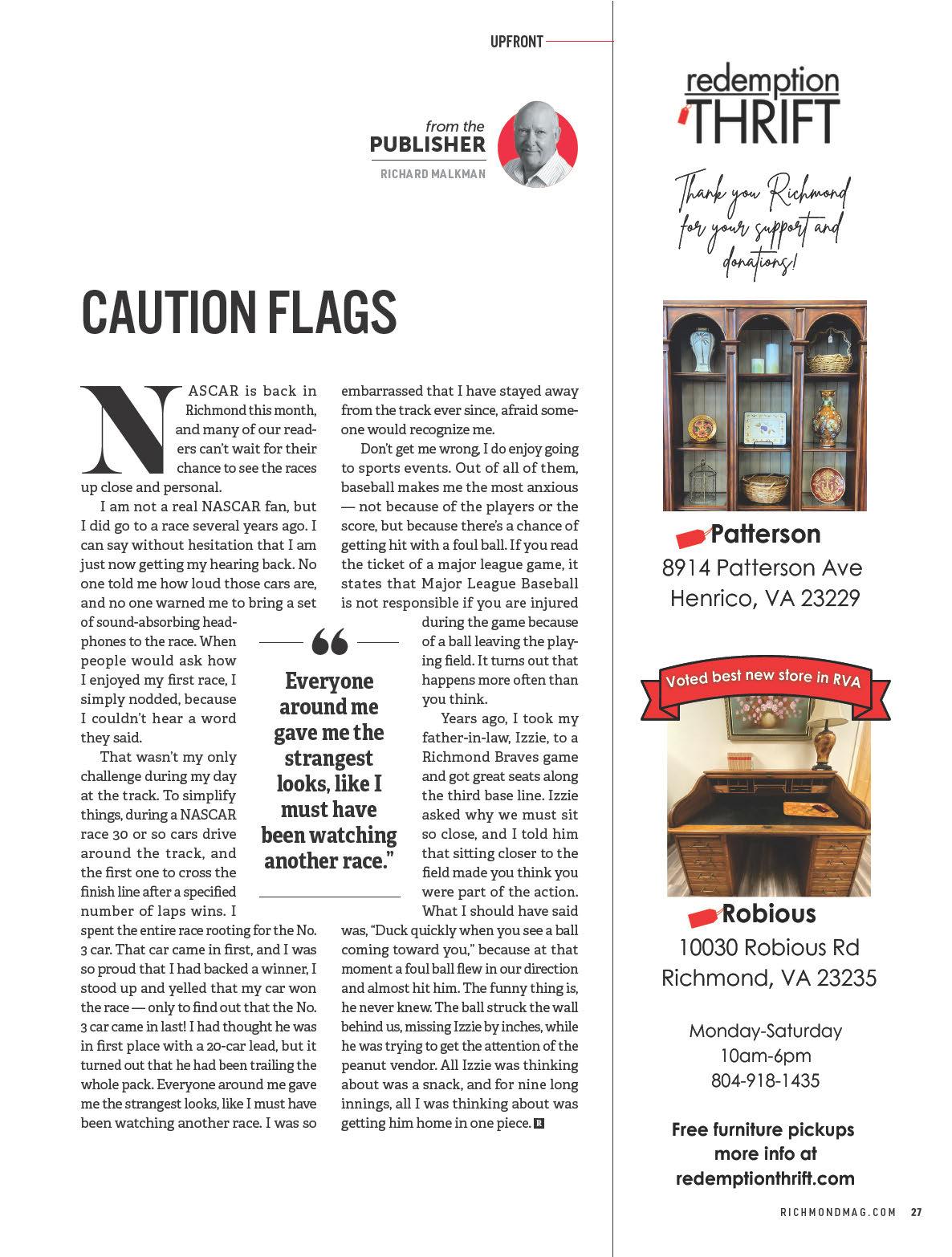


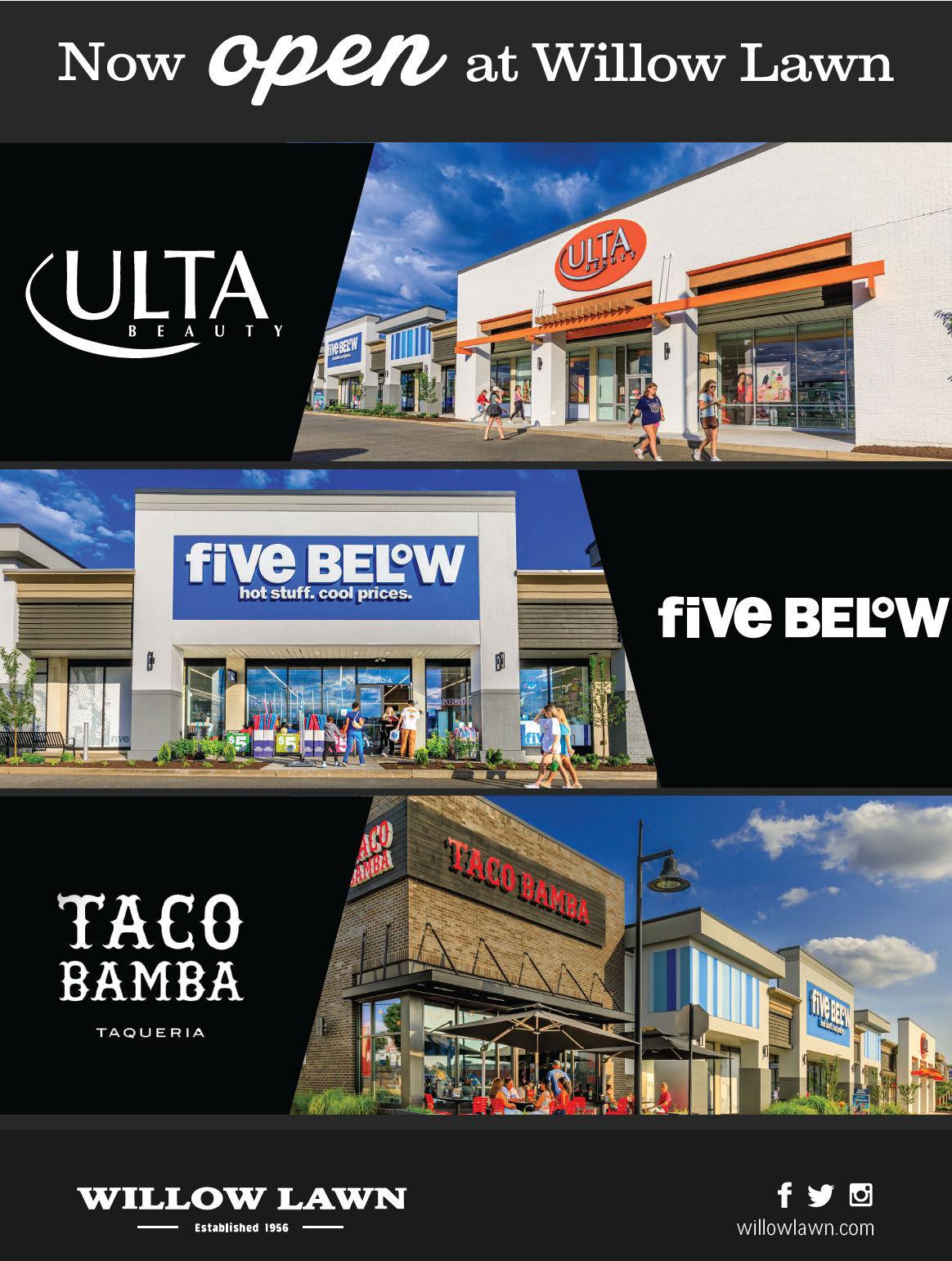
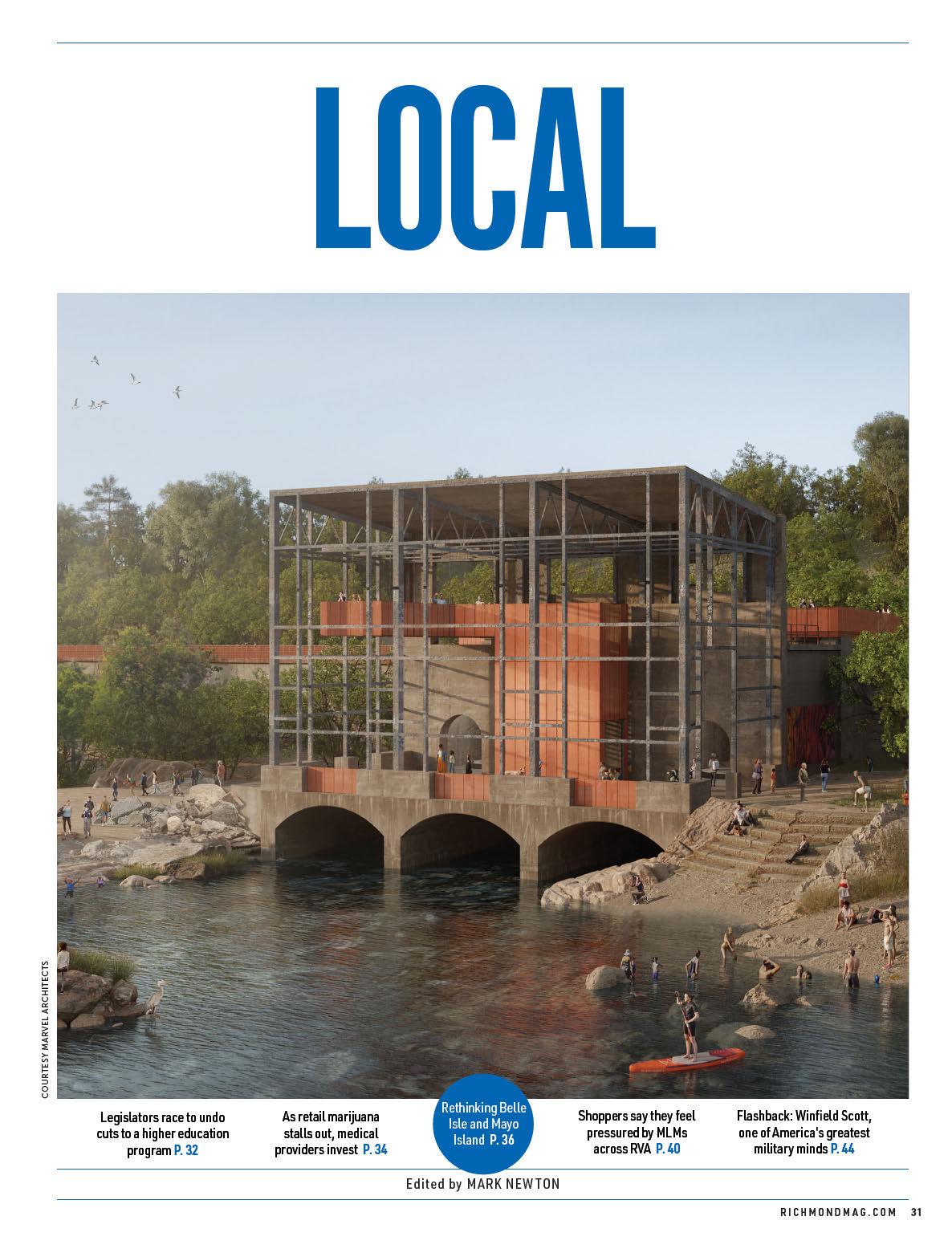
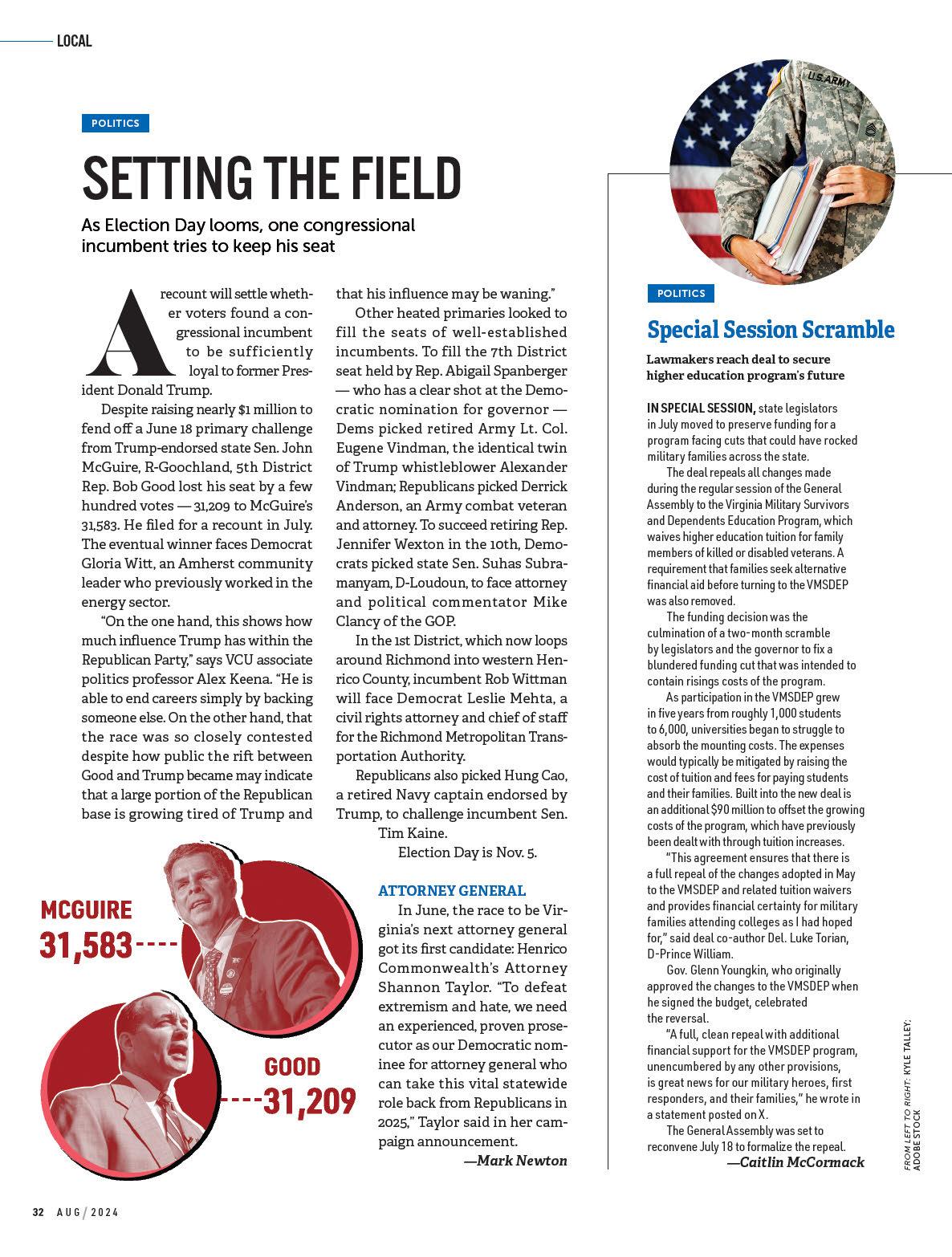



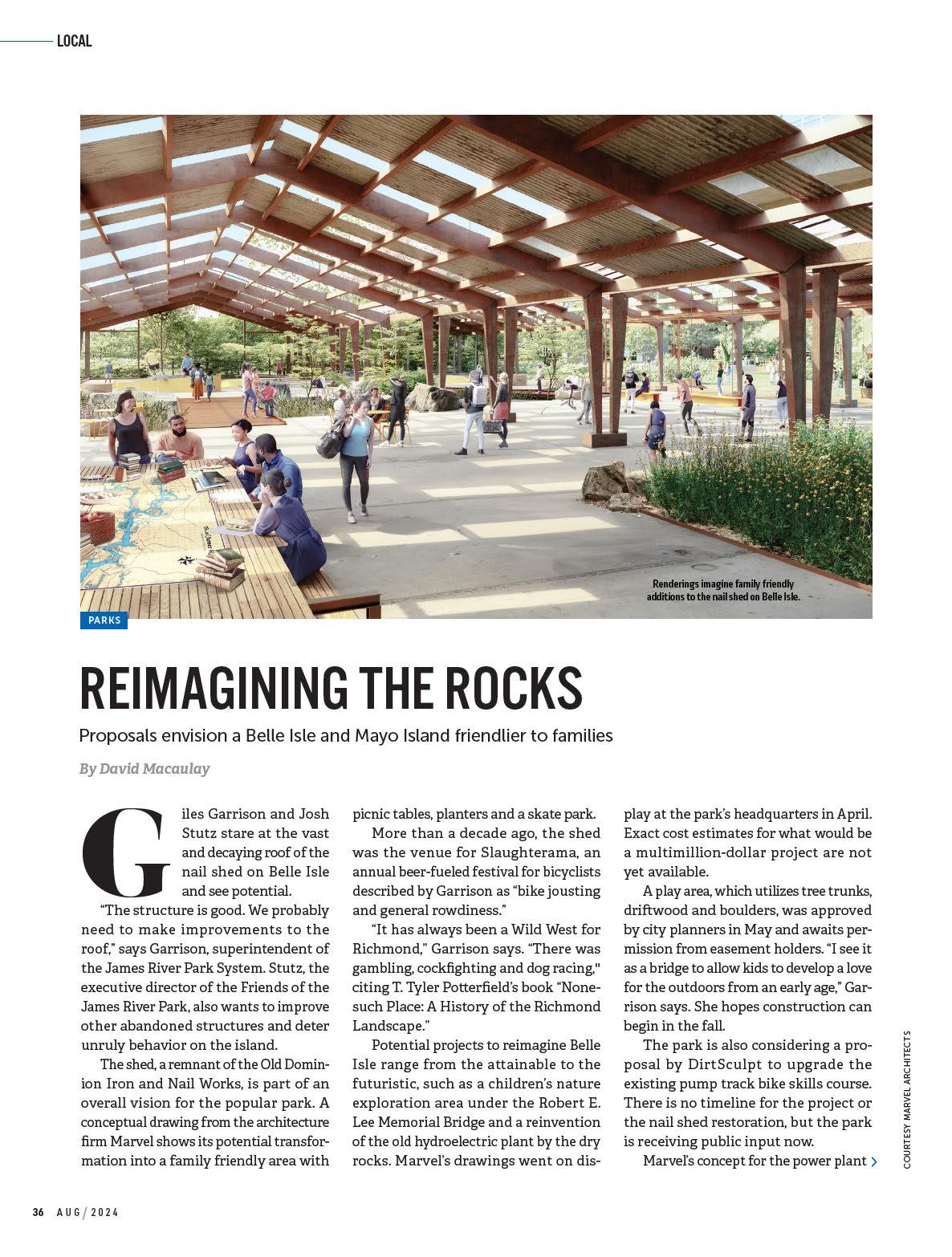





that analyzed the business models of 350 MLM companies.
Despite these statistics, distributors are pressured to rack up debt to a end conferences and training or pay for marketing materials and other expenses related to involvement, all to reach the levels of success their mentor or upline had claimed when they were recruited. Most MLM participants make less than 70 cents per hour in sales before business expenses, according to The Washington Post.
For context, Gilstrap cites Steve Hassan, a cult and mind-control expert, Gilstrap says. “He addressed how MLMs use manipulation and blame to ensure any failures to earn large sums of cash through the business model are placed on distributors for their lack of competence or hard work,” she says.
Gilstrap points out that, for an MLM to be a legal business and not a pyramid scheme, “it must adhere to the 70% rule,
that at least 70% of all goods sold must be purchased by non-distributors. That means consumers outside the company need to be buying the majority of a company’s products — rather than downstream in the distributor network or with the distributors themselves stocking up on inventory.”
A hallmark of MLM distributors is to make misleading claims about the income you can expect to earn, says Gilstrap. The FTC put over 1,100 companies on notice in 2021, including MLMs, over their “deceptive money-making claims.”
According to the FTC's business guidance for multilevel marketing, any implied earnings claims are considered deceptive if participants generally do not achieve such results.”
Indeed, one of the claims of the couple that approached Reibach and her partner was that they were “retiring soon” thanks to their mentor and, implicitly, the earnings they made from
their business. The FTC took those claims to task in 2020, sending warning le ers to 10 companies regarding earnings claims made by the companies or their distributors.
An emailed statement a ributed to an Amway spokesperson says: "Each [independent business owner] has a contract with the company that requires them to follow Amway's Rules and Standards. A key component is that an IBO's statements and actions must be truthful, accurate and not misleading. If anyone experiences conduct that doesn't align with our rules, we encourage them to contact us with specifics so we can investigate and take appropriate action."
Gilstrap concurred with the FTC's le ers, stressing that “even if a distributor were clearing 70% of their inventory in a given month, per the 70% rule, the ‘financial freedom’ offered by many MLMs simply cannot be achieved through direct sales alone.” R



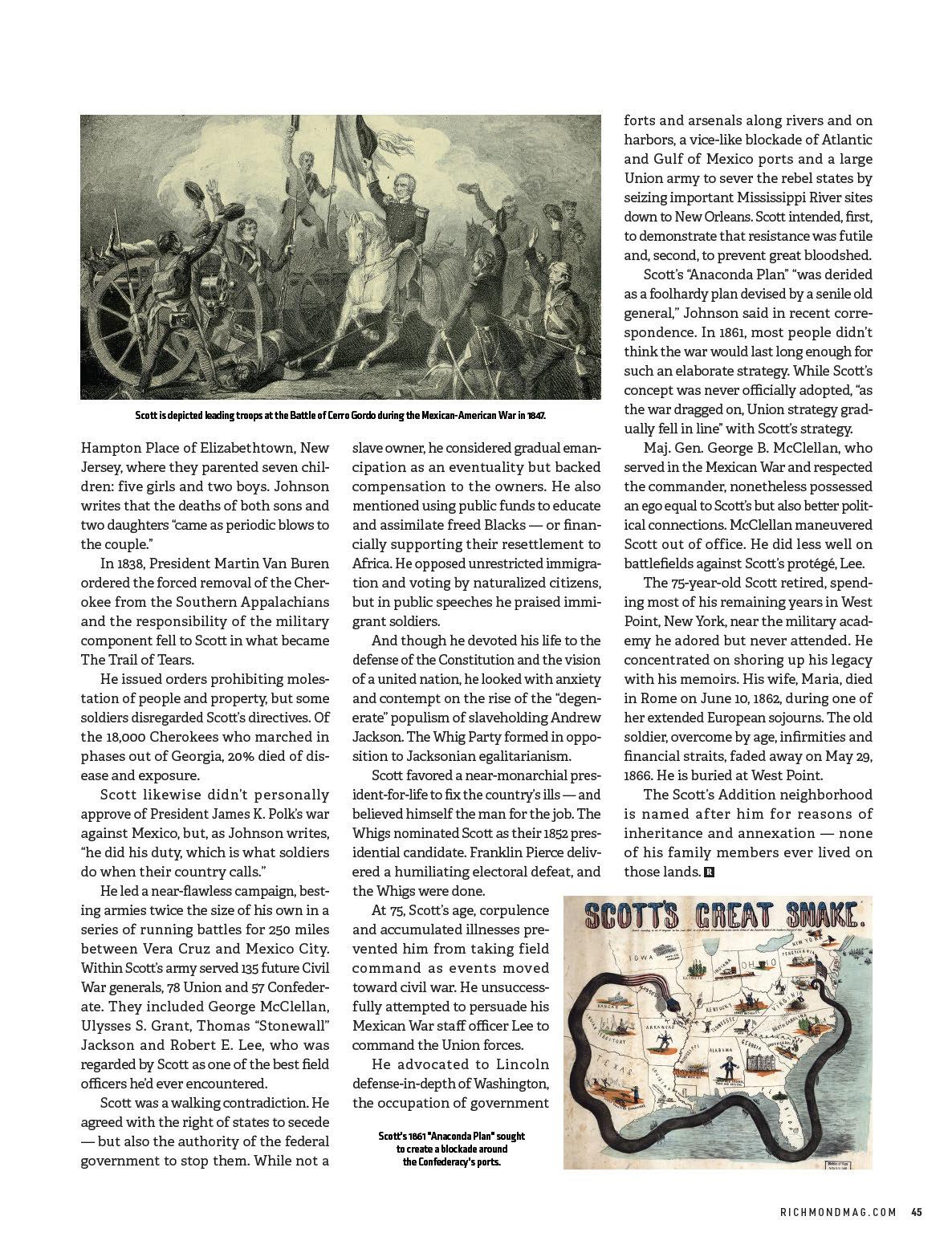


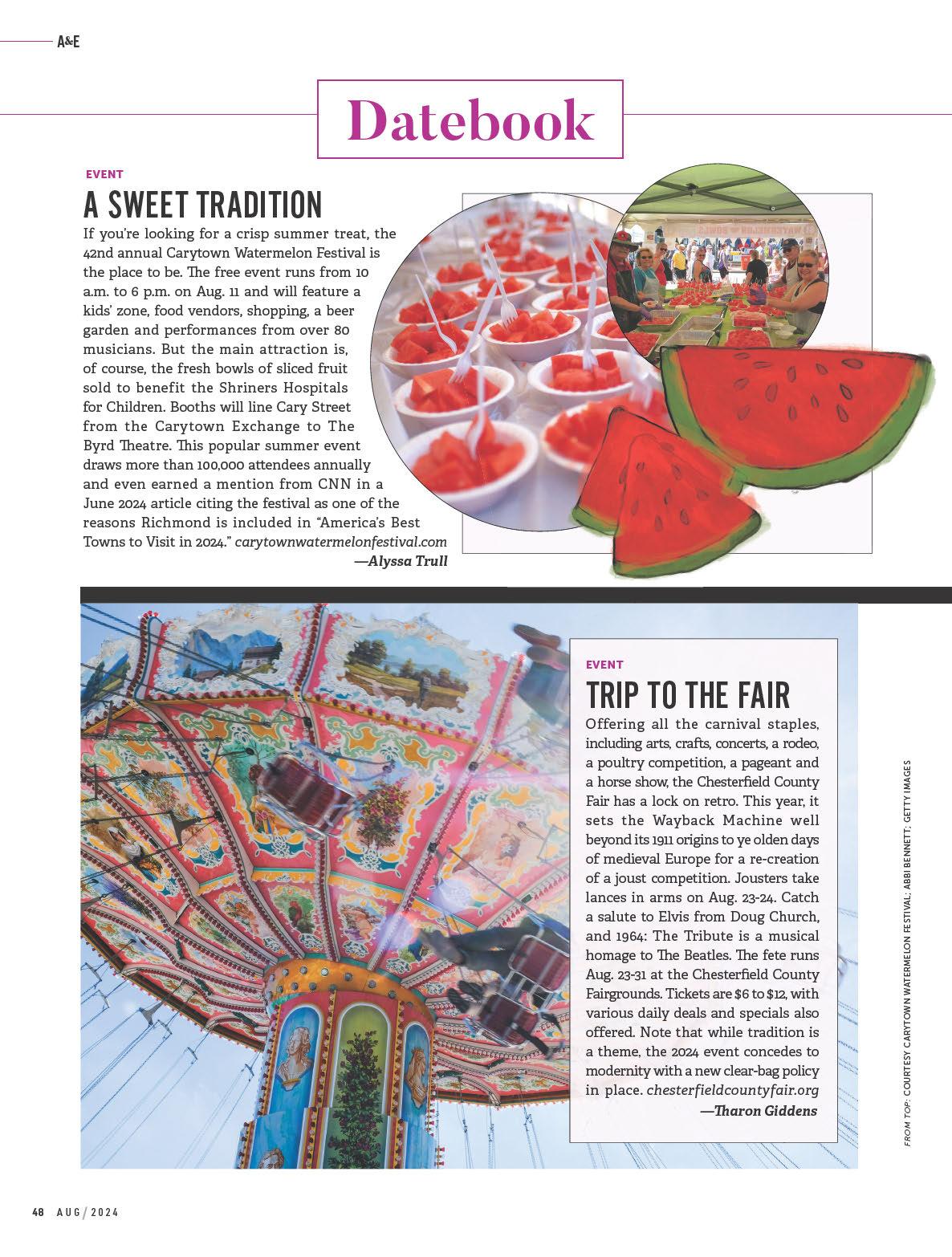

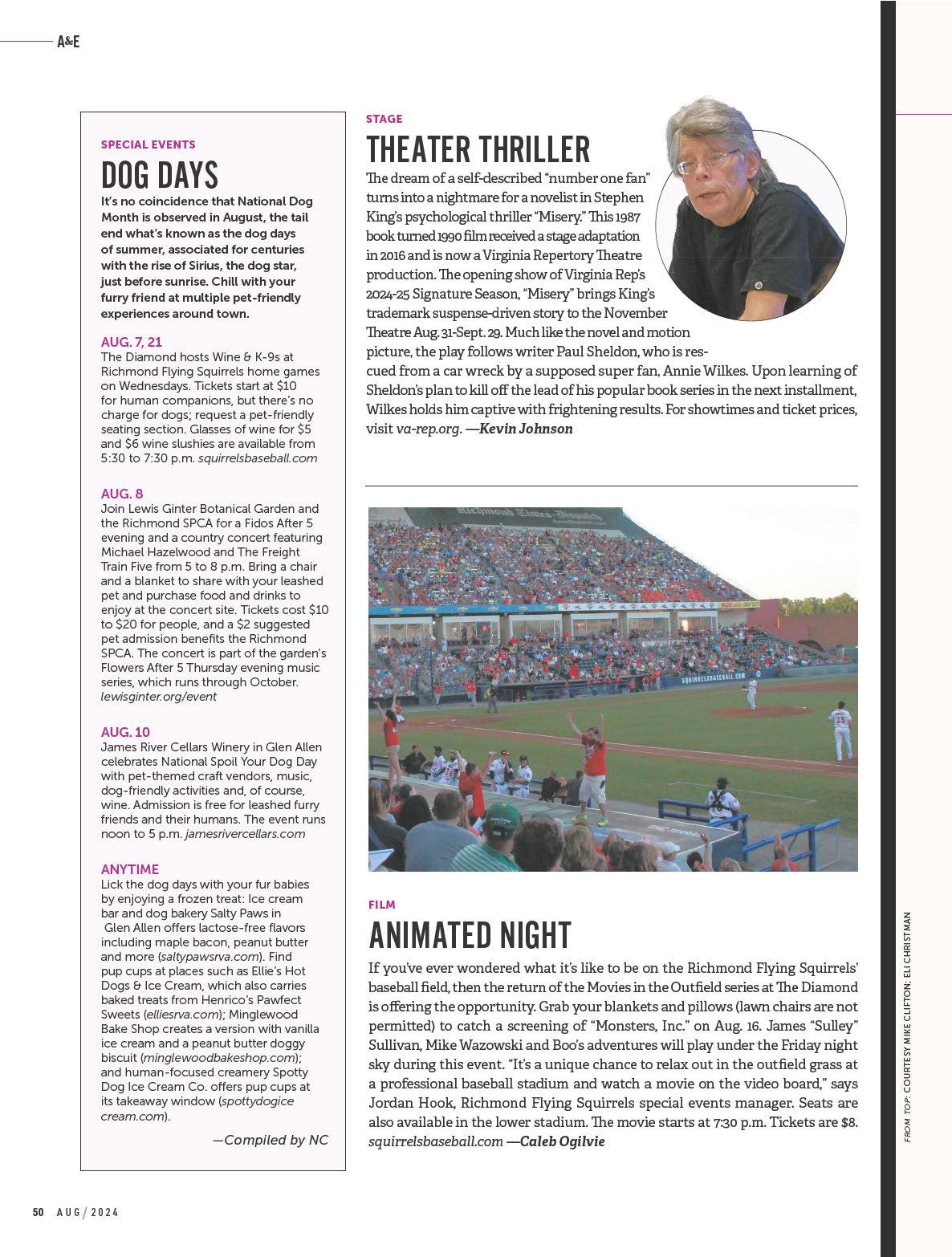
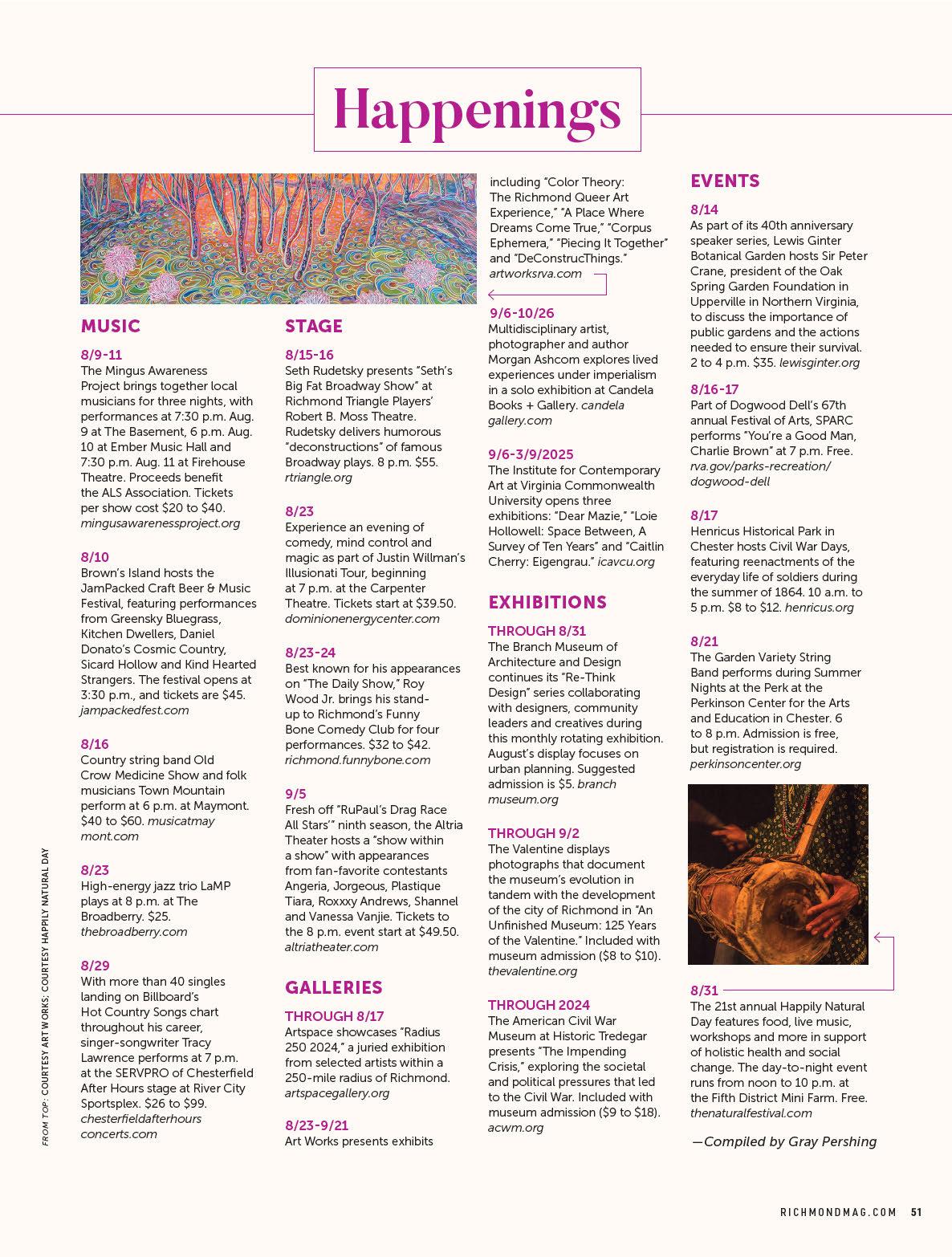
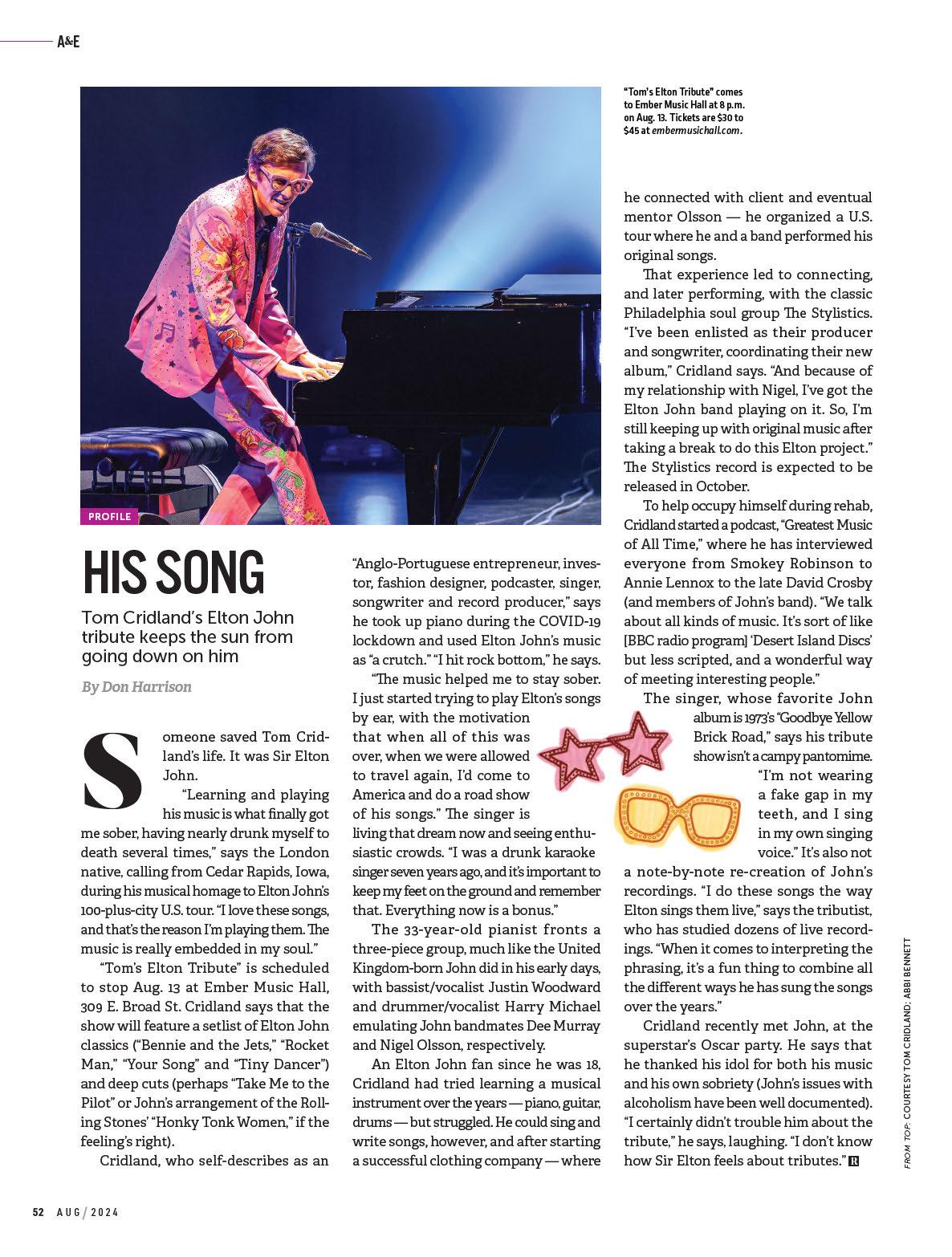

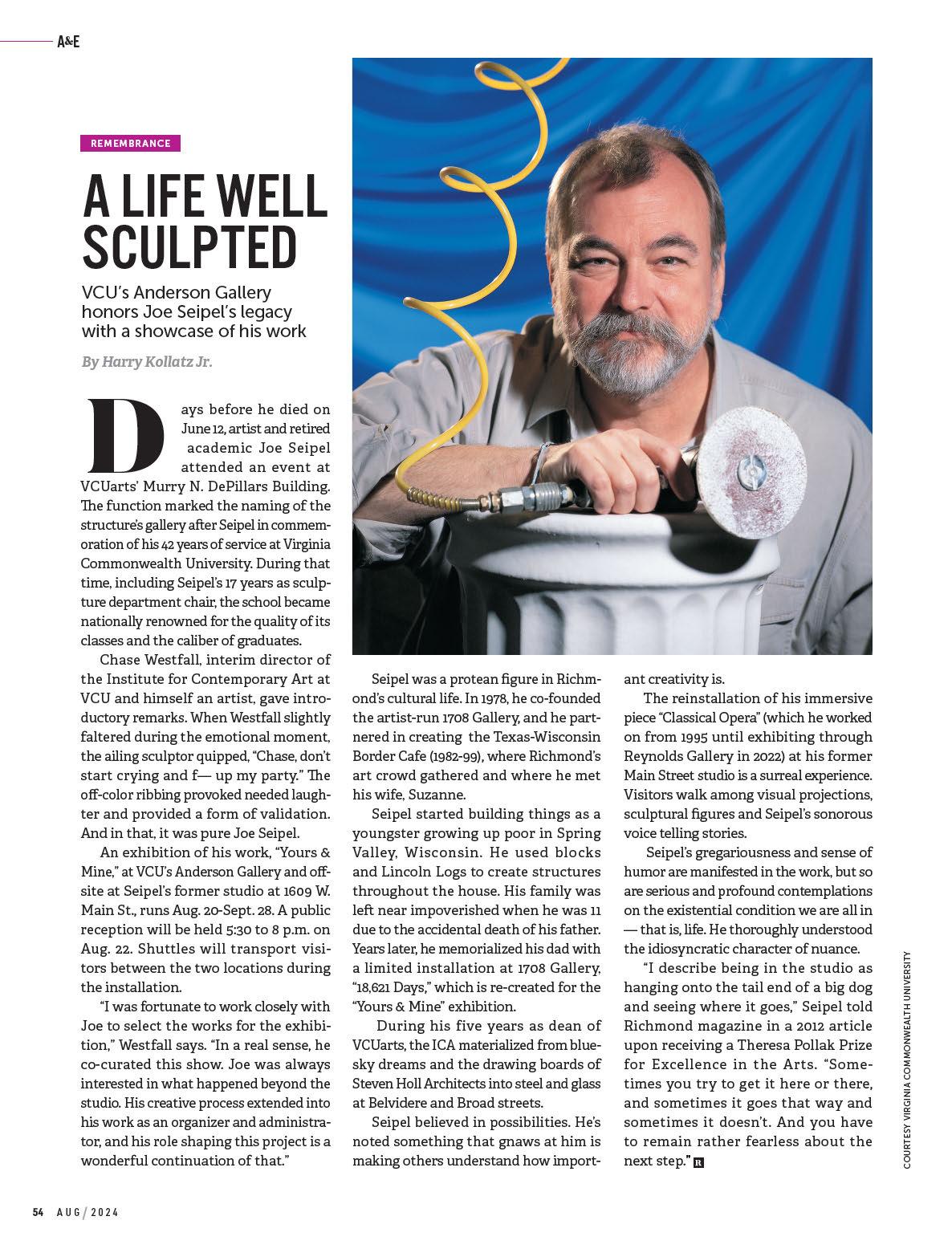







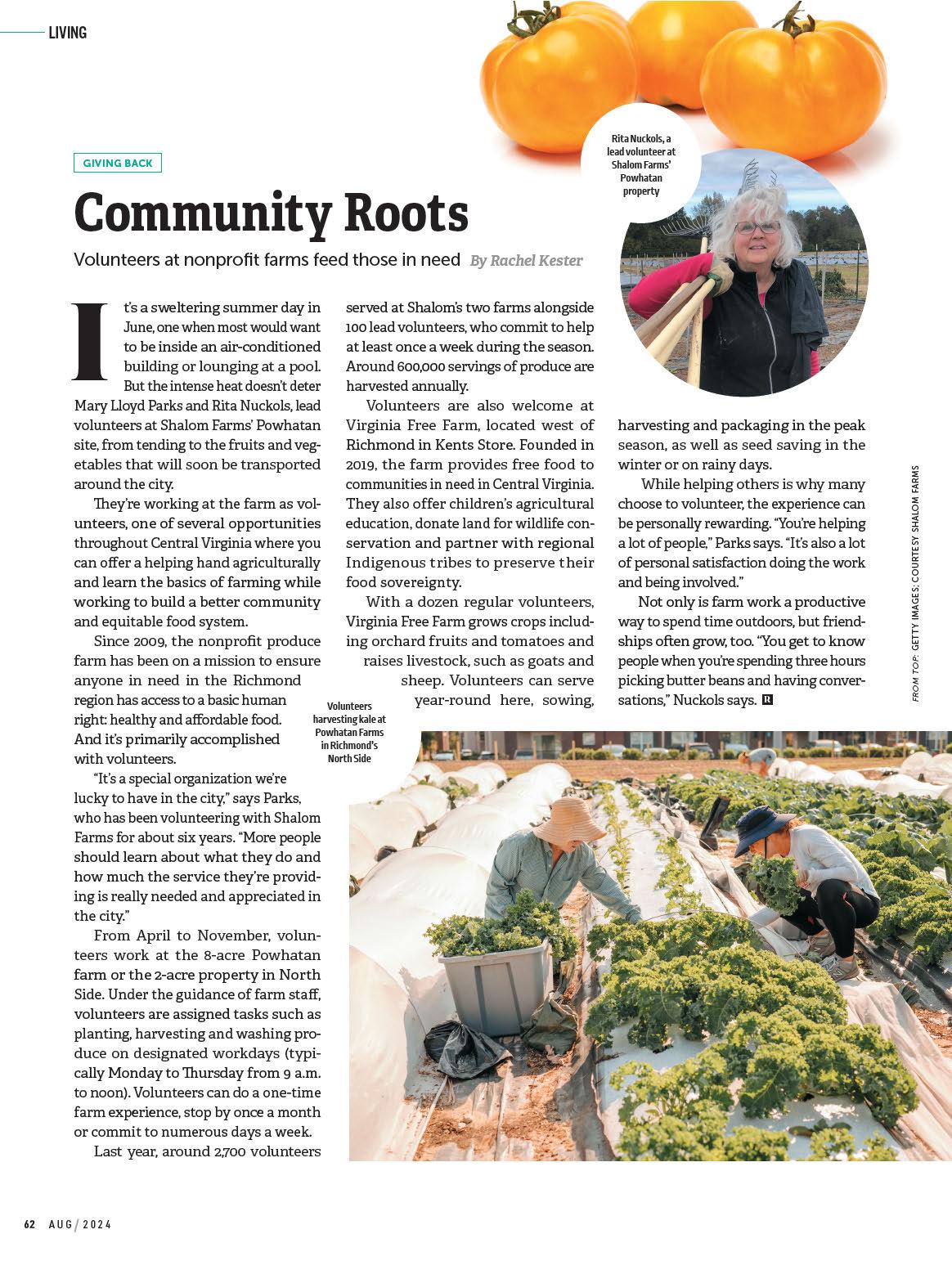

All-in-one primary care locations for government employees come to the area By
Haley Bartel
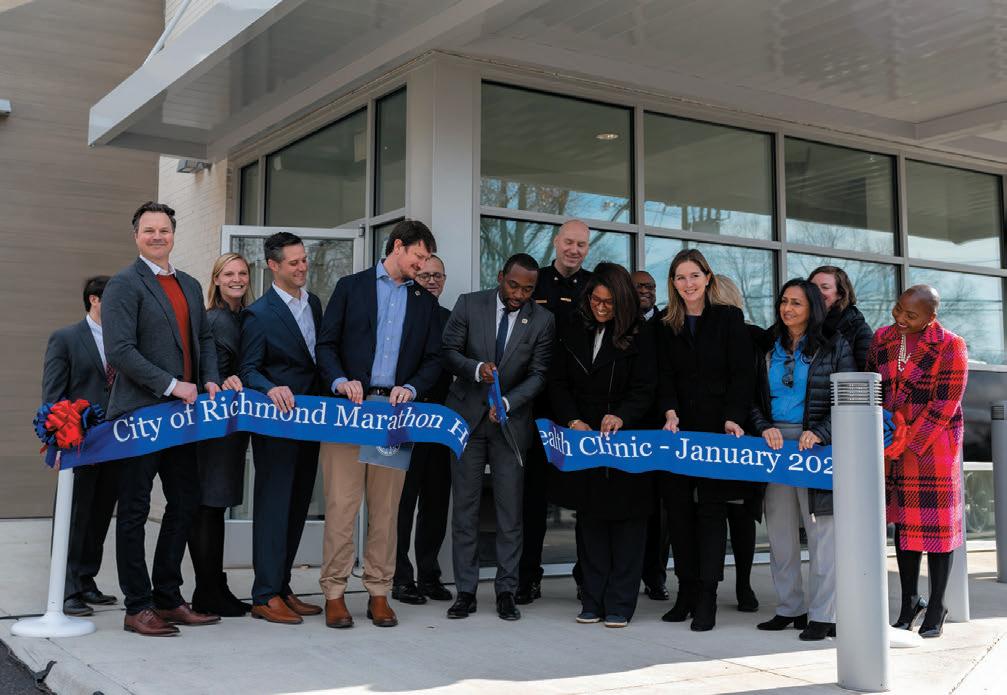
ocation, location, location,” isn’t just a mantra for the real estate world:
Medical practices are recognizing the importance of proximity to patients. A 2023 survey by real estate company Jones Lang Lasalle found that 86% of patients lived within 30 minutes of their primary care facility and roughly half lived less than 15 minutes away; 70% of surveyed respondents considered convenience of location very or extremely important.
Employer-provided health care network Marathon Health is acting on that data with its government employeeexclusive care program, which includes contracts with the city of Richmond and Hanover County government and schools. By building facilities near their patients’ workplaces and bundling ser-
vices under one roof, Marathon aims to improve accessibility and reduce cost, according to Greg Howe, vice president of client success.
Earlier in the year, Marathon opened two locations in Richmond and one in Hanover County near Ashland. Over 3,300 Richmond city employees and 4,000 Hanover County employees, including firefighters, librarians and government employees, as well as their spouses and dependents, now have access to the network’s wide array of medical services, which include primary care, behavioral health counseling, health coaching and urgent care visits. Marathon also o ers biometrics testing, with cholesterol, glucose and blood pressure all checked during one visit.
Primary care visits for employees and their families are free or o ered at low
cost through their health plans, Howe says. “All preventive services are o ered at no cost. Fees for sick care are dependent on the type of health plan the member has enrolled in. e fee typically ranges from $0 to $25.”
e five-year contract with Hanover County comes in at $2.6 million annually, or $55 per employee per month, from the county’s Self-insurance Fund. The city of Richmond did not respond to questions about its costs by press time.
Michelle Hungate, a nurse practitioner at the Hanover County location, which opened in February, has seen positive e ects in her patients. “We’ve seen a lot of chronic disease management, folks wanting to transition over their medications that they take, whether it’s for high blood pressure, high cholesterol, diabetes, anxiety and depression,” she explains.
Coming from a private practice, Hungate has been impressed with the services she and her colleagues can provide to patients. Mental health counseling in particular has been an asset to patients.
“We would see patients who were on the waitlist for a counselor for six months when they needed it ASAP,” Hungate says. Being able to reach those patients more quickly is “something that’s very valuable to us at Marathon Health.”
is a ention to mental health complements the city’s September 2023 decision to give Richmond’s first responders and City Hall employees two mental health days as paid time off. A study from Eagle Hill Consulting in April 2023 found that city employees experience mental health issues at an increased rate compared to private sector counterparts.
Marathon touts the convenience of its streamlined service model. According to Howe, patients can expect to have up to 90% of their medical needs met at these facilities.
Hungate appreciates Marathon’s comprehensive approach as much as patients do. “Having a health coach, having behavioral therapy, having physical therapy, all of that has just been really refreshing and made it easy to coordinate care for these patients,” she says. R

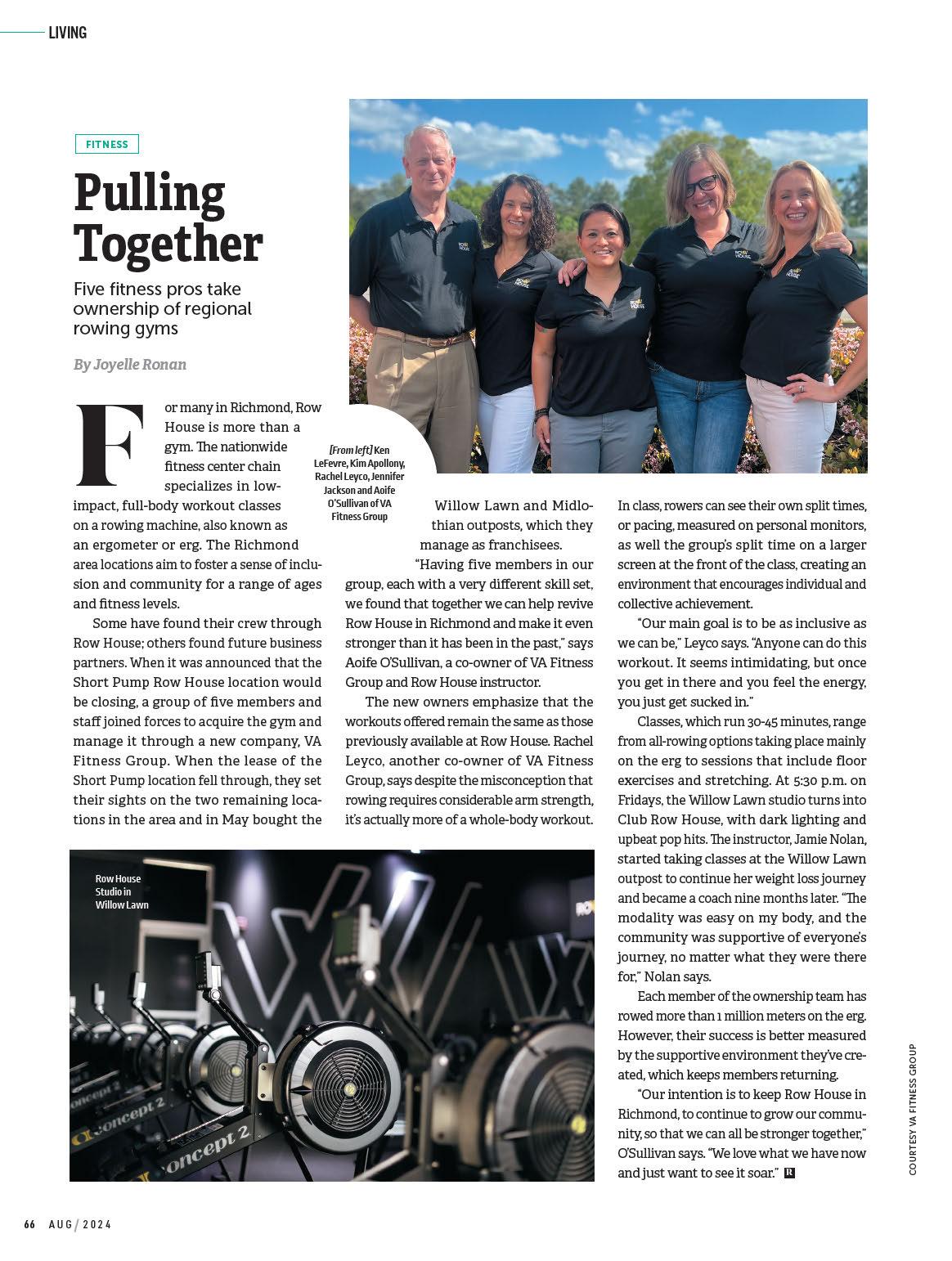

Asheville boasts big-city attractions while remaining true to its wild roots By Kevin Johnson
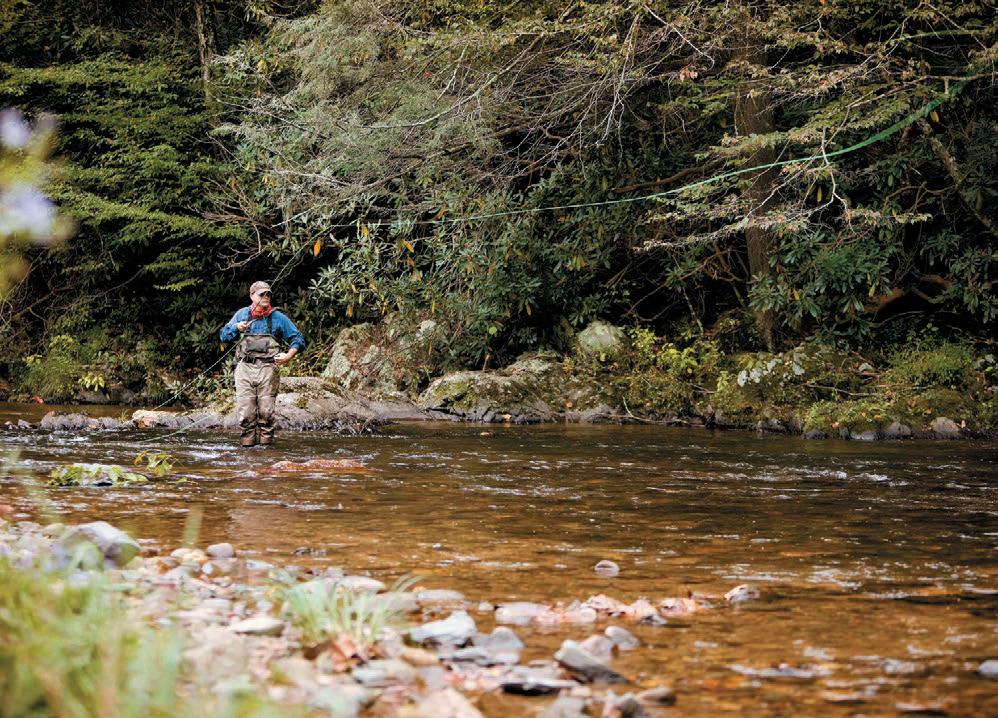
Mountain towns in the United States have attracted attention and new residents in recent years — as remote work proliferated and careers changed in 2020 and beyond, forested retreats became hot destinations for young professionals and retirees alike. Asheville, a small city in the foothills of western North Carolina just over five hours from Richmond by car, is delivering on the promises of those hybrid work-play hubs amid growth and change that aim to accommodate their increasing number of residents.
It only takes one visit to understand why the city is so popular. Its restaurants attract James Beard Awards and renowned chefs, the music scene produces top-selling singer-songwriters, and its position as a gateway to the Blue Ridge and Smoky mountains is as awe-inspiring as it is convenient. The community’s longstanding
commitment to laid-back enjoyment embraces travelers like a bear hug.
Asheville packs a lot in a narrow valley. Thanks to its reputation as a vacation town, finding a place to stay is no big feat. Downtown is home to industry newcomers including The Flat Iron Hotel, a 99-year-old skyscraper reimagined as a boutique hotel, which opened earlier this year. The city’s outer neighborhoods are not to be ignored; quaint bed-and-breakfasts fill West Asheville, and the Biltmore Village area is packed with hotels styled like the famous estate nearby.
More rural stays, including The Horse Shoe Farm, o er a closer look at the surrounding countryside. A collection of cottages, standalone homes and suites on a ranch bordering the Pisgah National Forest, the farm’s amenities include spa treatments in a converted stable and a restaurant whose seasonal menus focus on local produce.
The city’s reputation as an outdoors town is hard to miss; walk around the main drags and you’ll see swarms of people prepped for the nearby trailheads and vehicles hauling some combination of kayaks and mountain bikes. To get a sense of what draws so many to move here, get out of the city and into the woods.
An abundance of hiking destinations surrounds Asheville, including nearby Mount Mitchell State Park and the aforementioned Pisgah National Forest, along with the Cherokee National Forest and Great Smoky Mountains National Park a few hours away. But one of the best ways to combine outdoors time with the city is getting on the French Broad River. The river runs west of downtown and flows toward Great Smoky Mountains National Park. Guided trips for kayaking, stand-up paddleboarding, tubing and fly-fishing are available from groups like French Broad Outfitters and Asheville Fly Fishing Co.
The Blue Ridge Parkway might be the best low-intensity way to climb some of the area’s many peaks while seeing incredible sights. Follow the road northwest from town for overlooks galore, where valleys stretch for miles







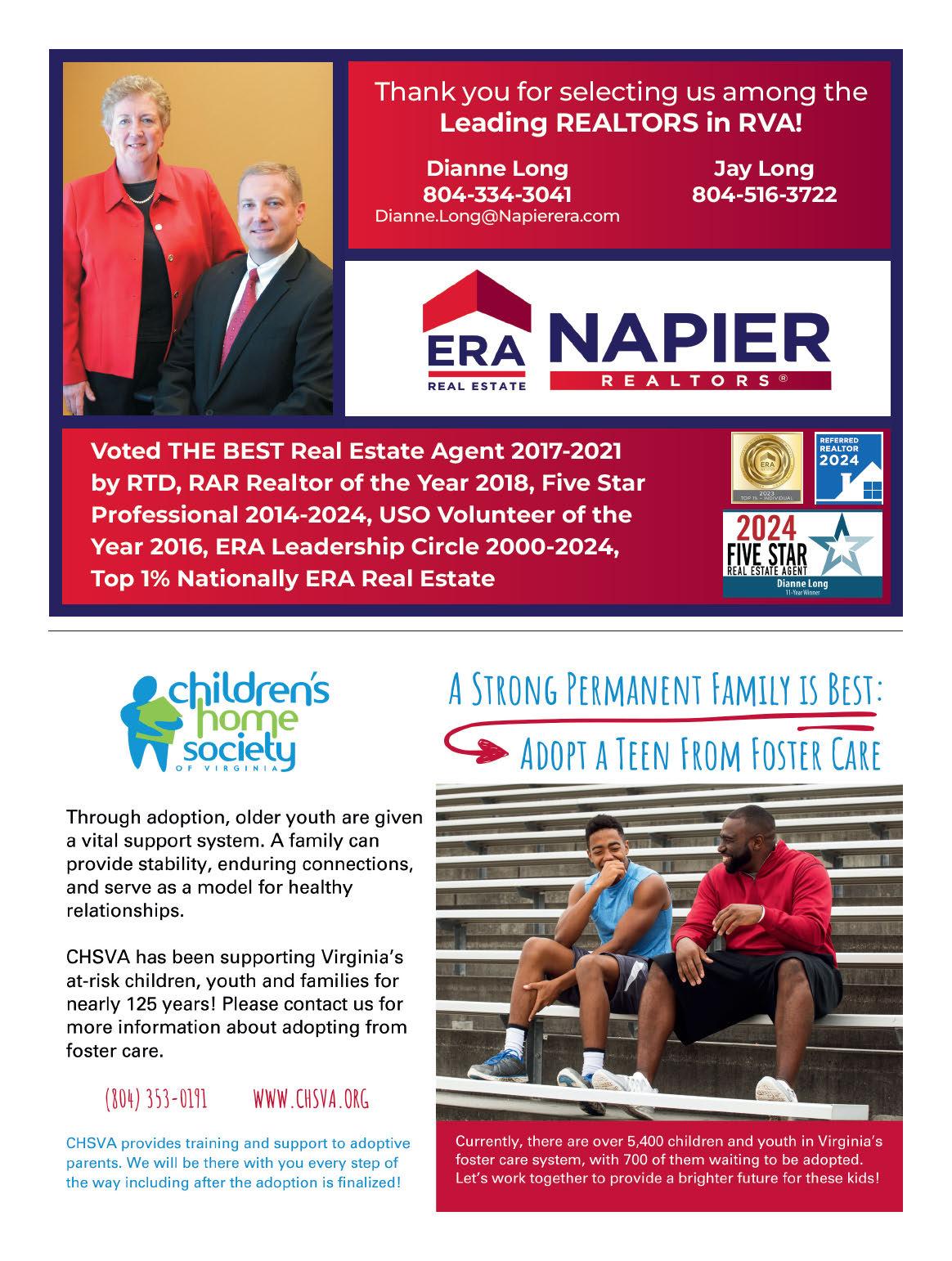




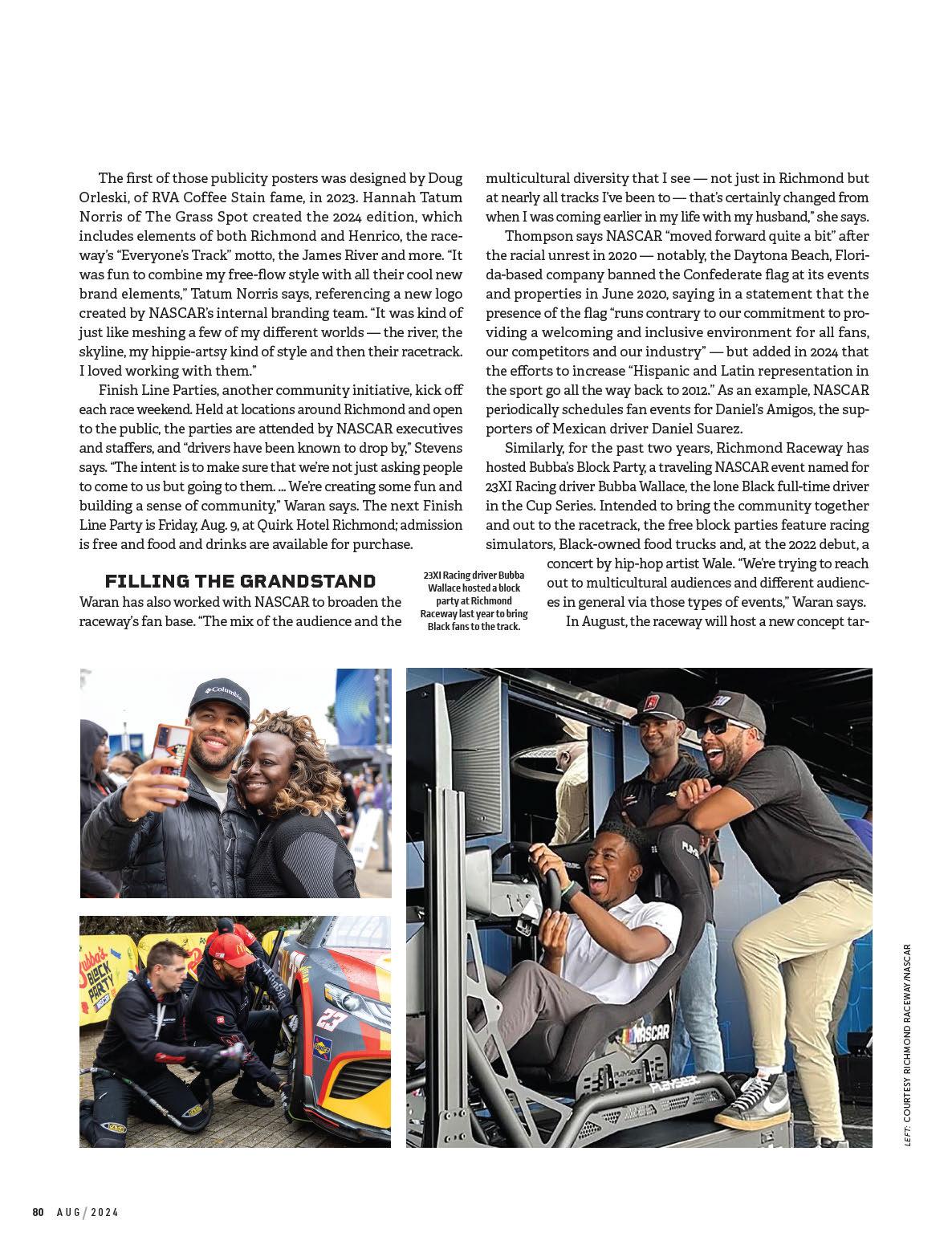
geting young Black professionals dubbed Speed SZN. The invitation-only concept premiered earlier this year at the Atlanta Motor Speedway. “It gets people close to the action, so that’ll include garage tours, that’ll include meet-and-greets and those sorts of things, and obviously the chance to take in a race,” Thompson says.
Racing has historically been a male-dominated sport, but NASCAR has been working to change that image, too. Four women drivers — Hailie Deegan, Natalie Decker, Toni Breidinger and Jennifer Jo Cobb — have made starts in 2024, and Waran is meeting more female fans, as well. “It’s nice to see a lot more women, and especially young girls, interested in the sport, the drivers and asking how they can become involved,” she says. “I’ve seen a lot of momentum, a lot of passion and a lot of excitement around the sport [because] anyone can compete, it’s not specific to any gender.”
“It’s a really cool experience,” Cianelli says of race weekends. “It’s definitely worth going in person, just the feelings that you get from the smells and the sounds and just watching the cars go fast. You can feel it in your body when [the cars are] taking off, when they’re going around the track. It’s a very visceral experience you don’t really get from watching it on TV. That, for me, was what really made it click.”
Young women have also asked Waran about off-track pursuits at the company such as engineering, leadership, management and digital media — “all the things that we do really well at NASCAR, they want to be a part of it.”
The raceway engages with professional women through its Women Who Drive Richmond initiative, a partnership with the Richmond Times-Dispatch. Waran notes that the program has the additional benefit of bringing women to the track during the offseason. “When people feel comfortable coming to our track throughout the year, it just becomes habit, and they feel they want to go back,” she says. It’s a theme she returns to often,
There’s much more to a day at the track than just the race. Both inside the gates and out in the Fan Zone, there’s plenty to do during NASCAR’s two visits to Richmond Raceway every year.
The experience begins before you even step foot on the grounds. Vendors set up along Laburnum Avenue to hawk memorabilia, collectibles and more to fans, such as obscure diecast models and pieces of sheet metal from 30-year-old racecars.
Inside the gates, Richmond Raceway offers five RV areas and one tent campground that open the Tuesday before race weekend. Visiting fans, who come in from all 50 states as well as Canada, set up pop-up tents, tables, chairs, bars and even swimming pools, decorating with flags for their favorite drivers.
They’re there to socialize with friends and participate in events such as a welcome party, a Fan Zone festival and a campground concert. Over the weekend, local tailgaters fill the massive parking lot with additional grills and picnics. Drivers occasionally tour this impromptu fan village, and you’re welcome to walk through and say hello, too.
“People get really passionate about it,” says fan Mariah Cianelli. “There’s so many different people racing and so many different fans of those [drivers]. It creates a unique environment.”
The Fan Zone, or midway, stretches from the parking lot to the track gates and is free to attend. It’s a lively conglomeration of driver appearances, sponsorassociated tables and tents, fan activities, merchandise trailers and special displays from NASCAR and others — in 2022, the United States Air Force brought in an actual fighter jet.
“They had a few appearances, and it was cool to see the actual drivers signing stuff and talking to fans,” Cianelli says. “You can go to different booths and win
prizes and get merch and all that, so leading up to the race, that’s all really fun.”
With eight concession booths and over a dozen food trucks on the property, Richmond Raceway offers plenty to eat. Options include traditional fair like popcorn, nachos, burgers and chicken fingers, but also fish ‘n‘ chips and barbecue. Local food trucks and vendors, including La Milpa, Cobra Cabana and Jiji Frozen Custard, debuted at the March race; vendors for the August event had yet to be announced by press time.
An Infield FanGrounds Pass ($60-$70 per day) allows you to walk through a tunnel under the track and wander among the haulers, visit the garages while the teams are working on the cars and see them rolled out to Pit Road, take photos at Victory Lane and cheer on the drivers up close as they’re introduced. Fans can occasionally pick up collectible postcards or get autographs or selfies with drivers.
The aptly named Chaos Corner sits at Turn 4, where car contact and collisions are most likely to happen. The general admission section, open to fans ages 21 and over during Cup Series races, offers tiered standing space and drink rails ($25). “It’s not that crazy,” Cianelli reports, although the vibe is “very different” from the grandstand, where fans are seated.
For fans looking to go all out, the raceway has two premium club experiences. The Torque Club and the Victory Lane Club offer premier seats, drink and dining packages, and perks like a pace car ride; tickets start at $800 and $1,200, respectively.
“You can just watch [a race] and have a good time, or you can know all the points systems and the rankings and who’s in what position” Cianelli says. “You can have your radio and your headphones on. There’s such a variety of what you can experience when you go.”
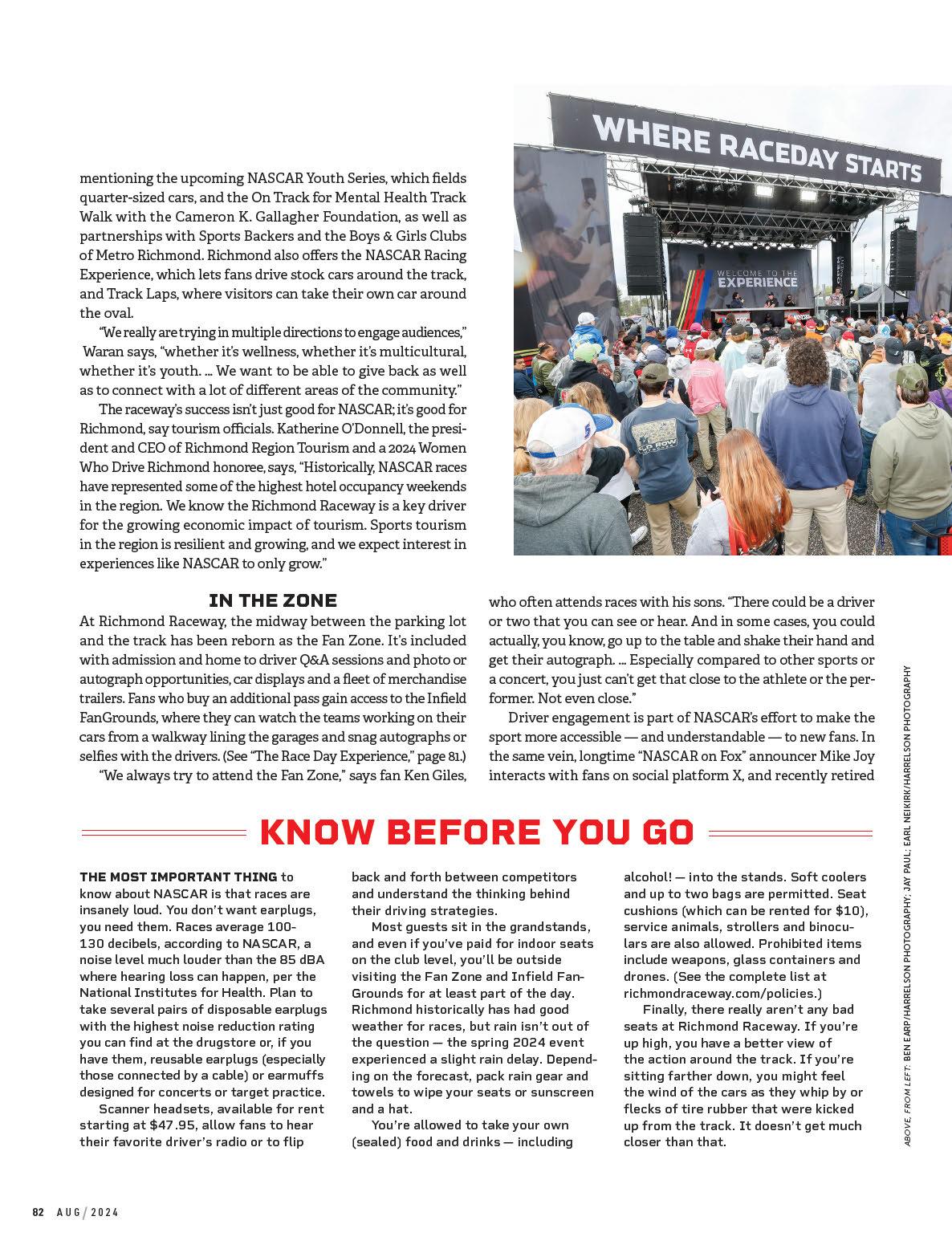
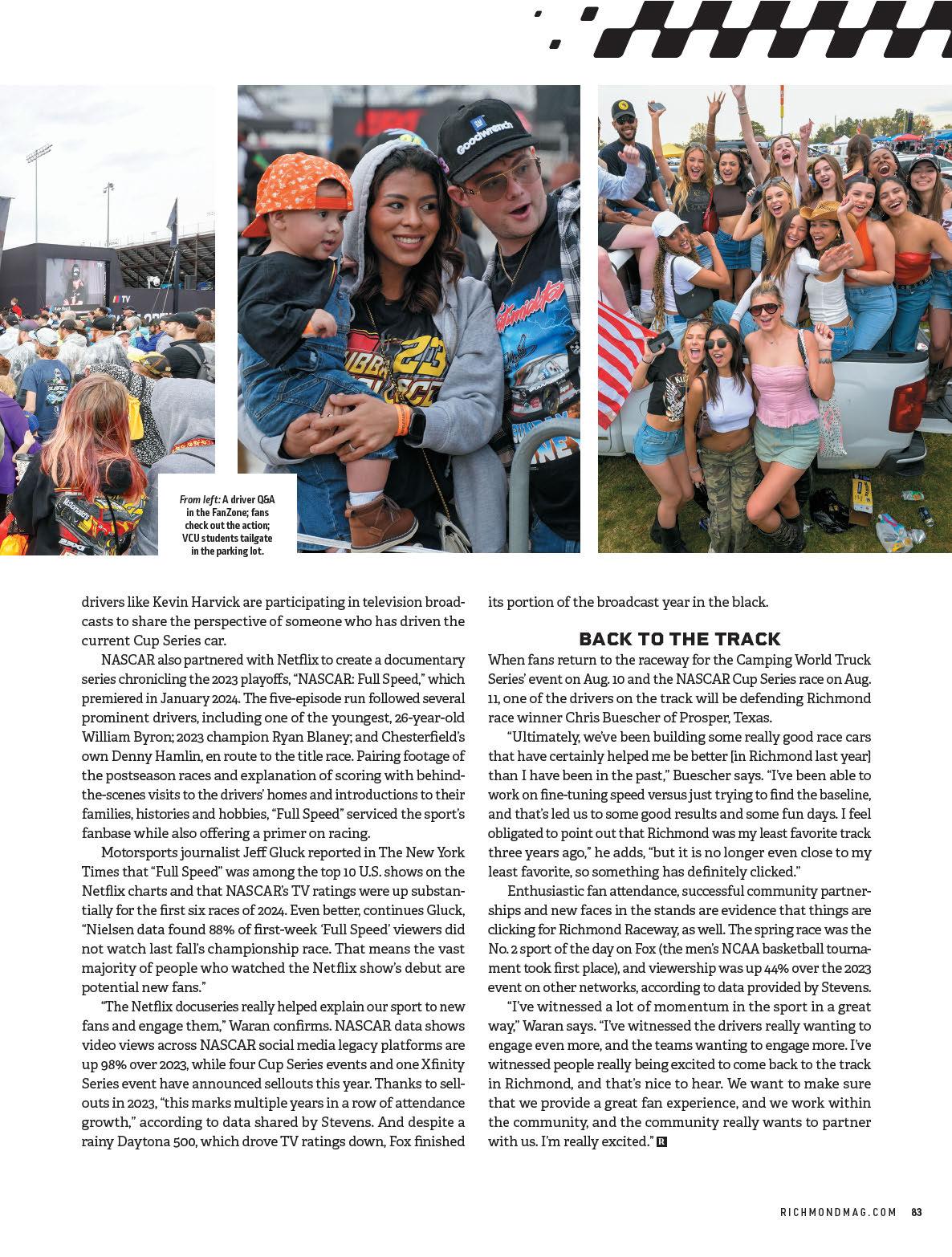

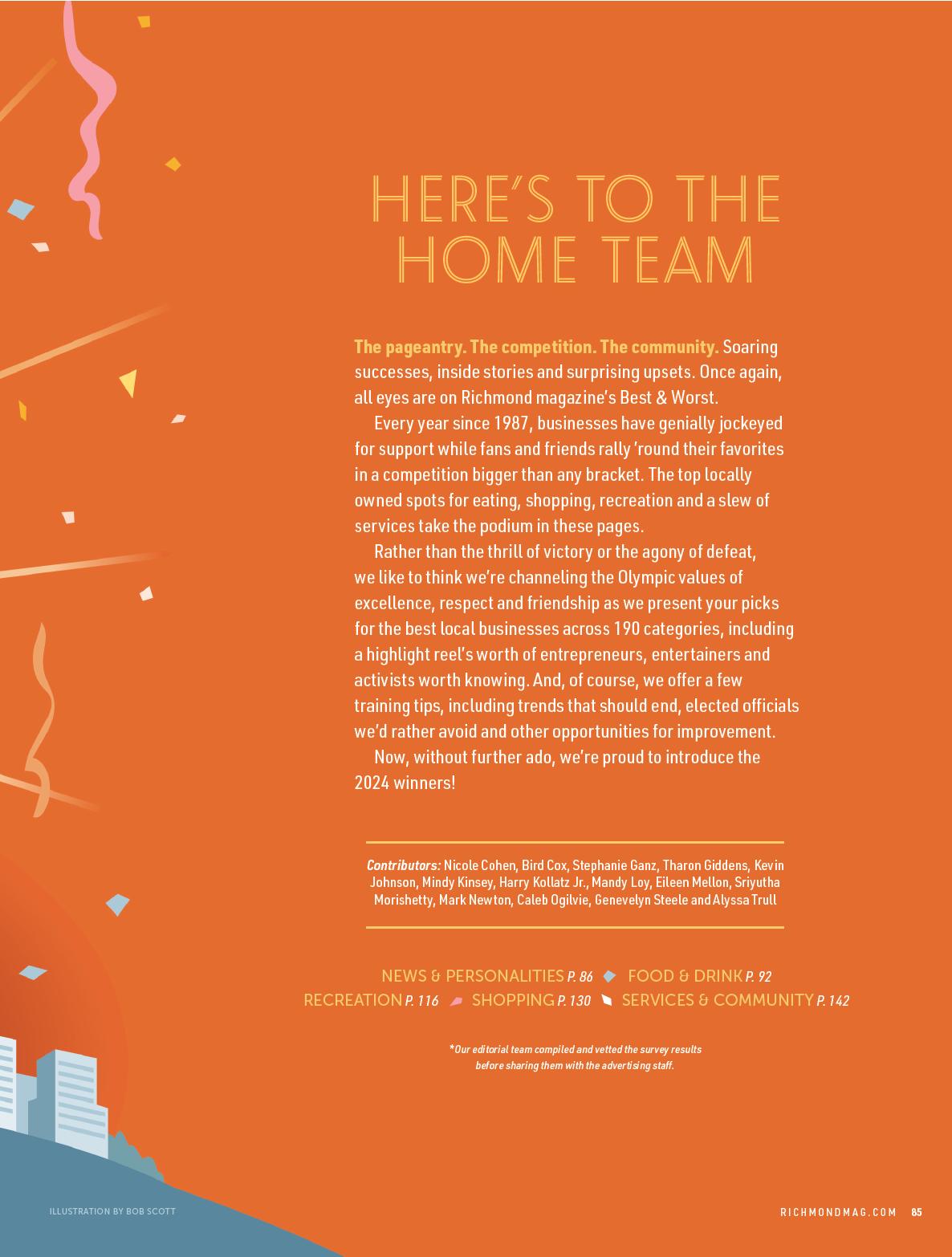

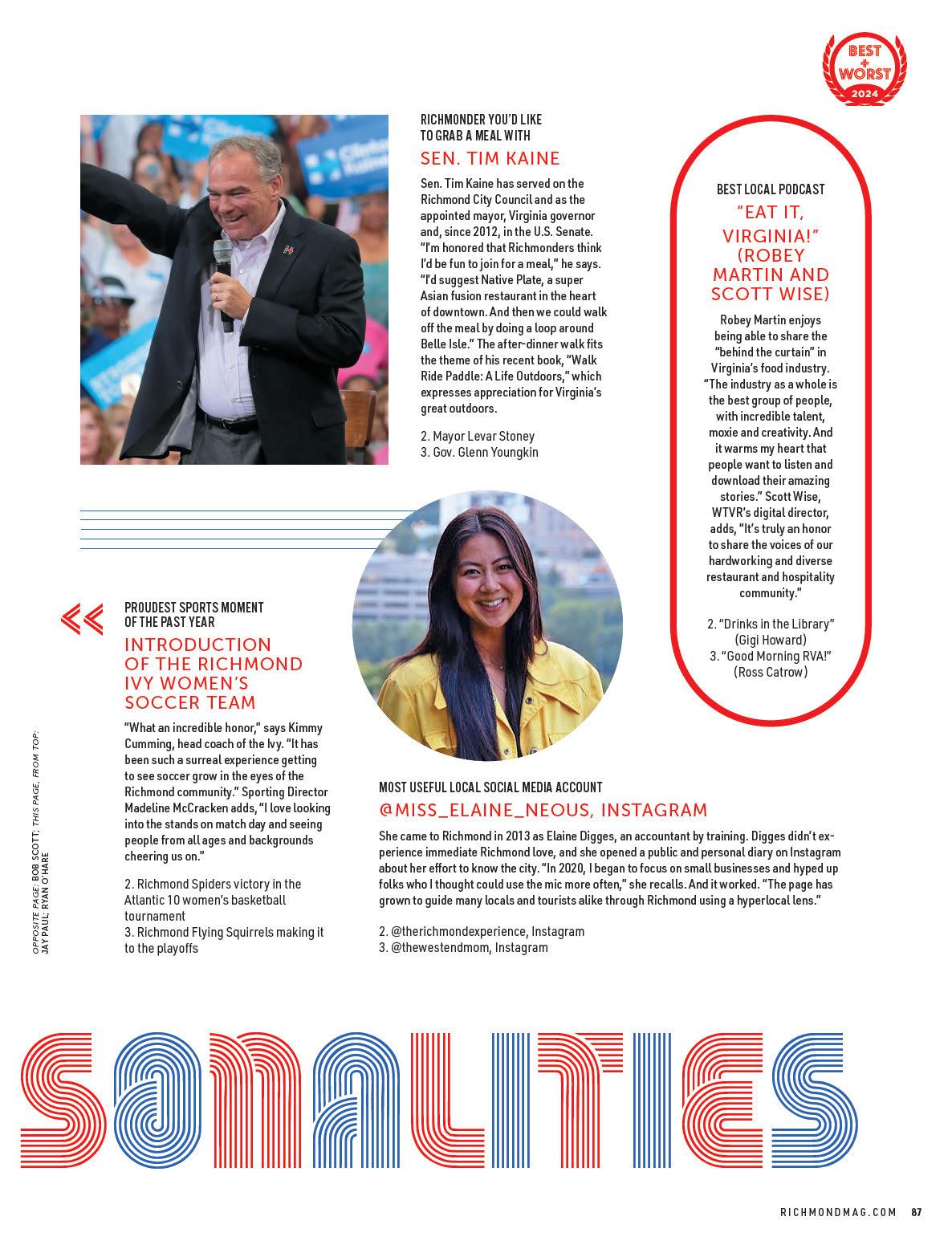
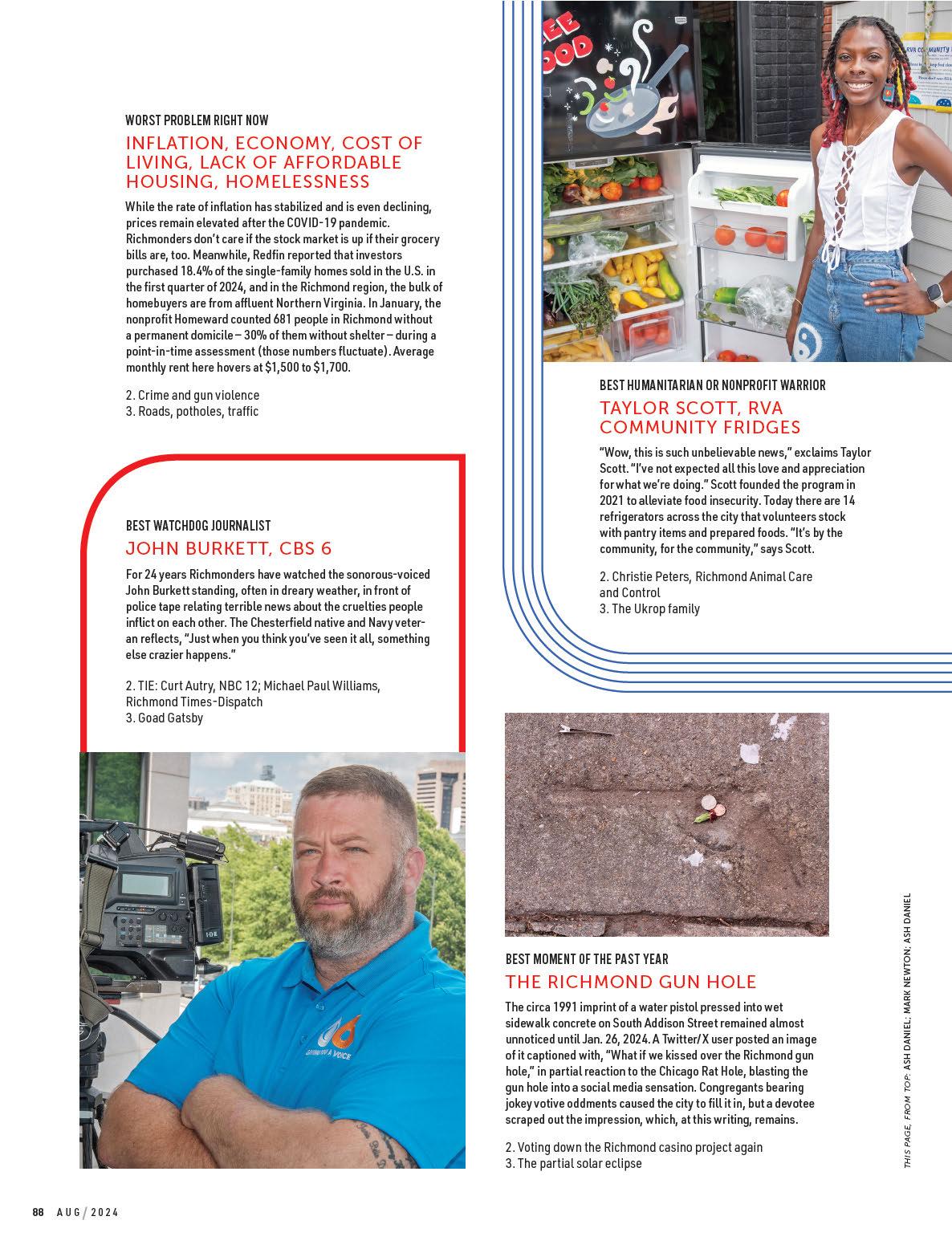


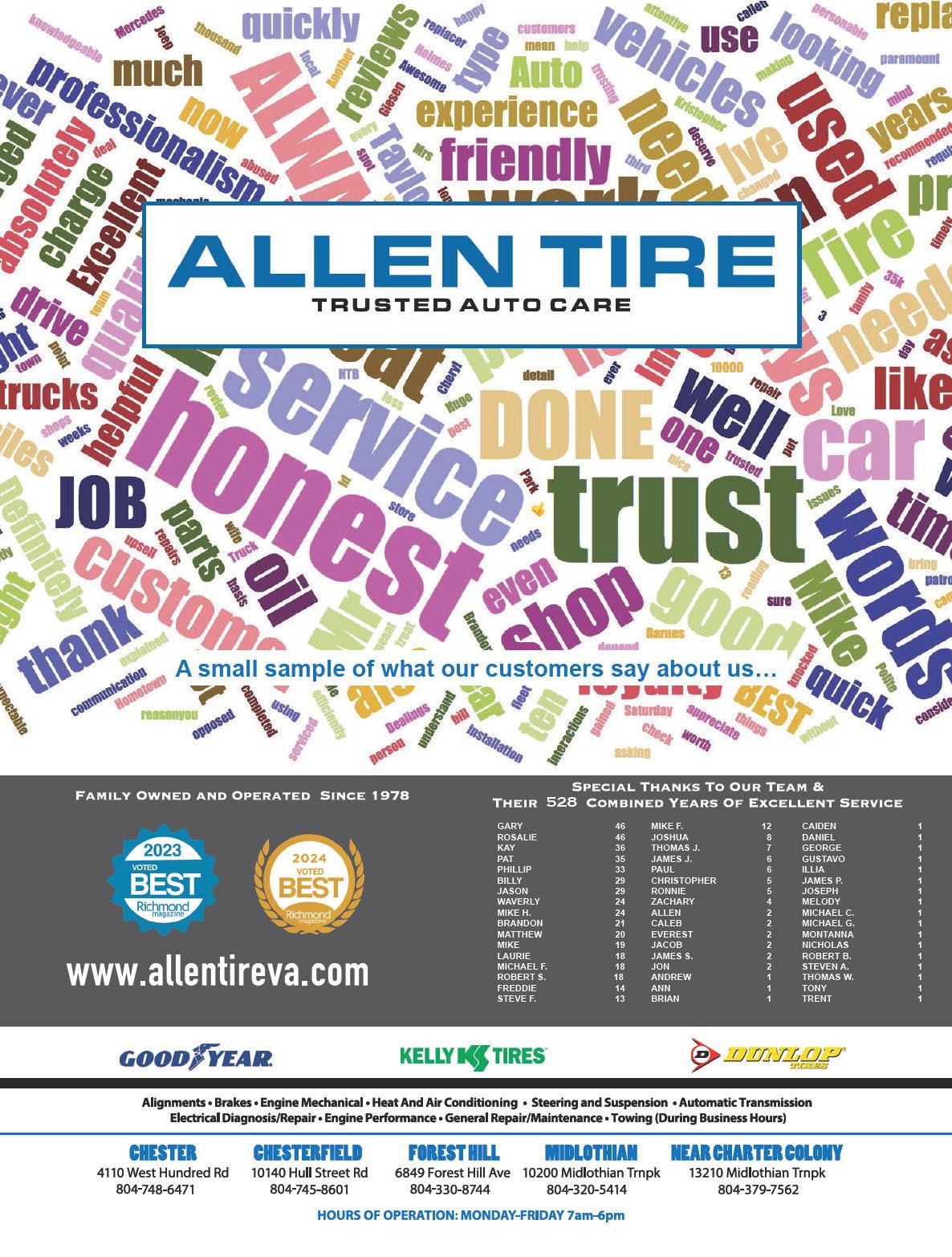

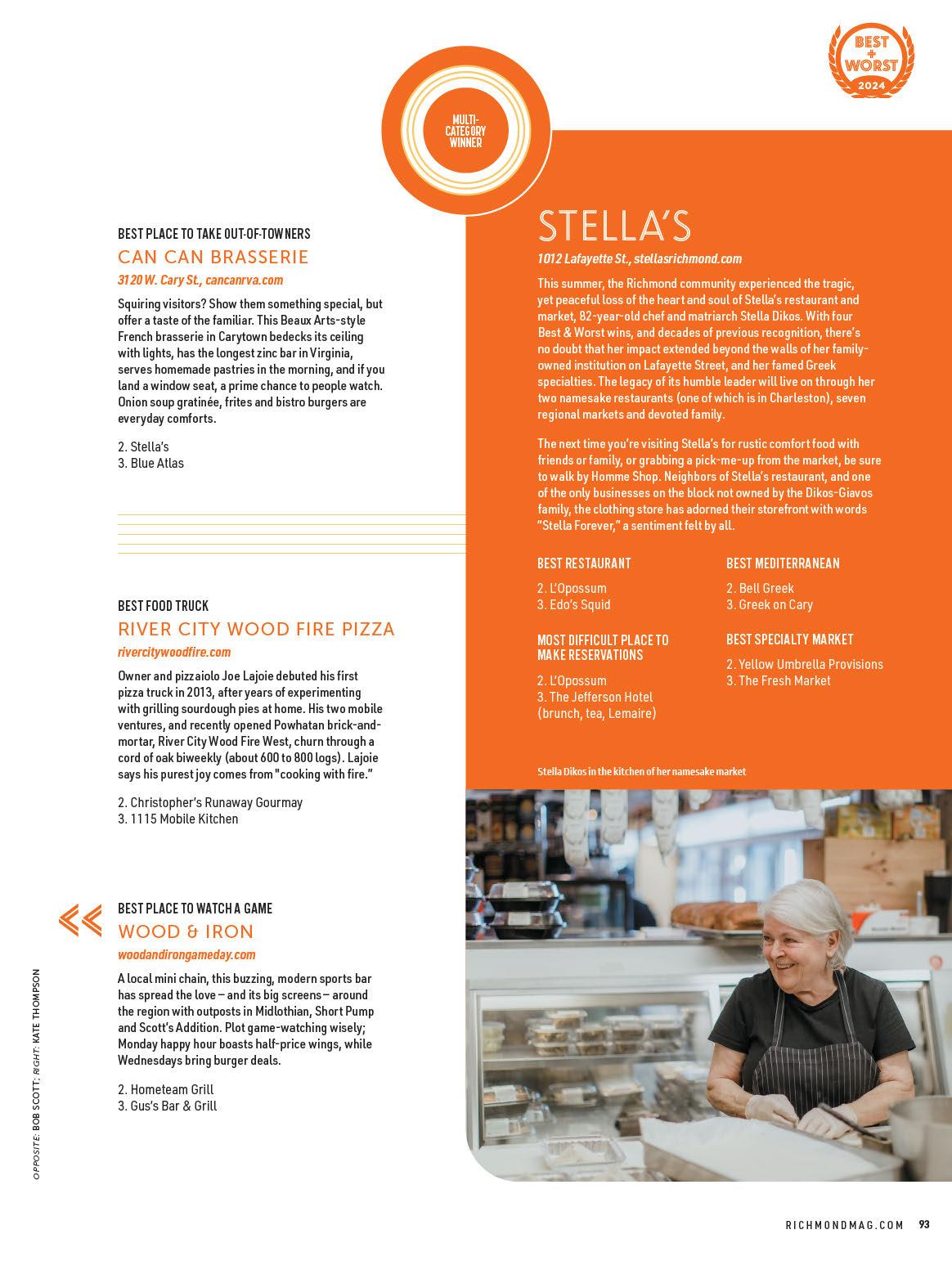
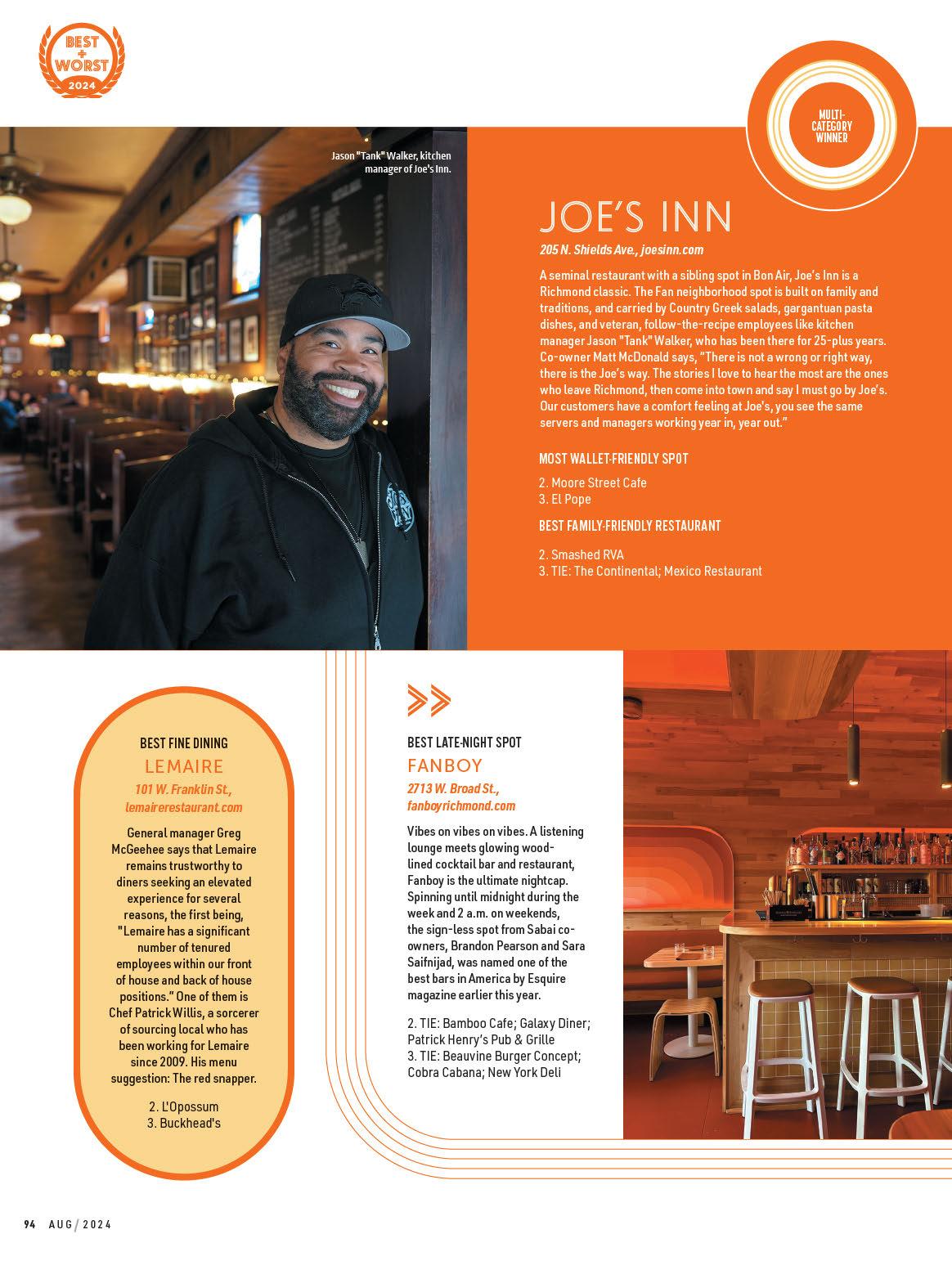

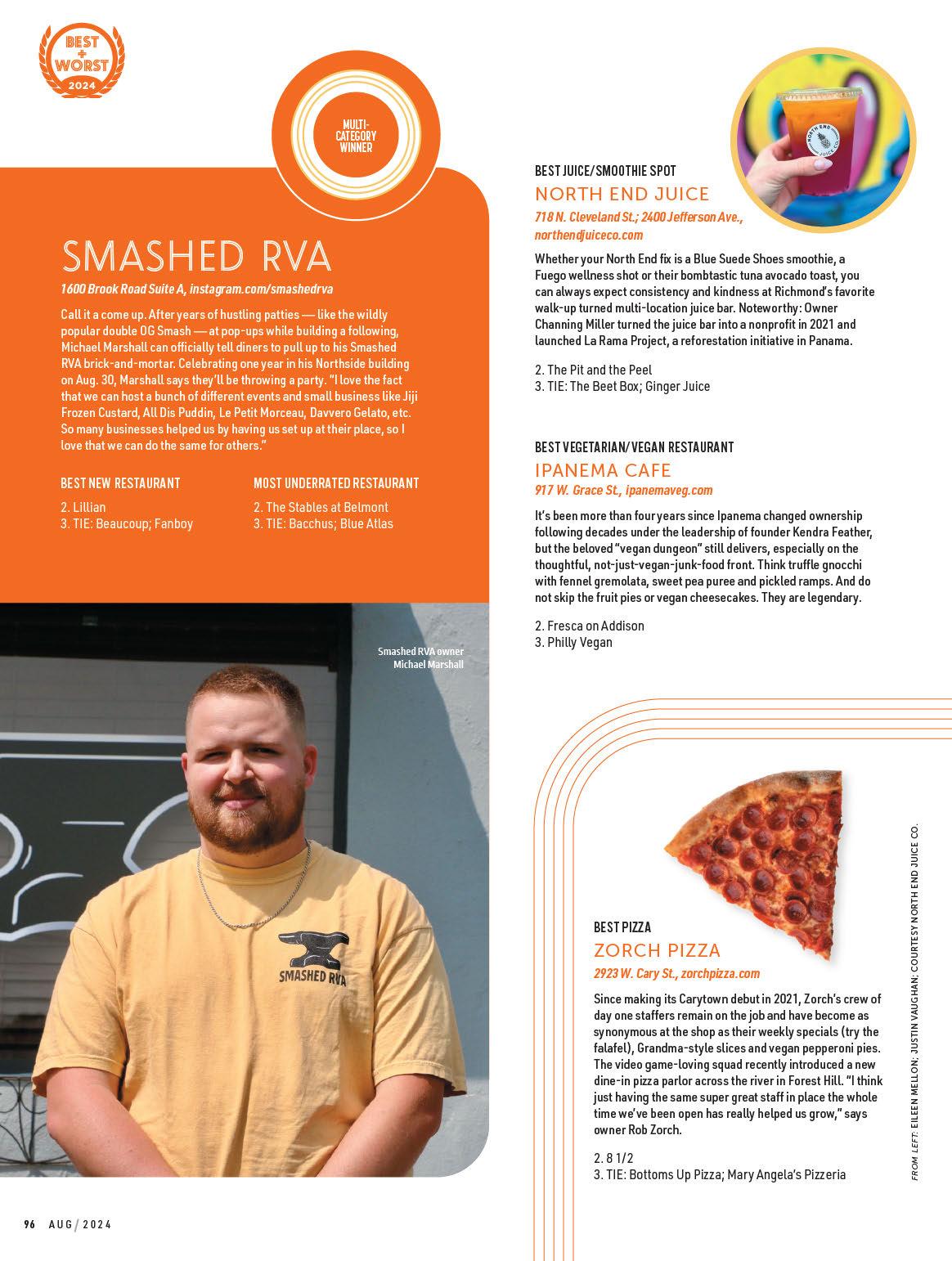

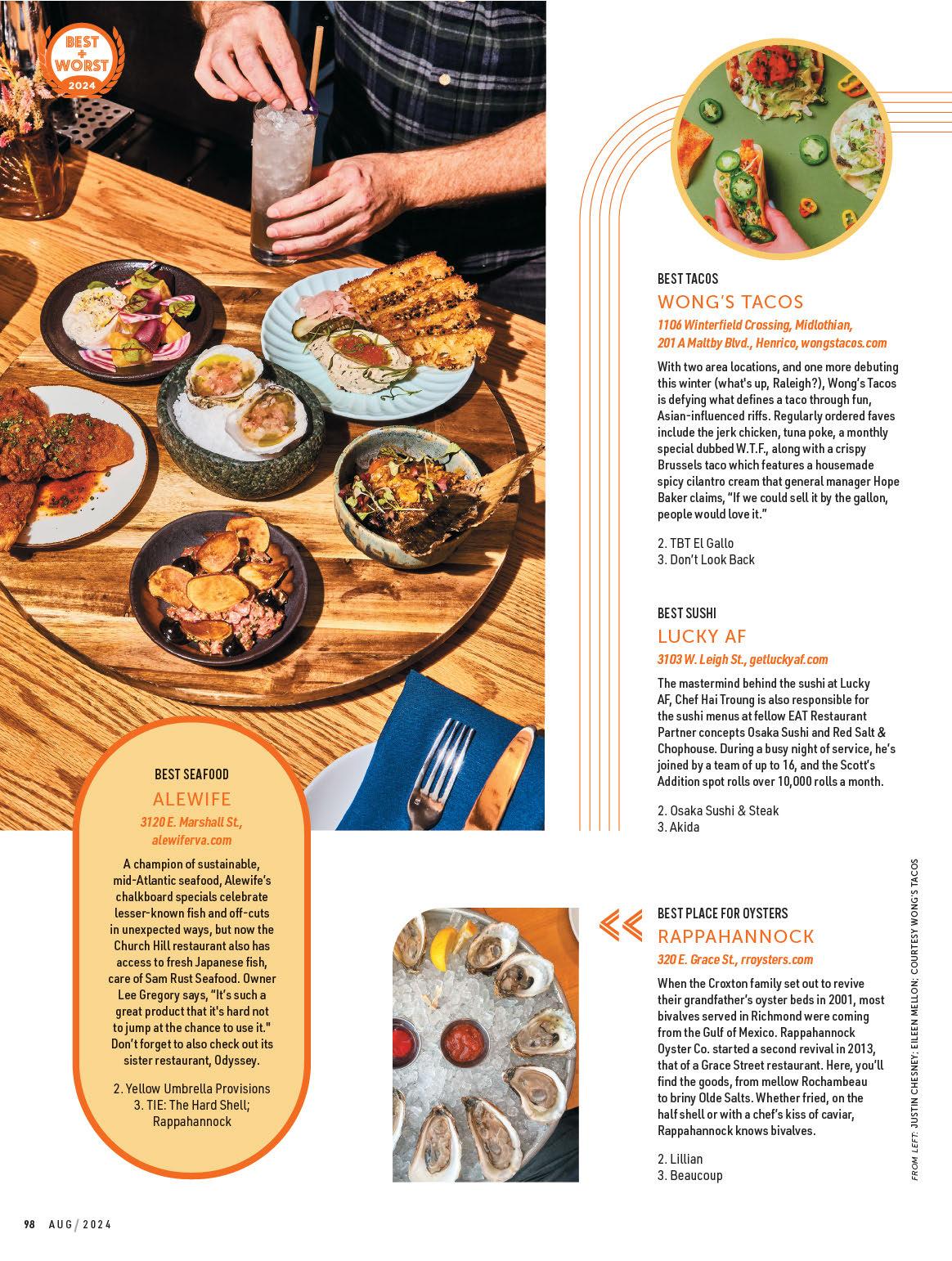

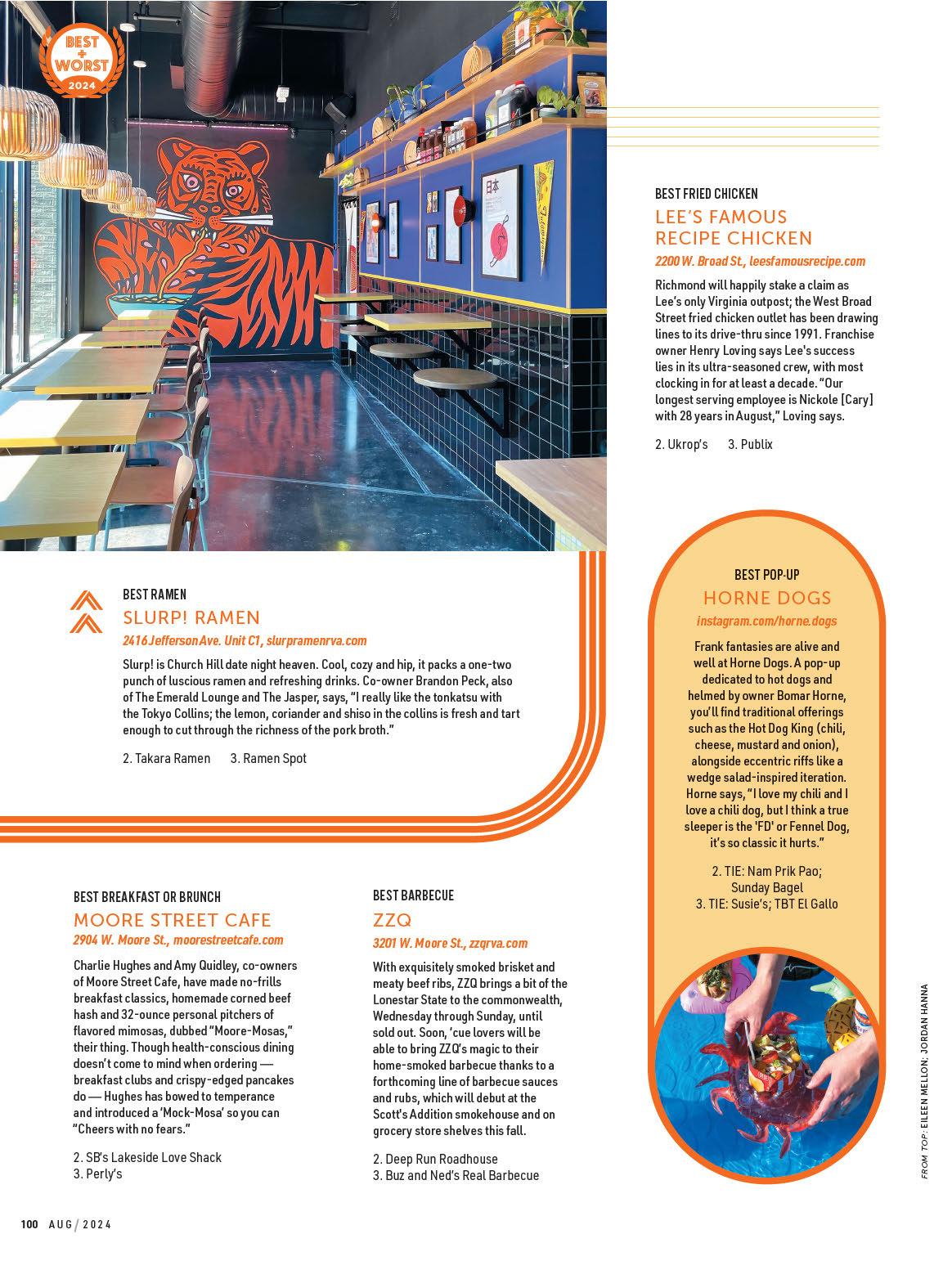

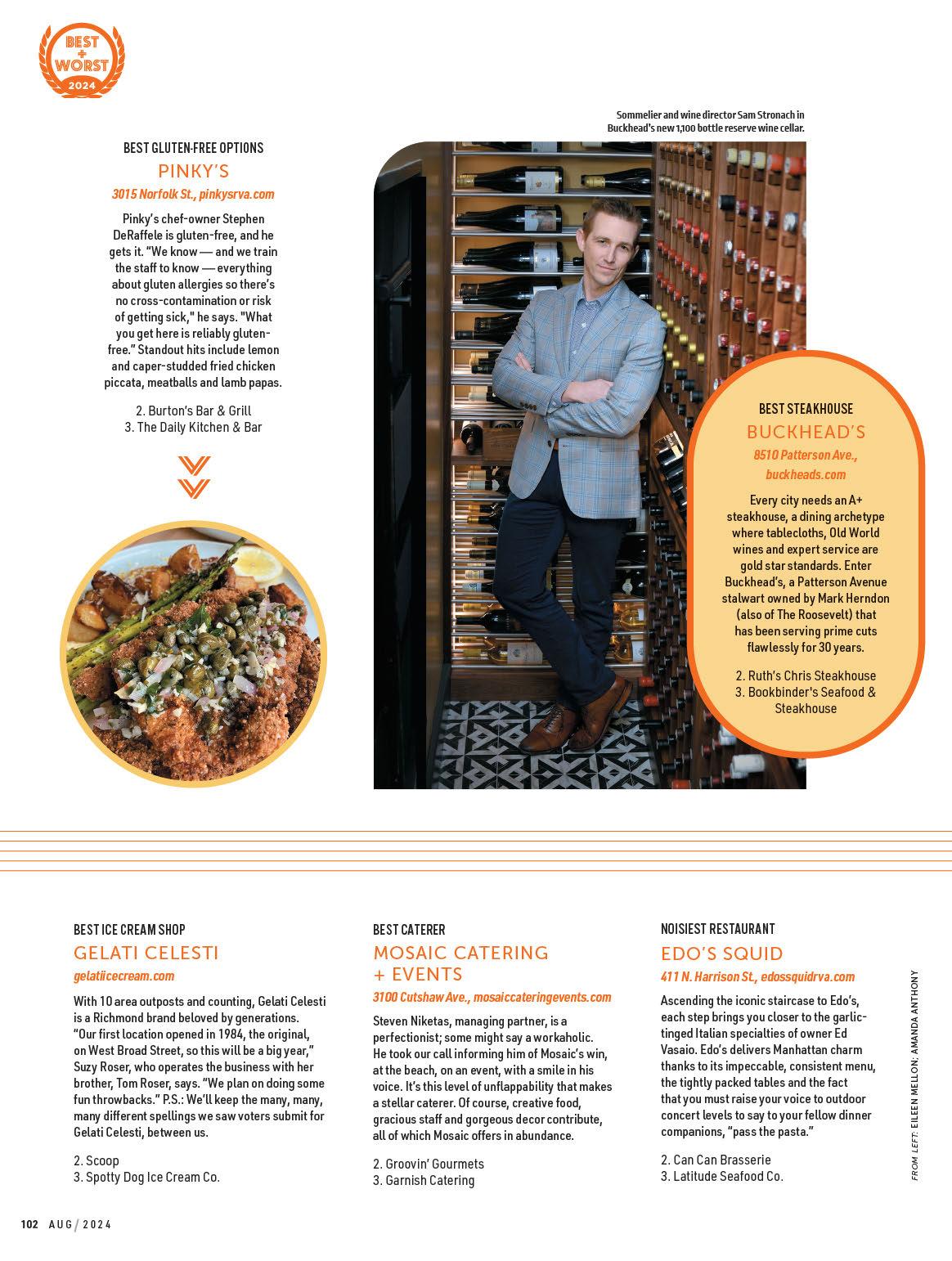

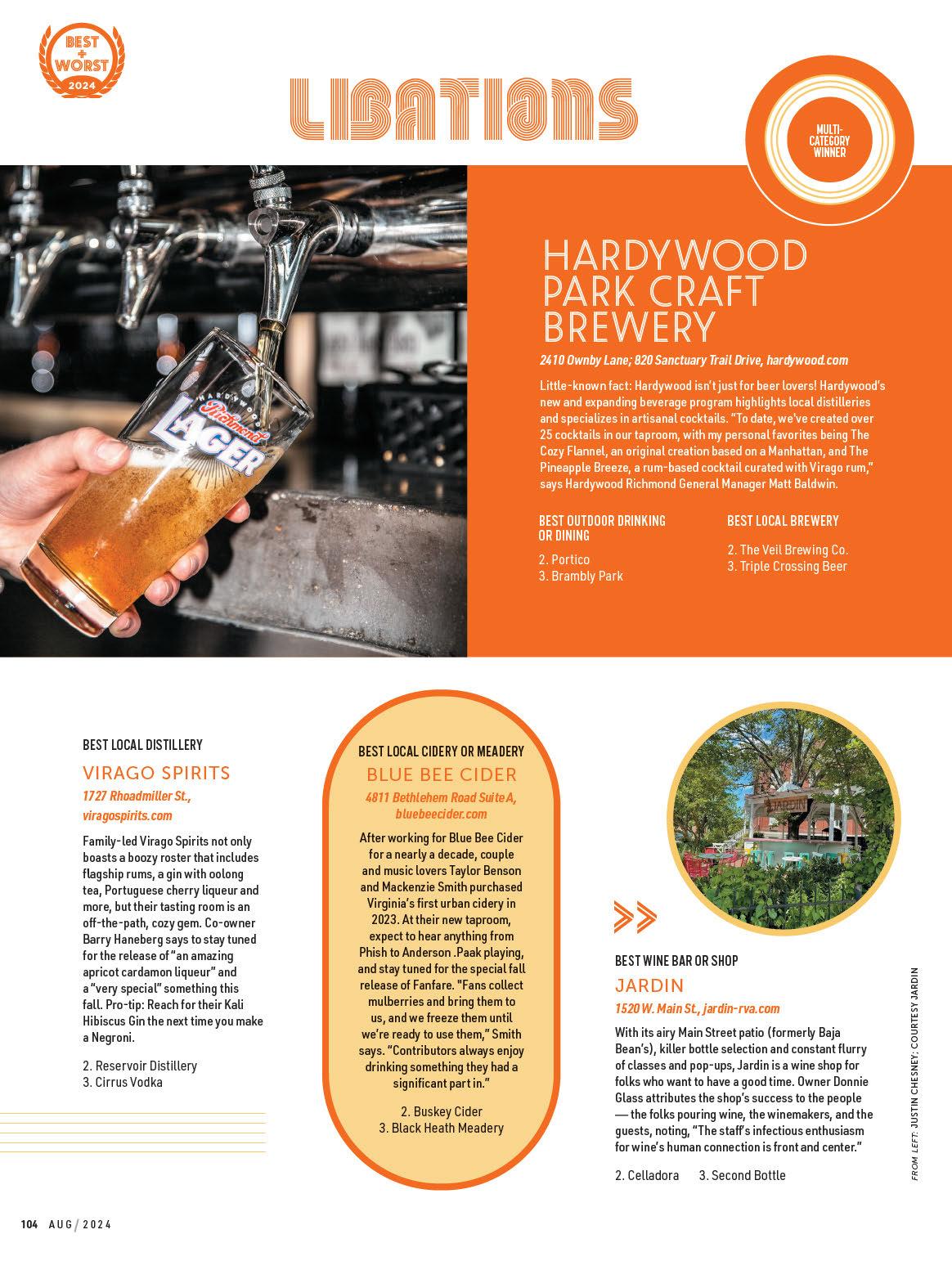

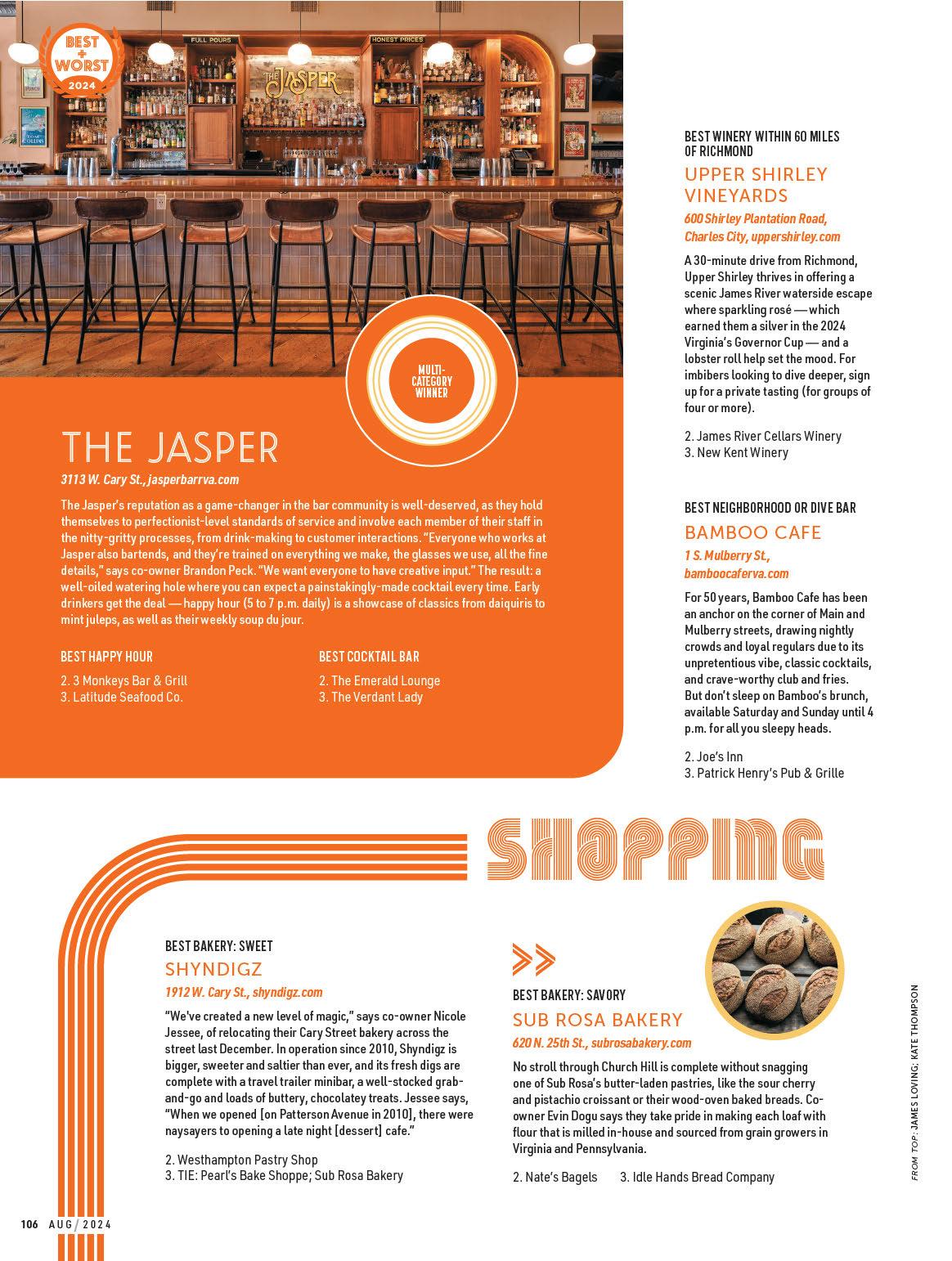
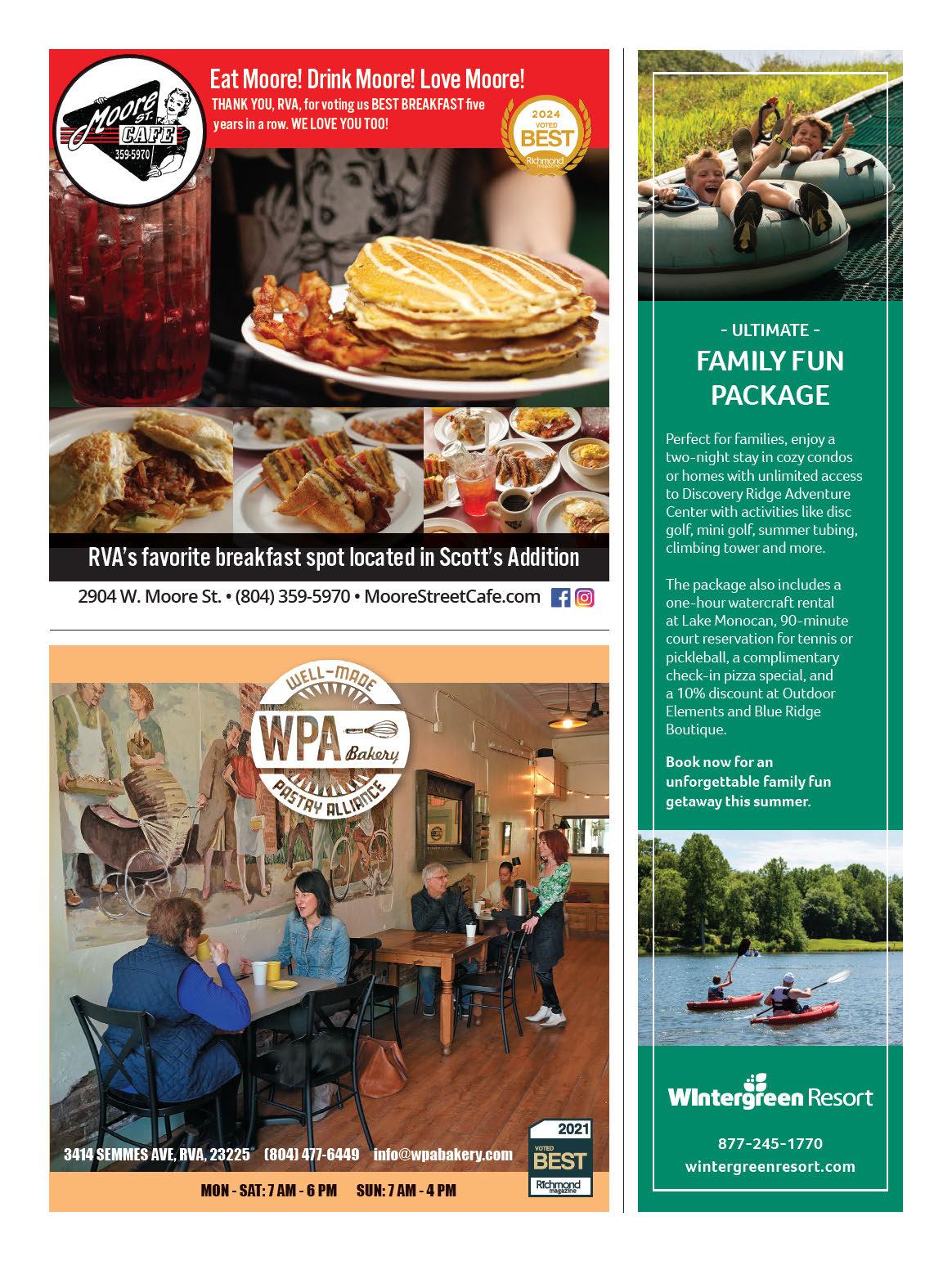
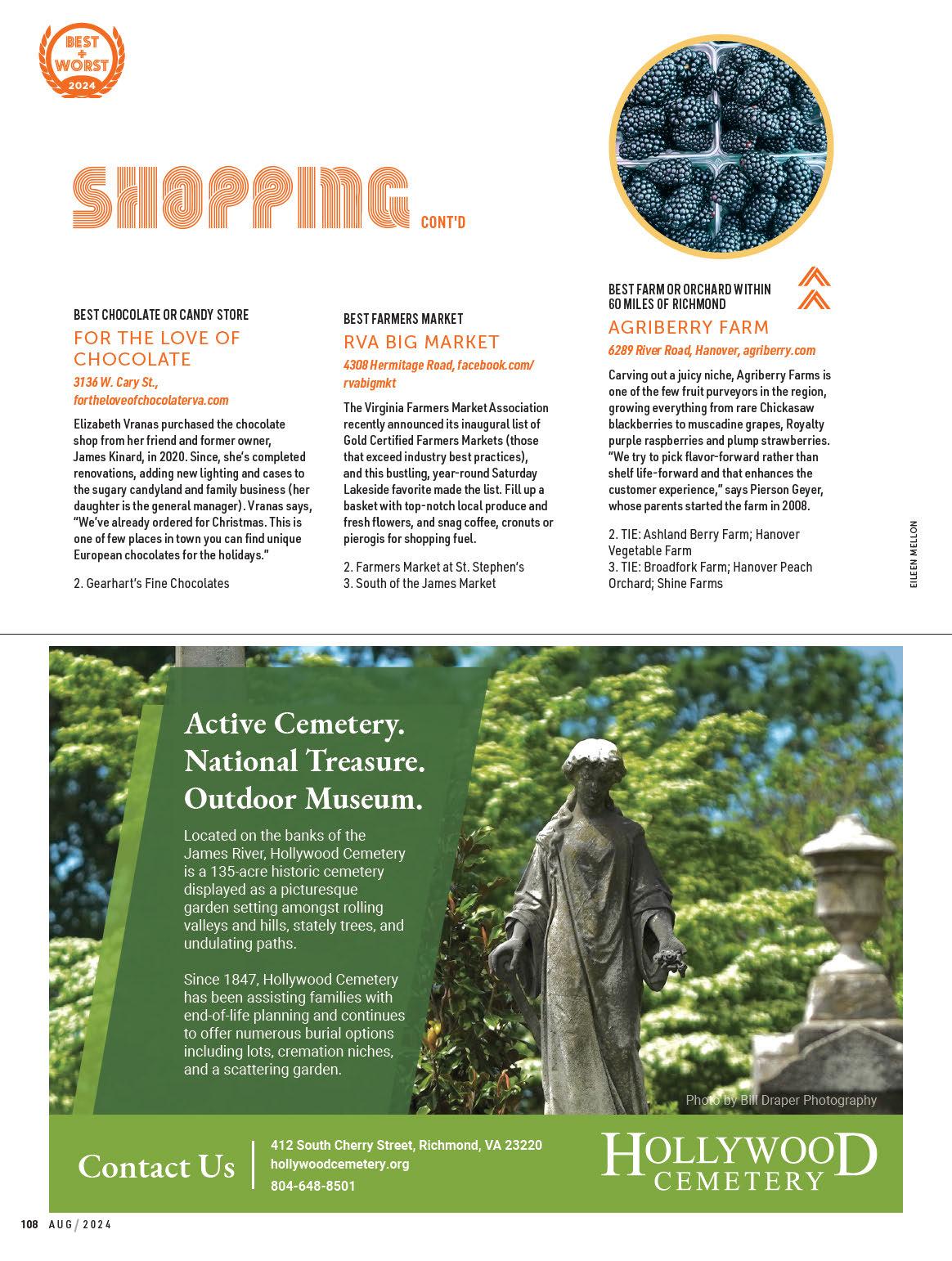

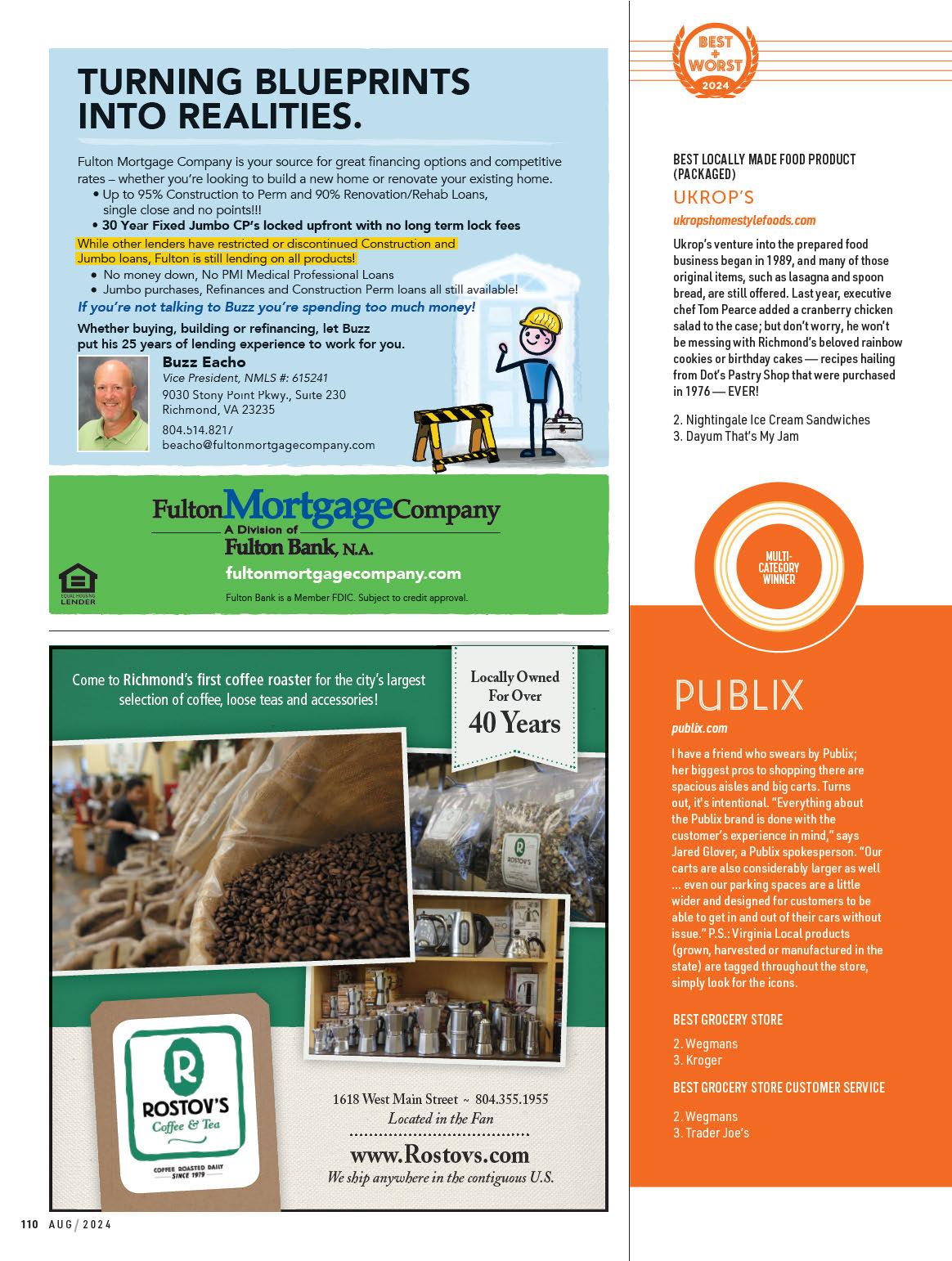
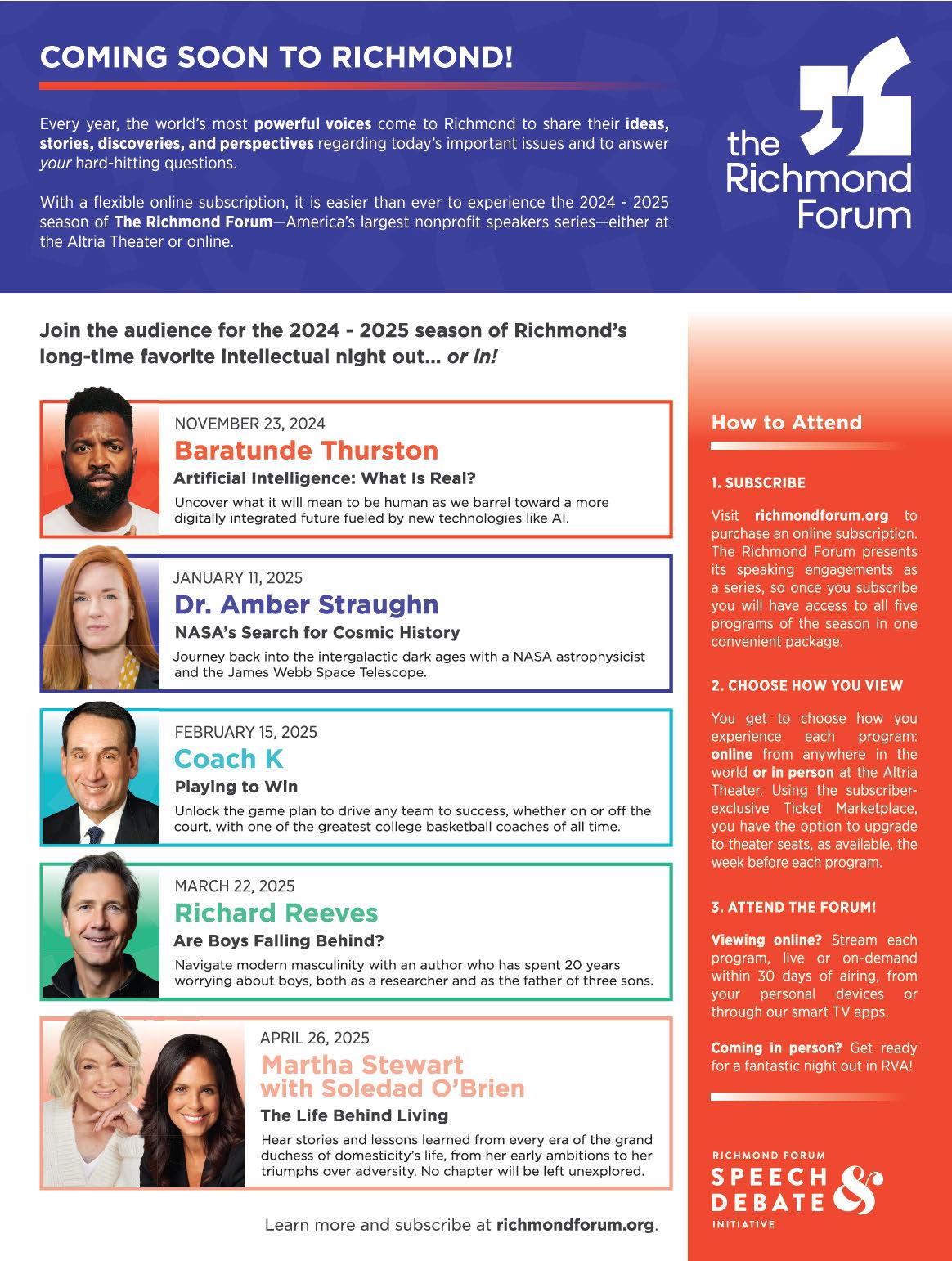
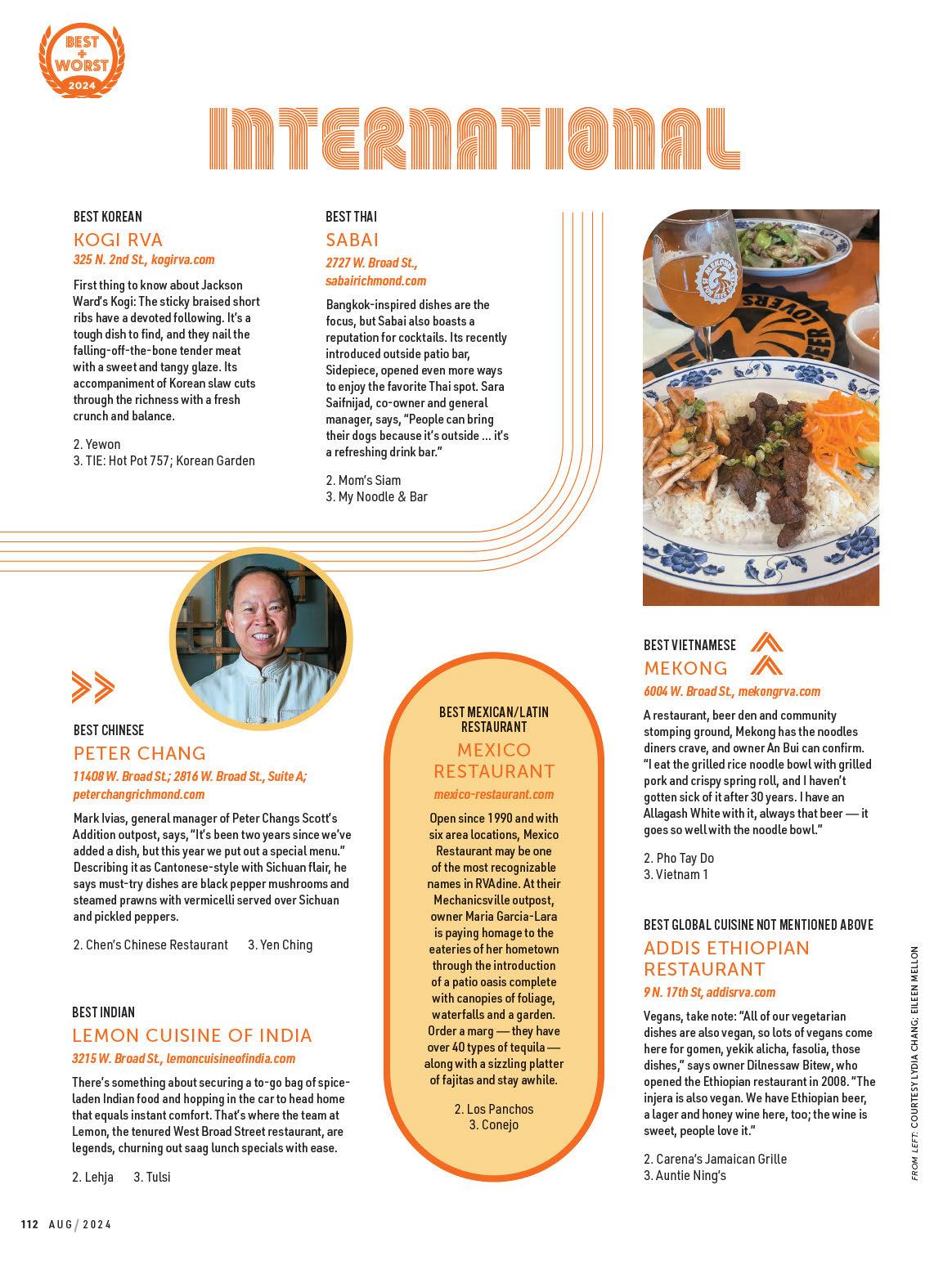
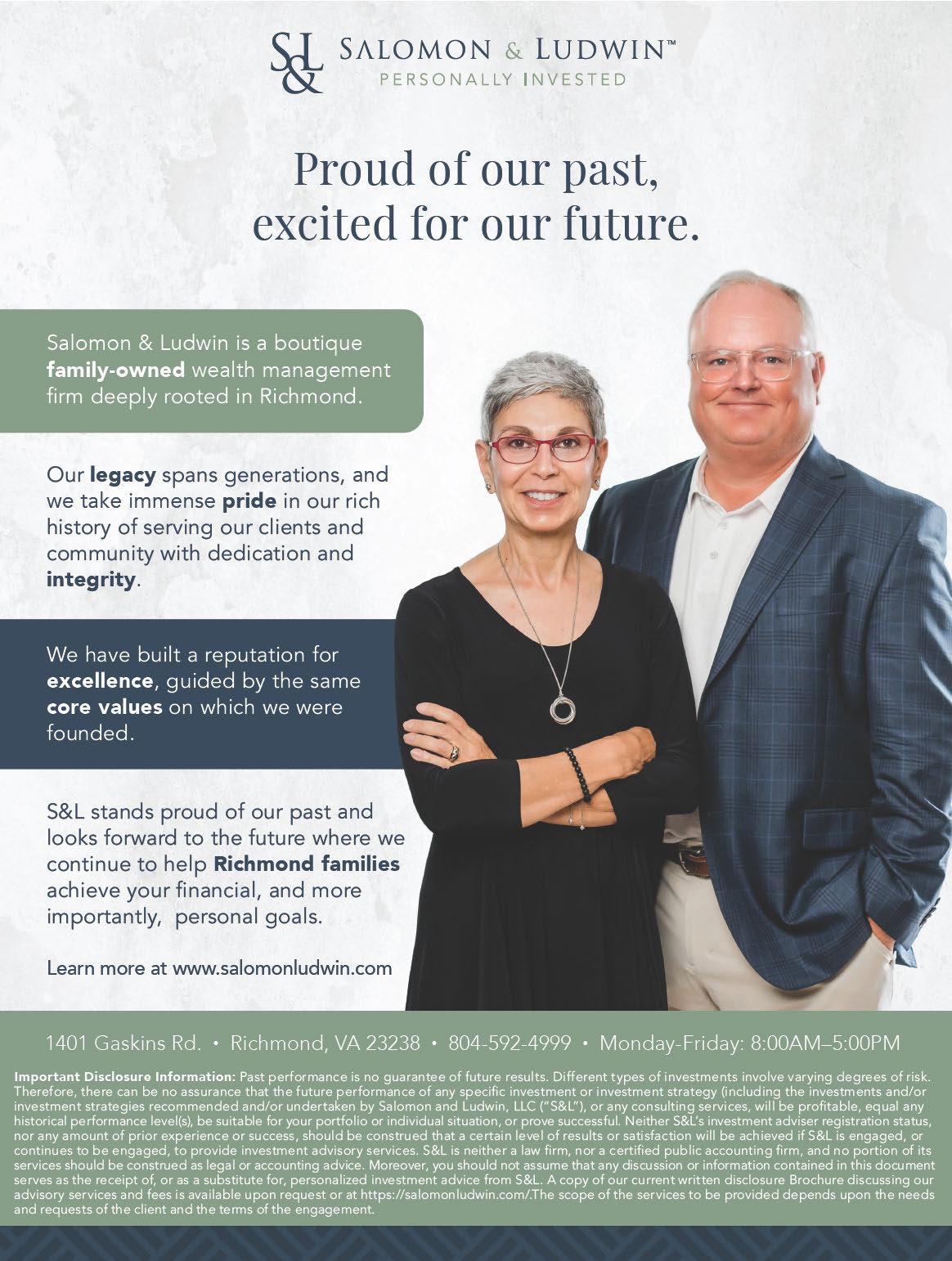

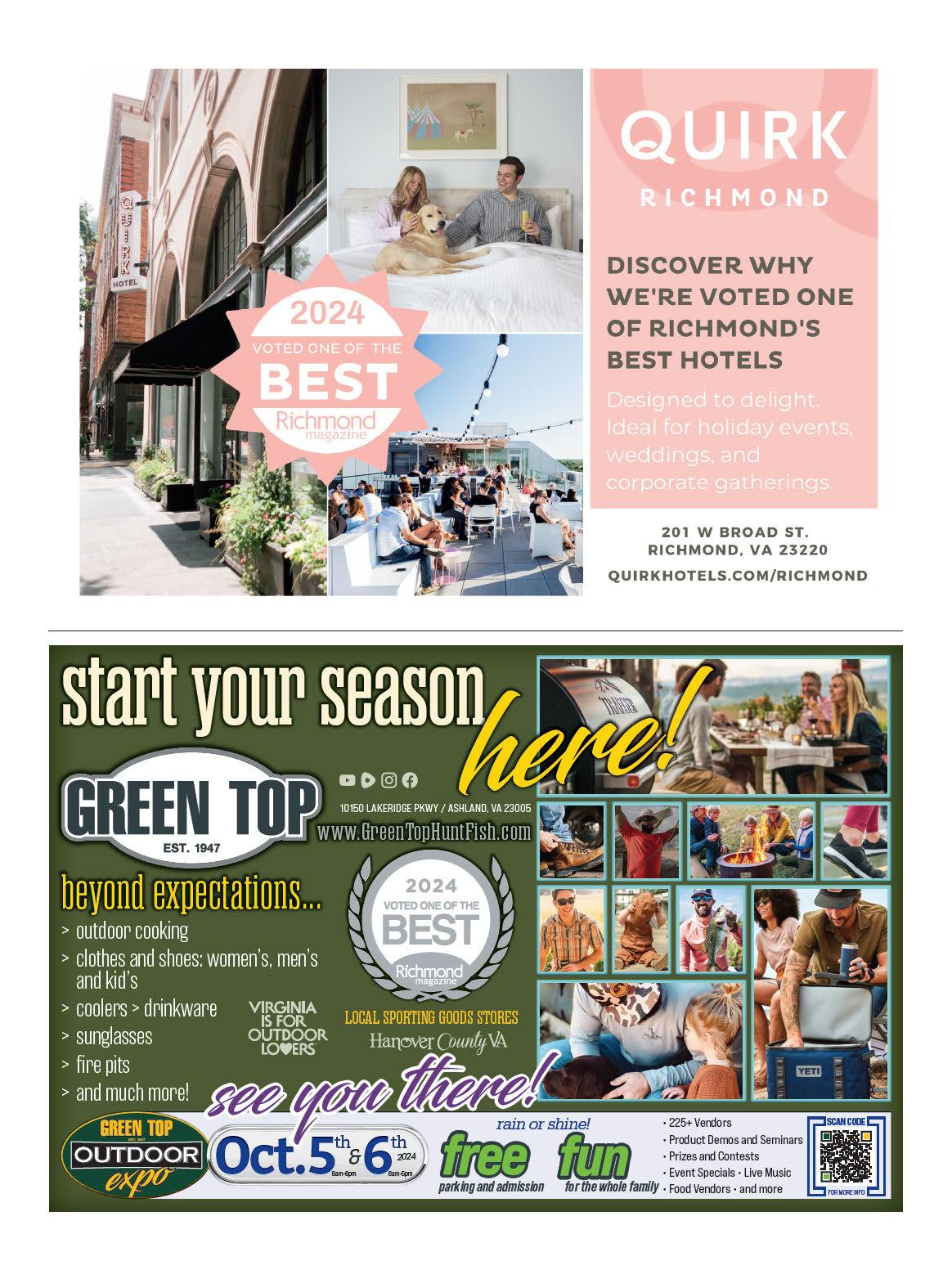

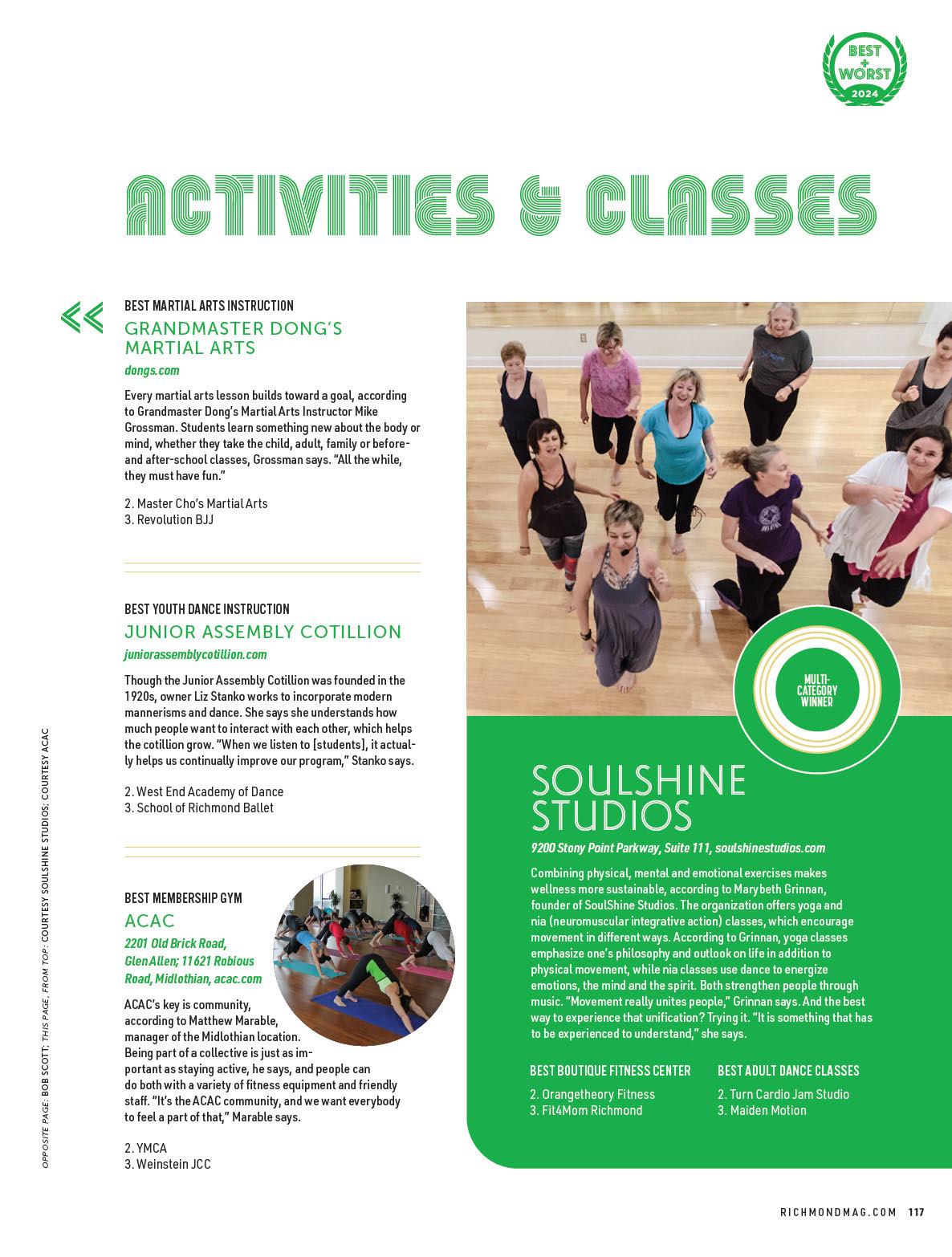
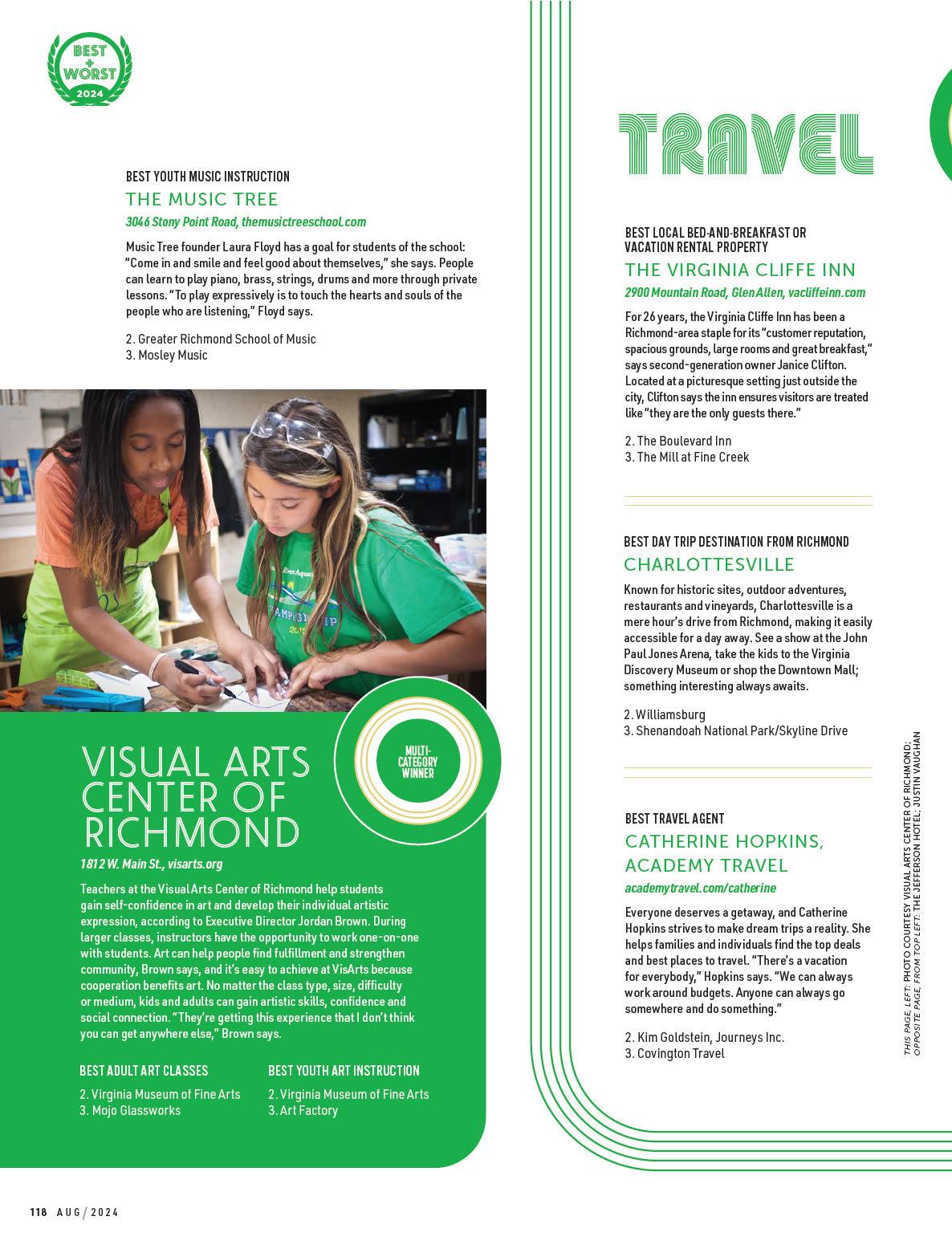
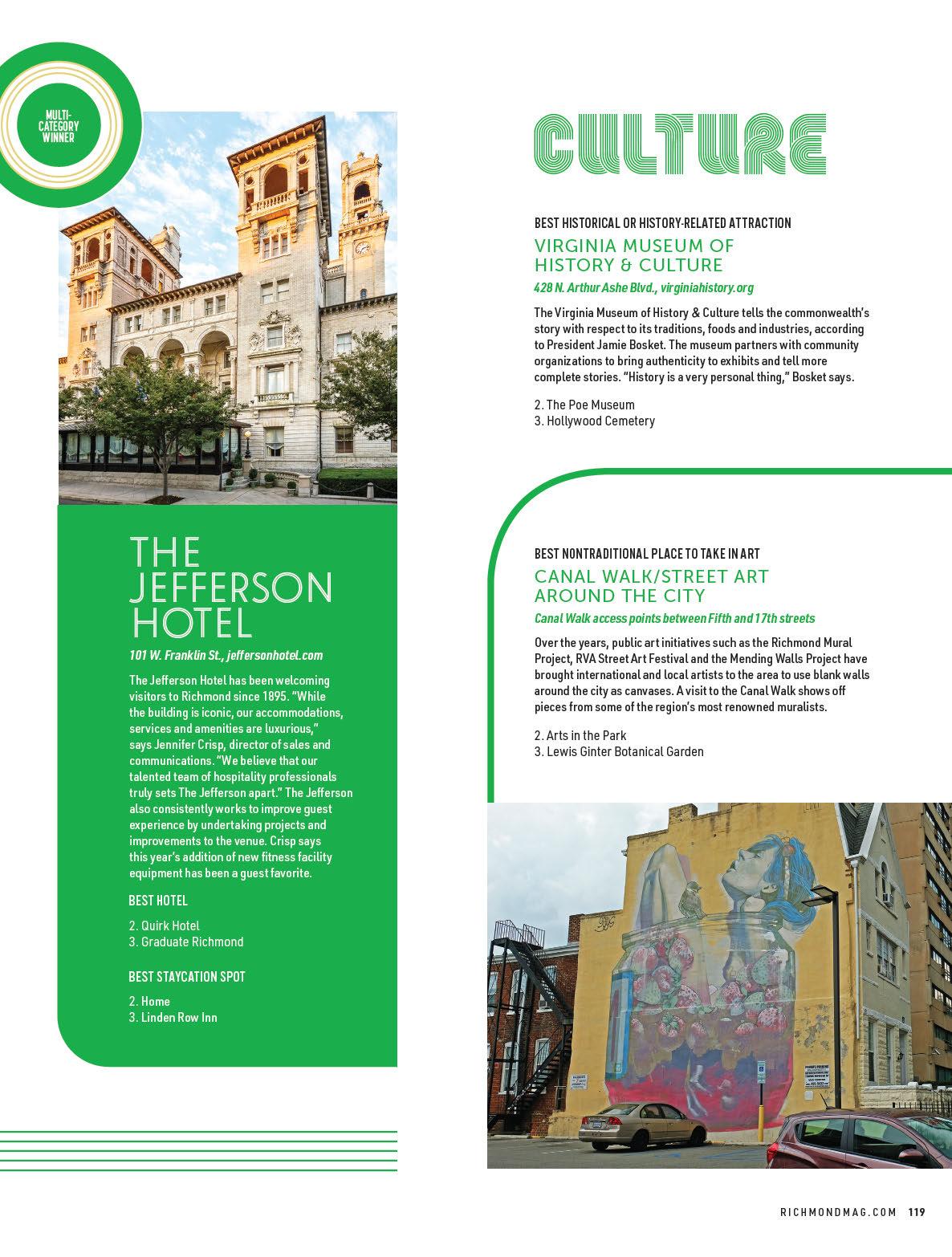
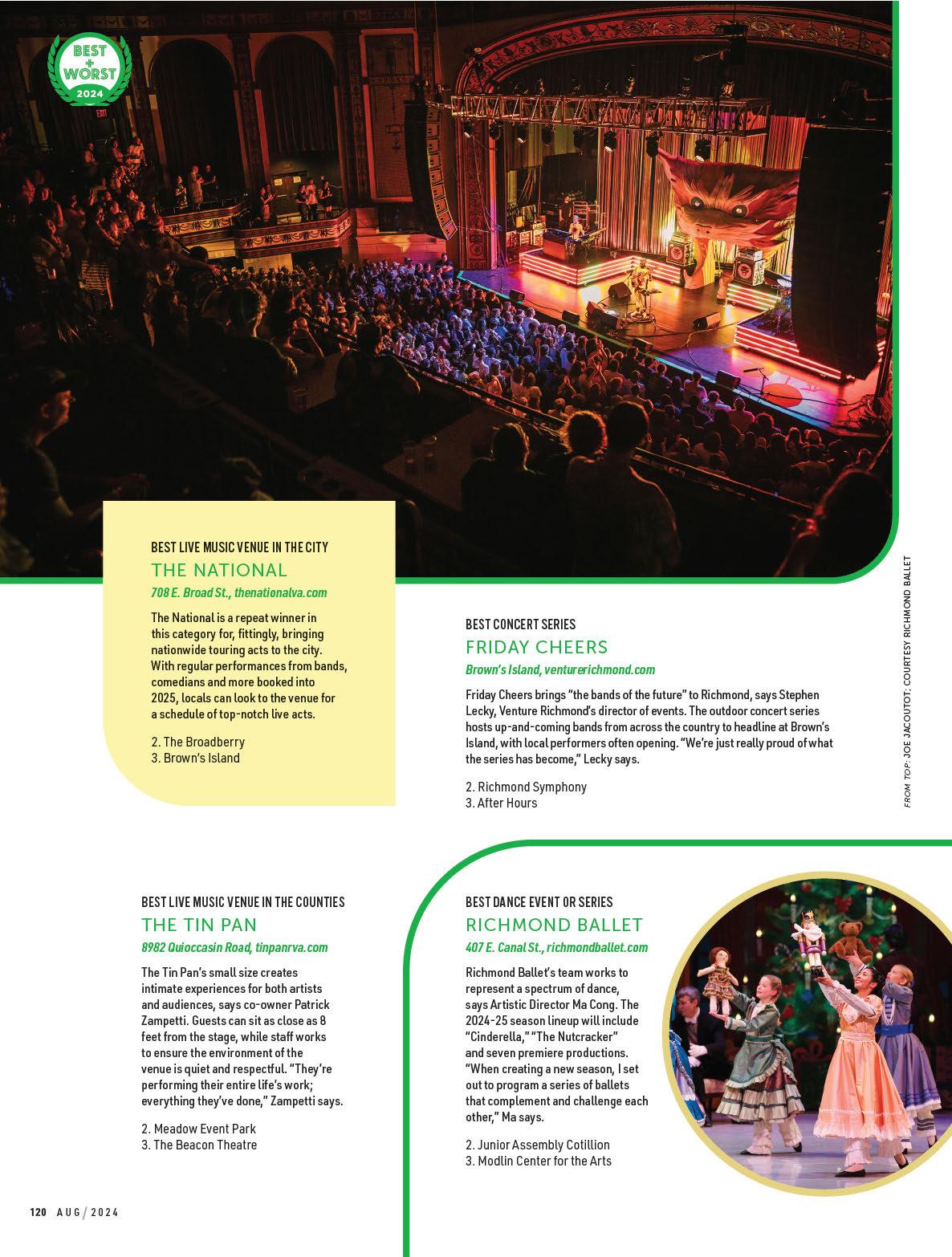

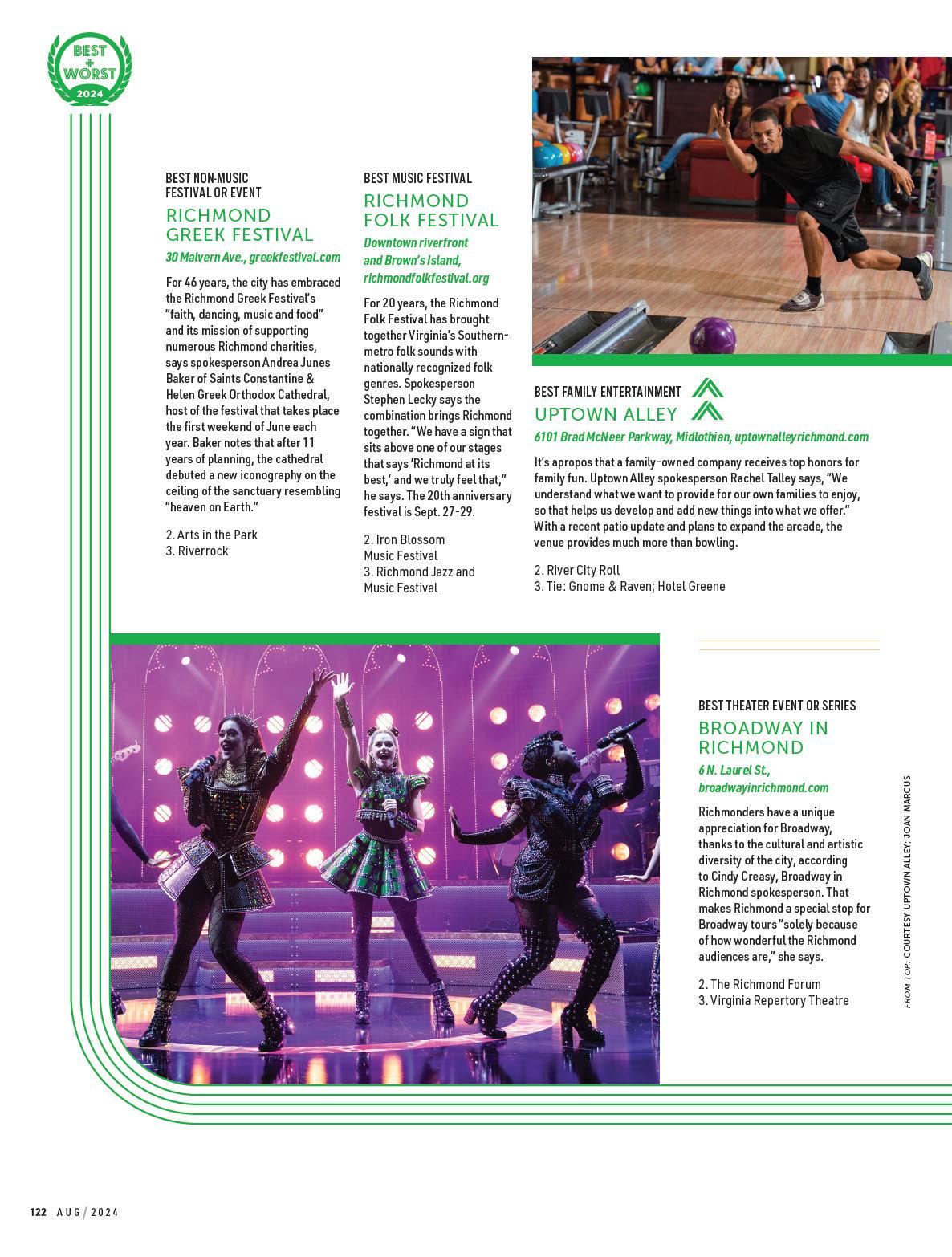

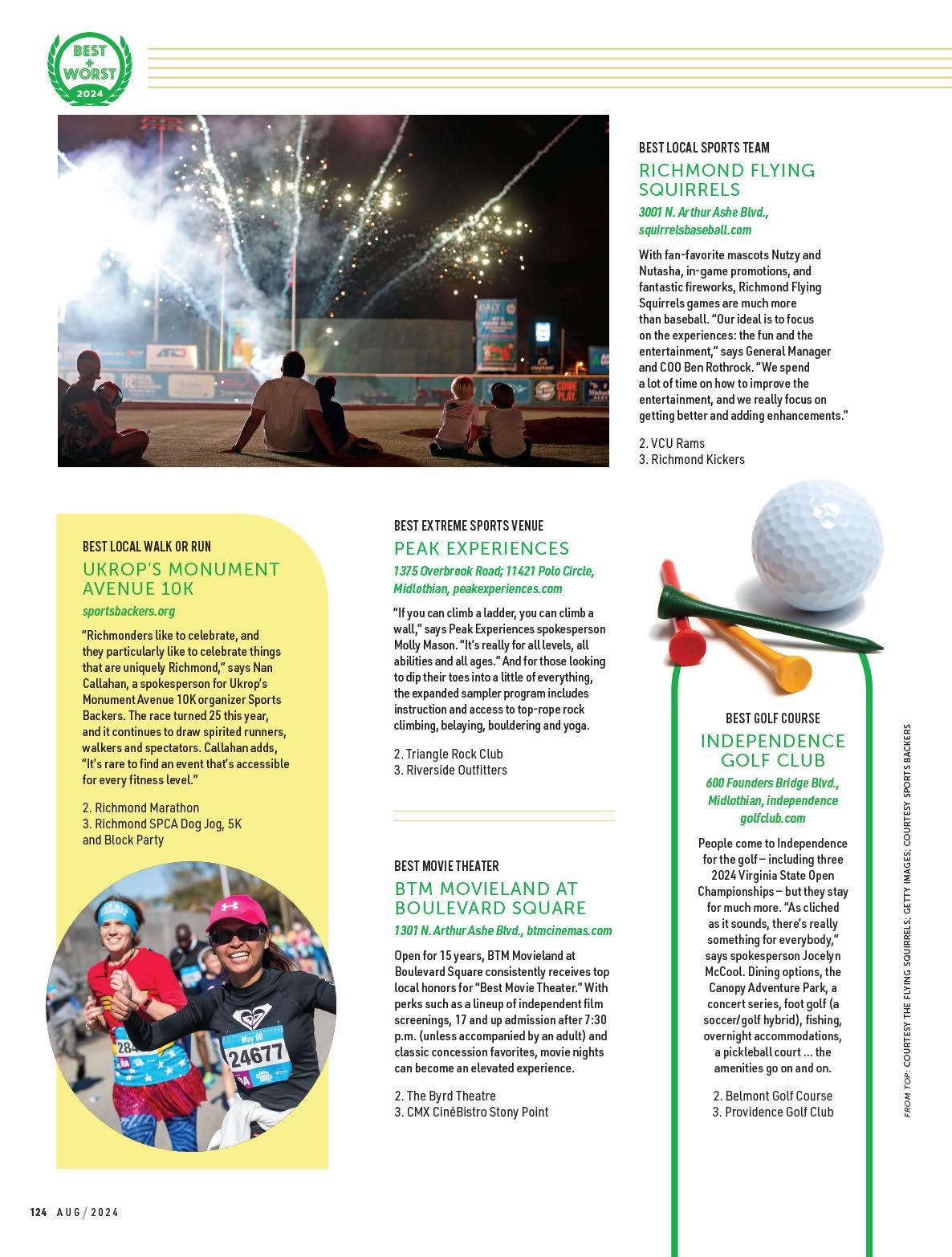

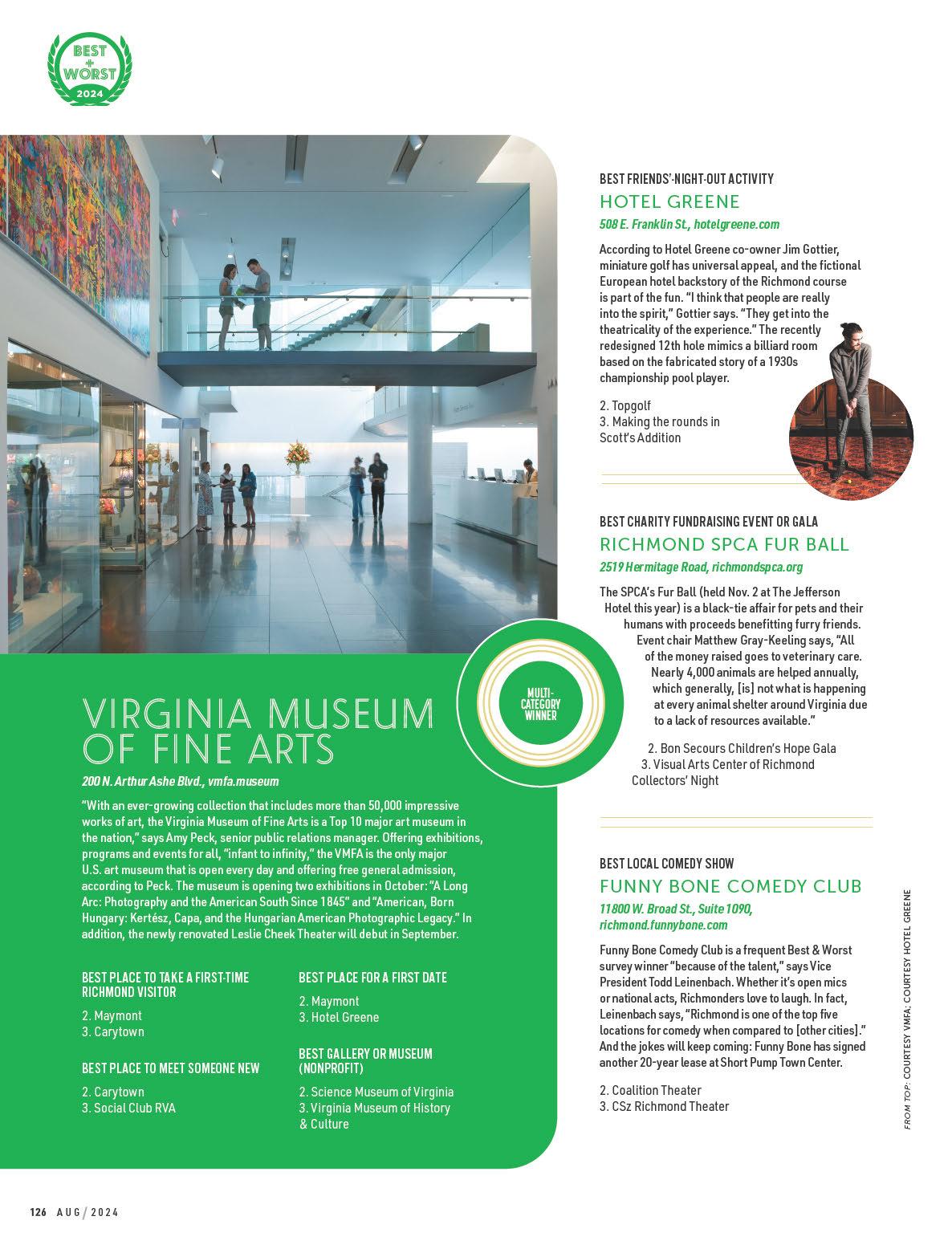

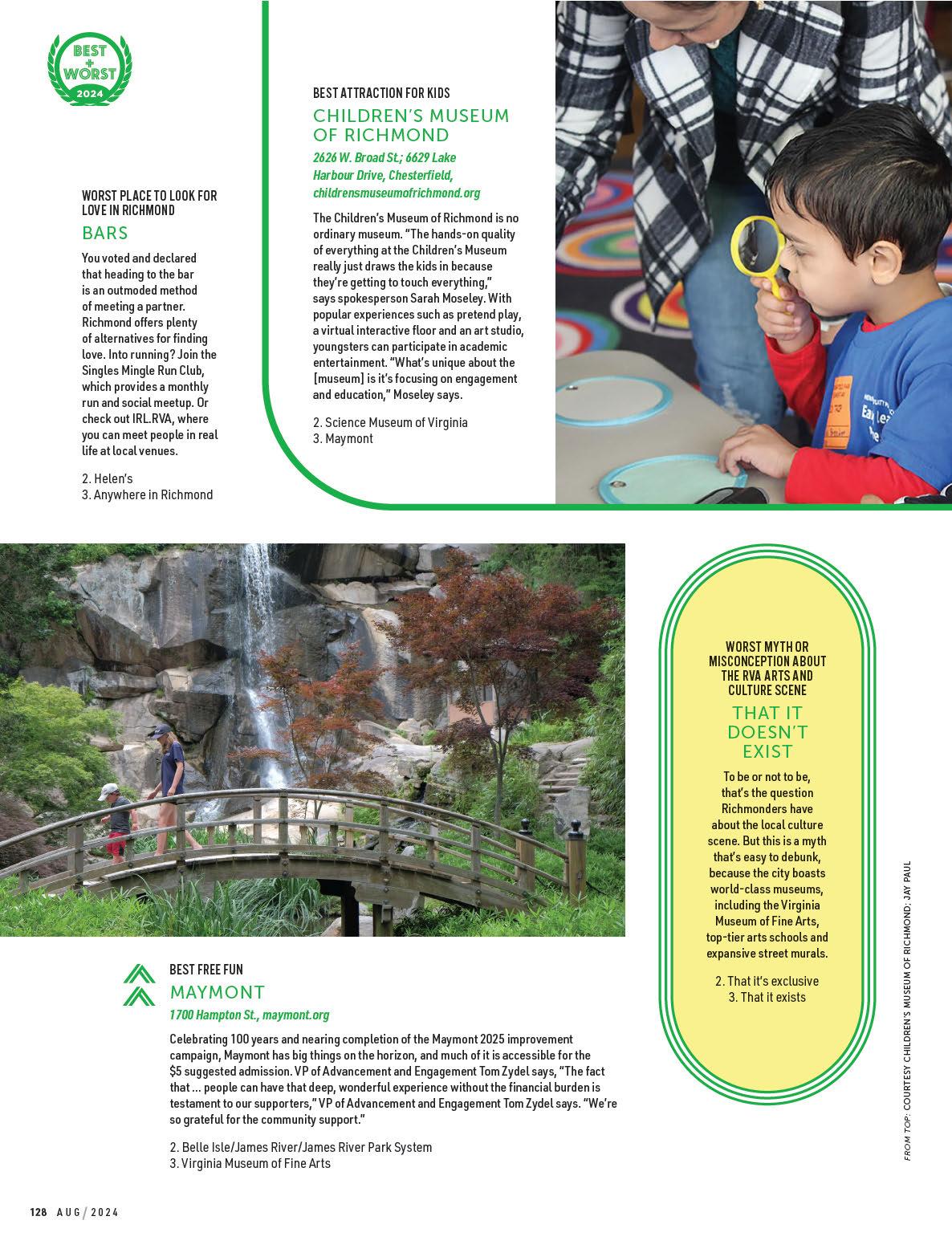
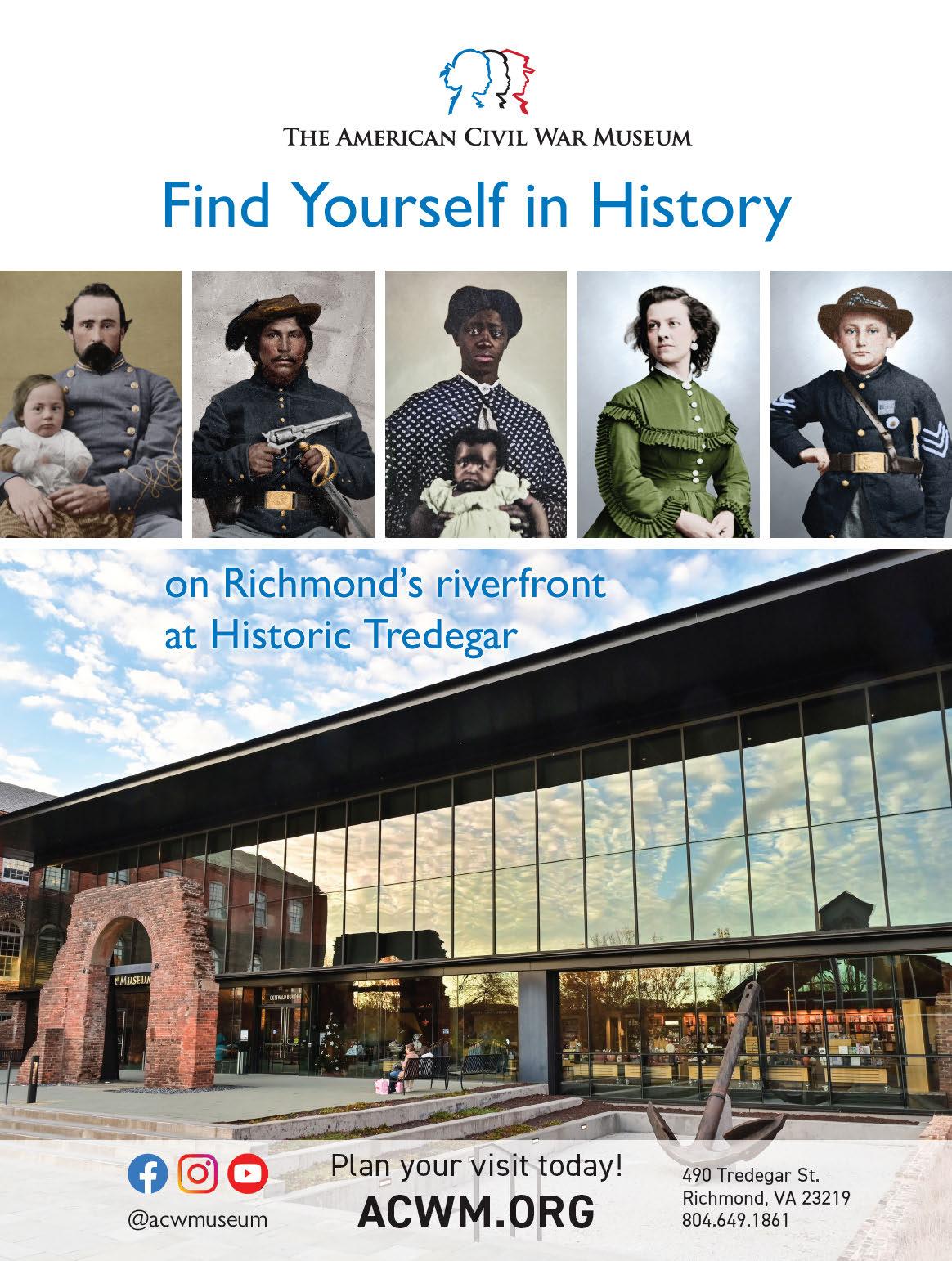






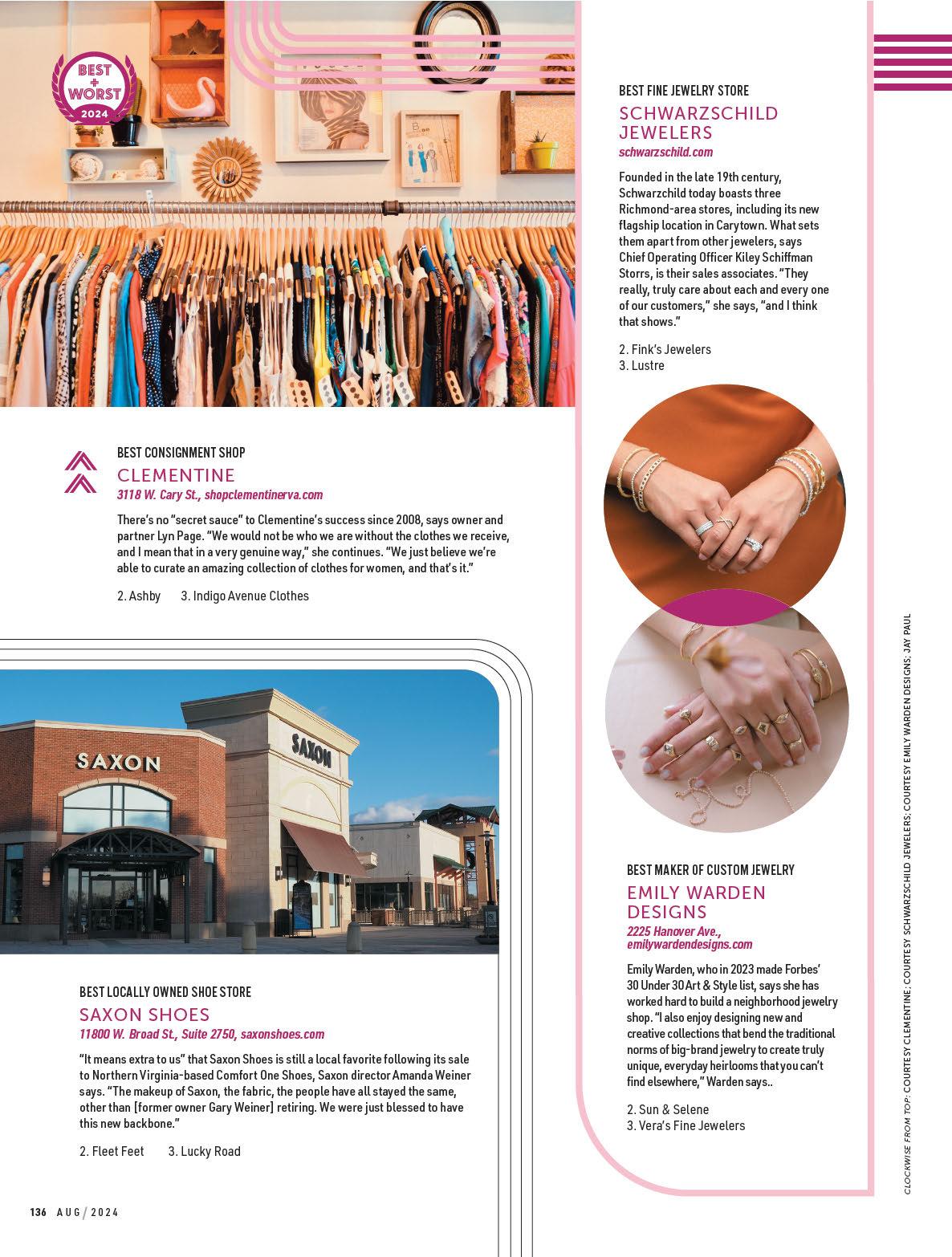


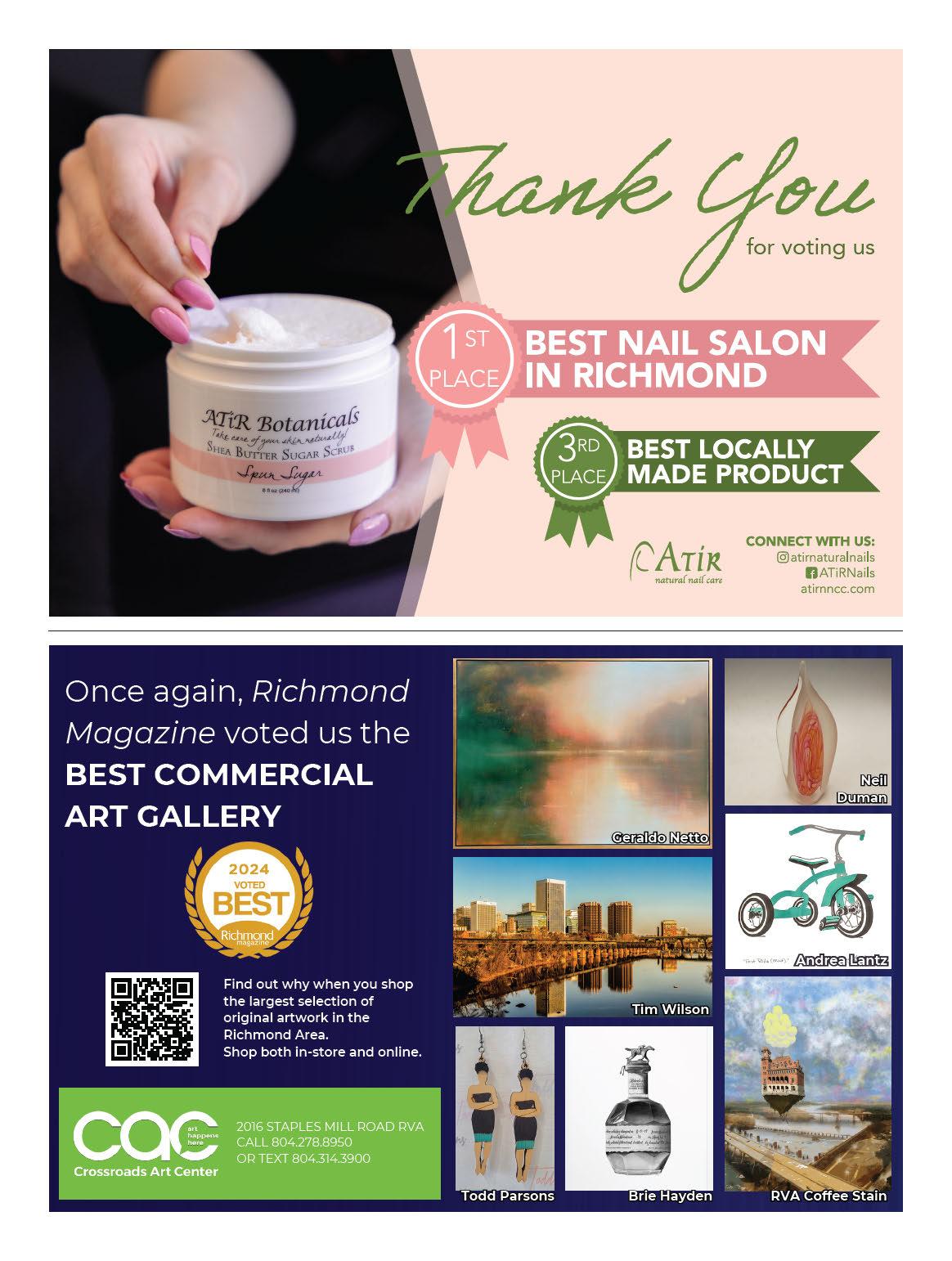


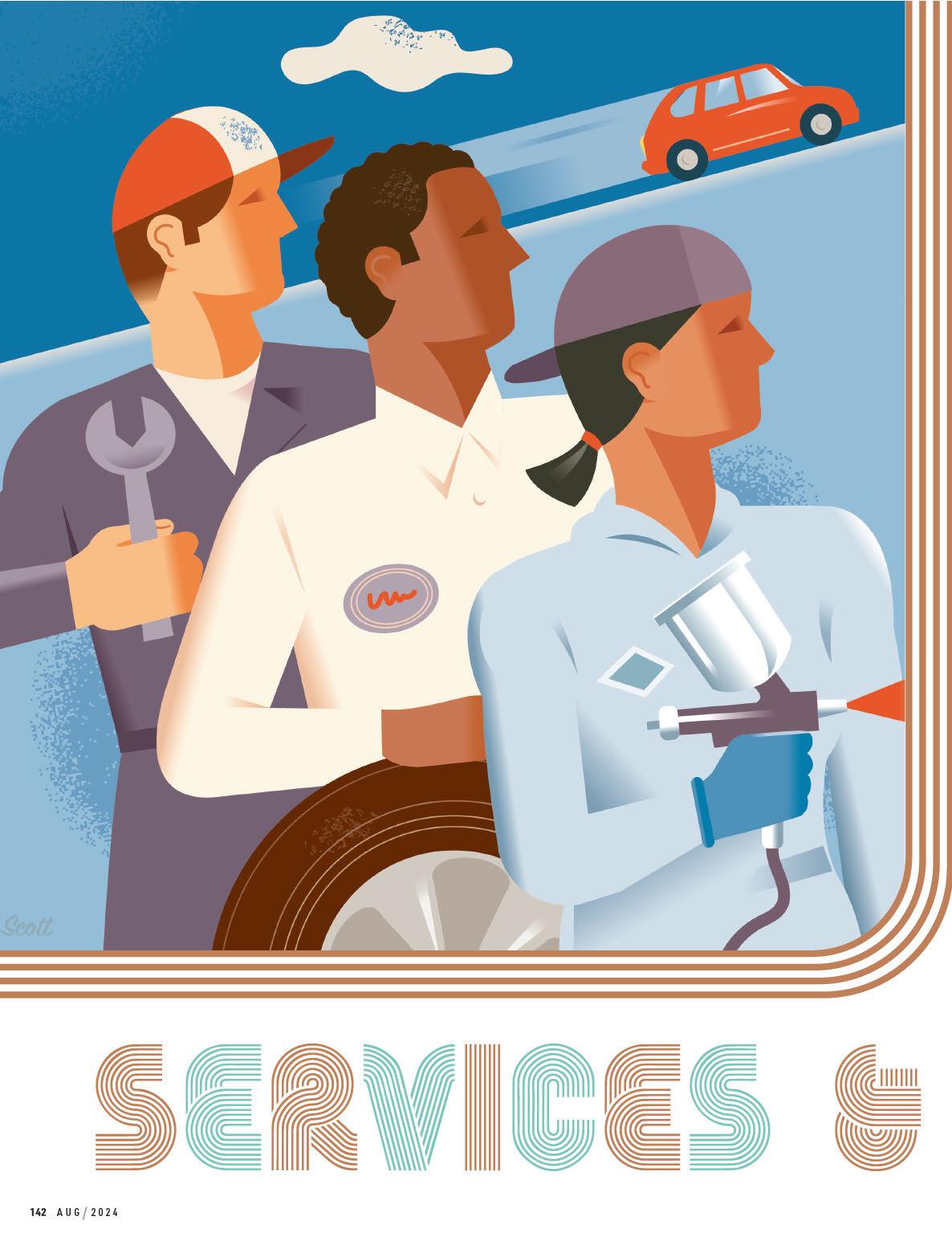
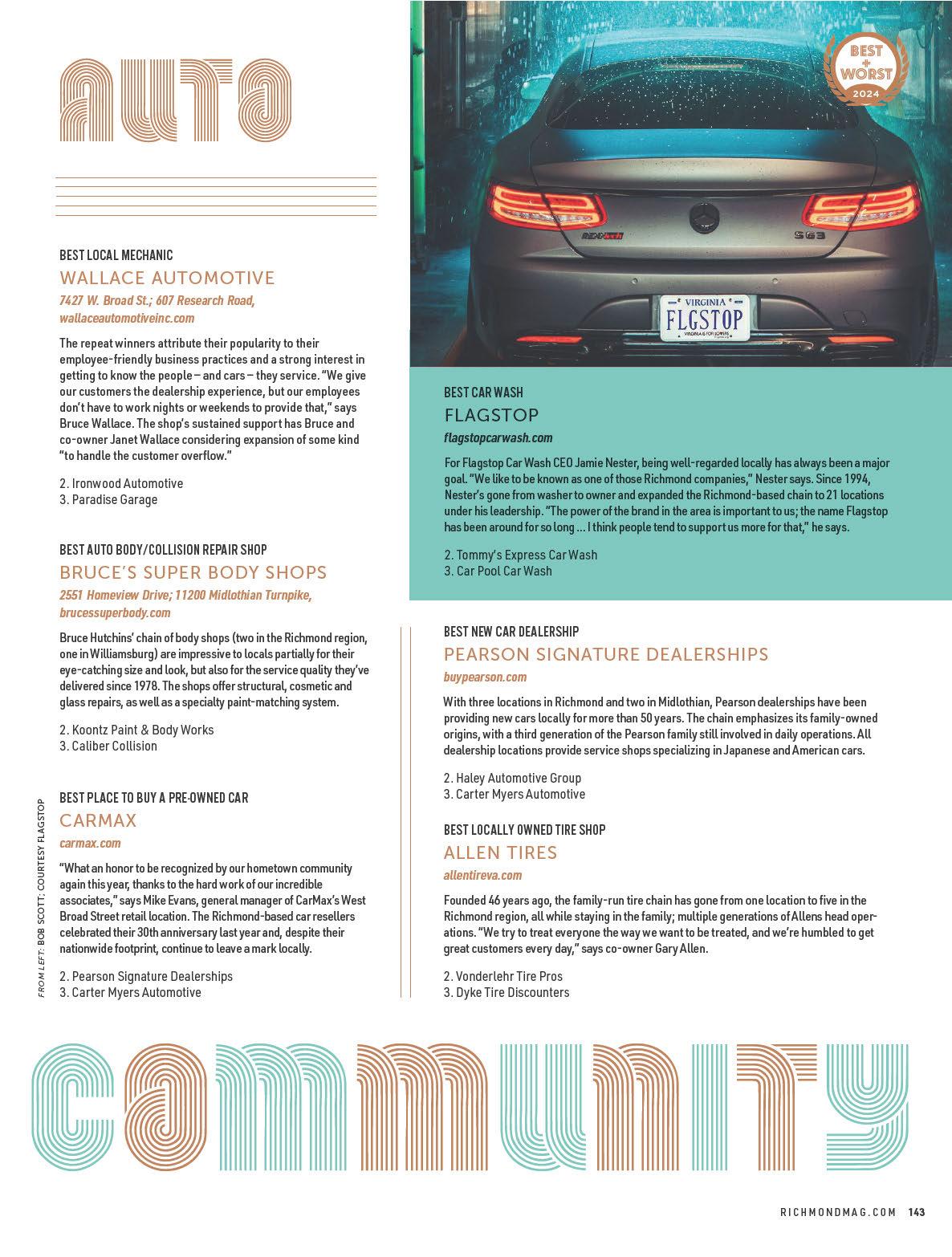

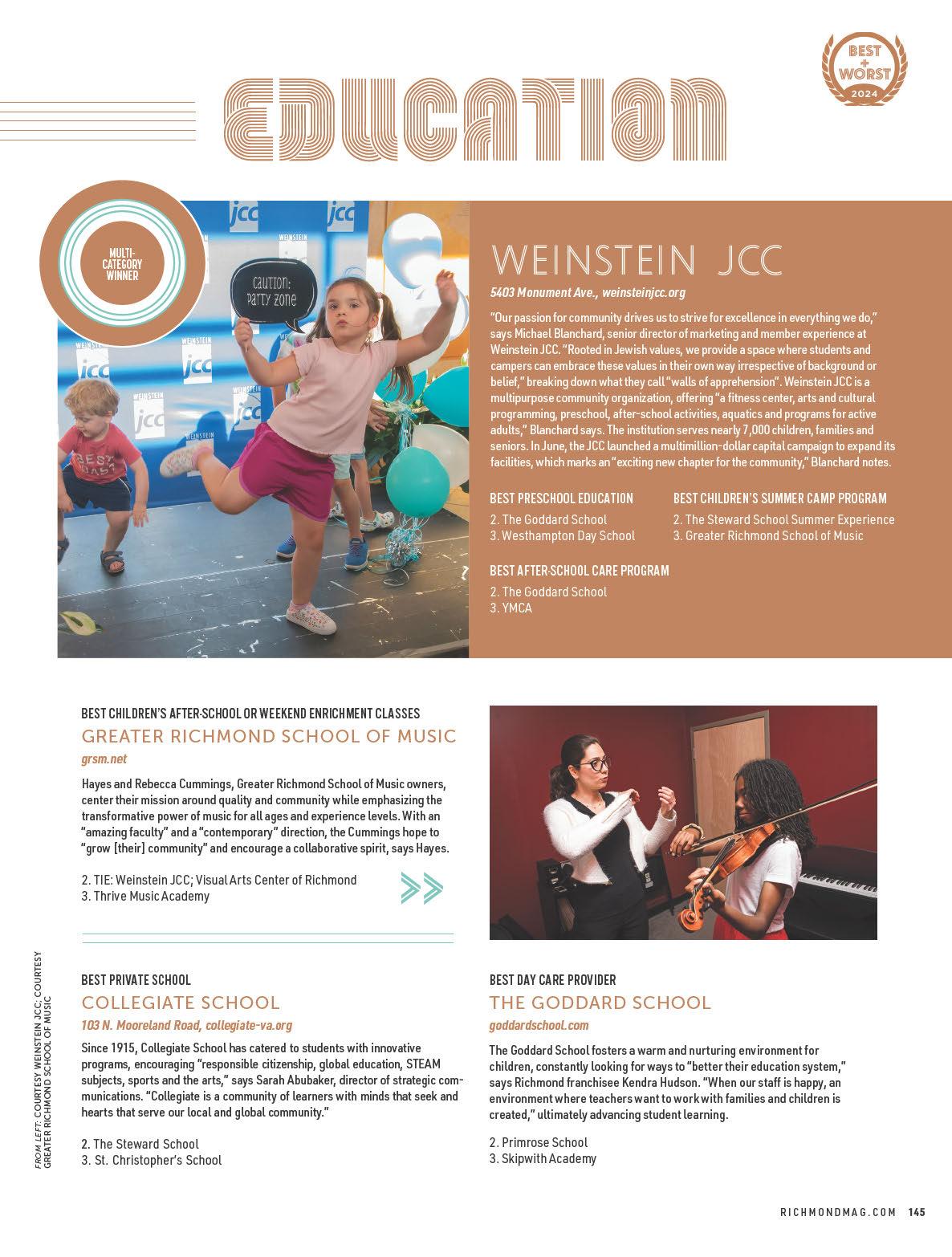
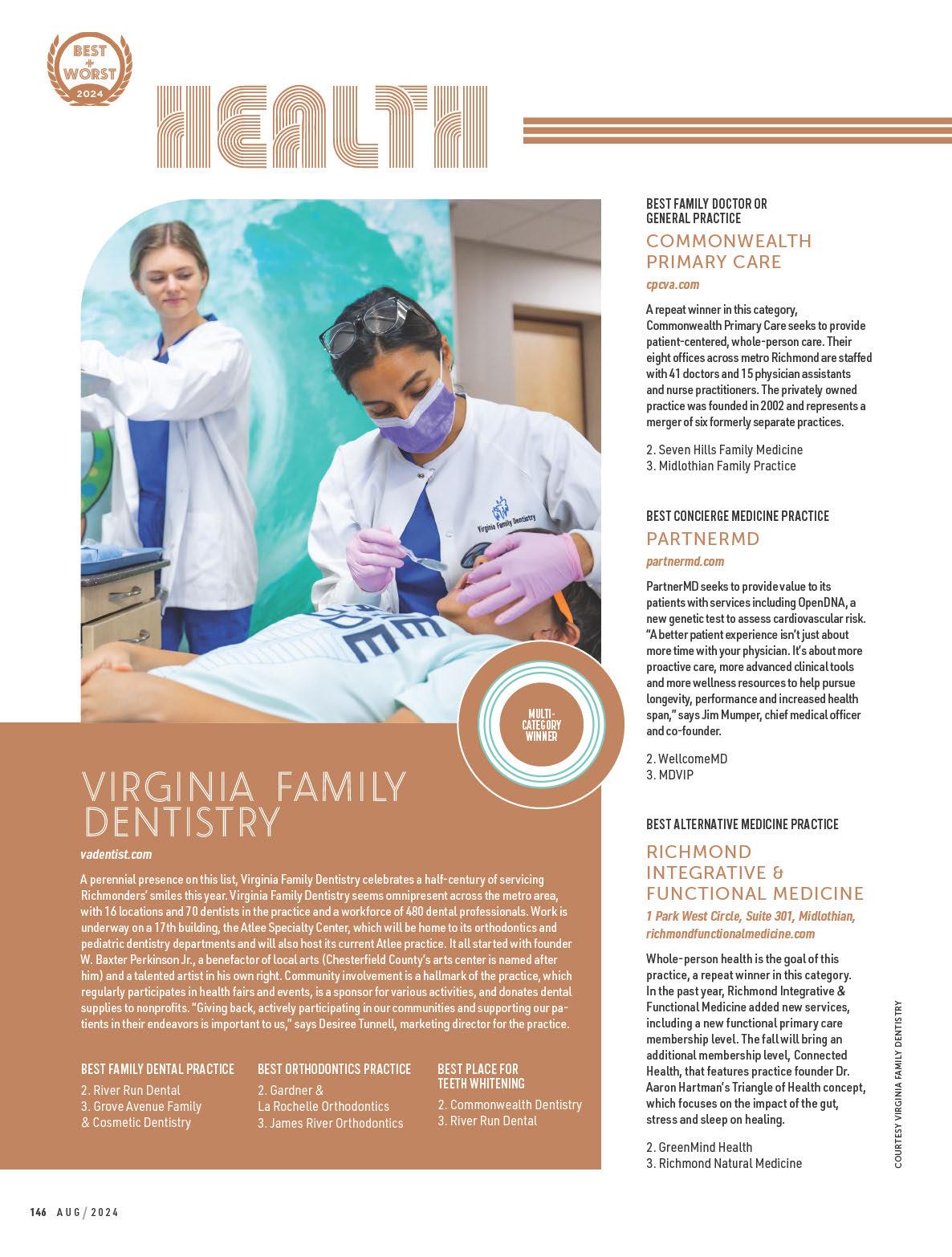

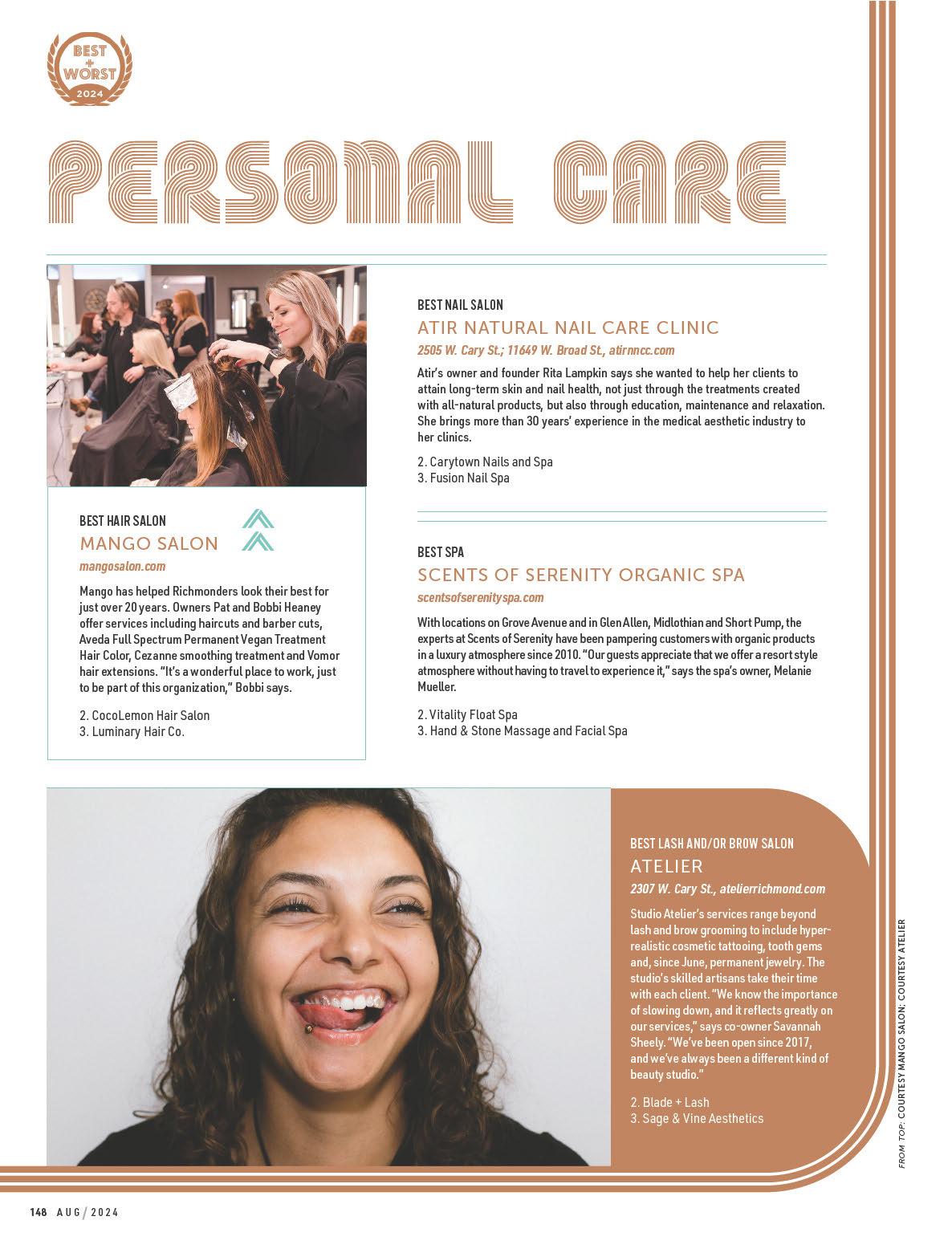

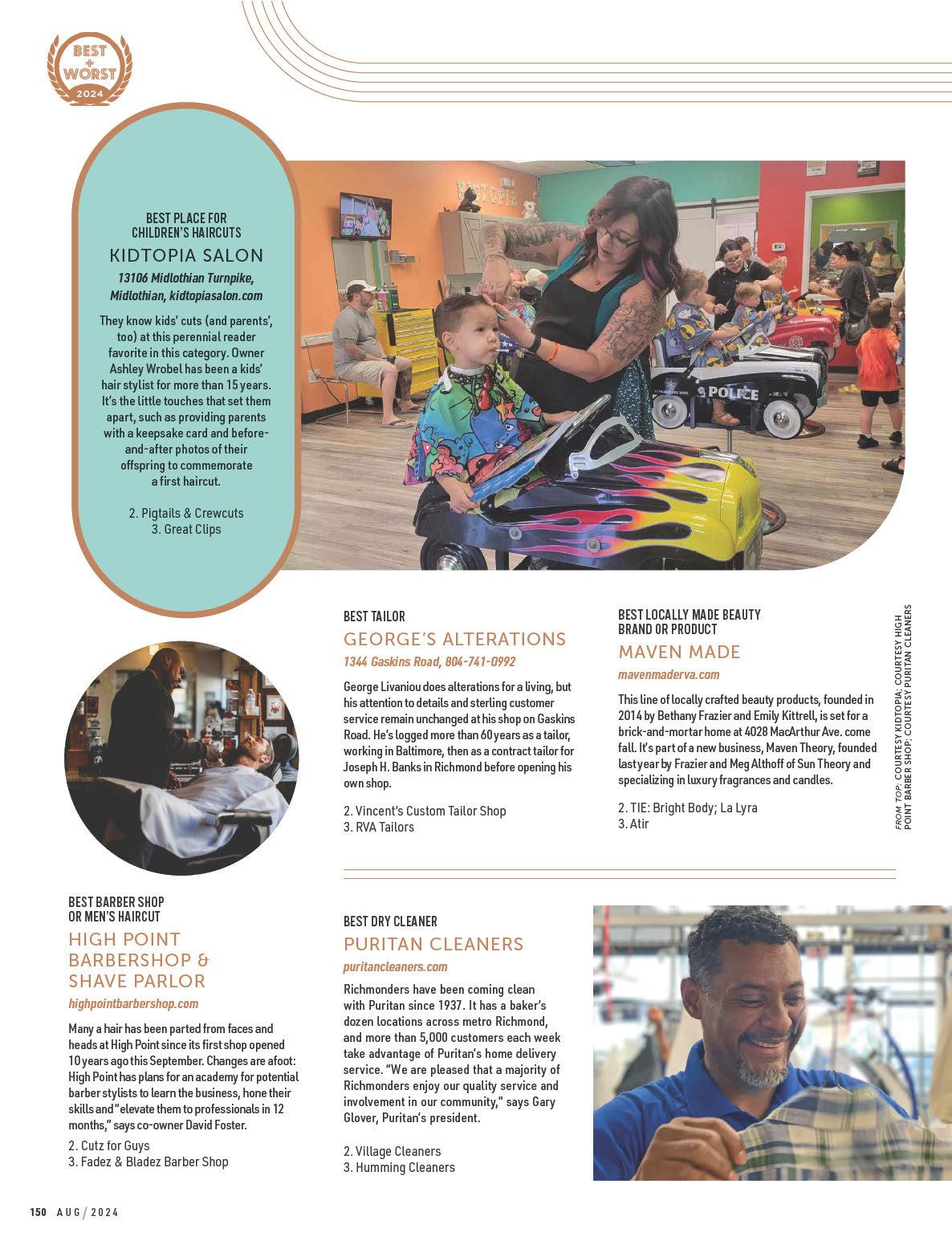
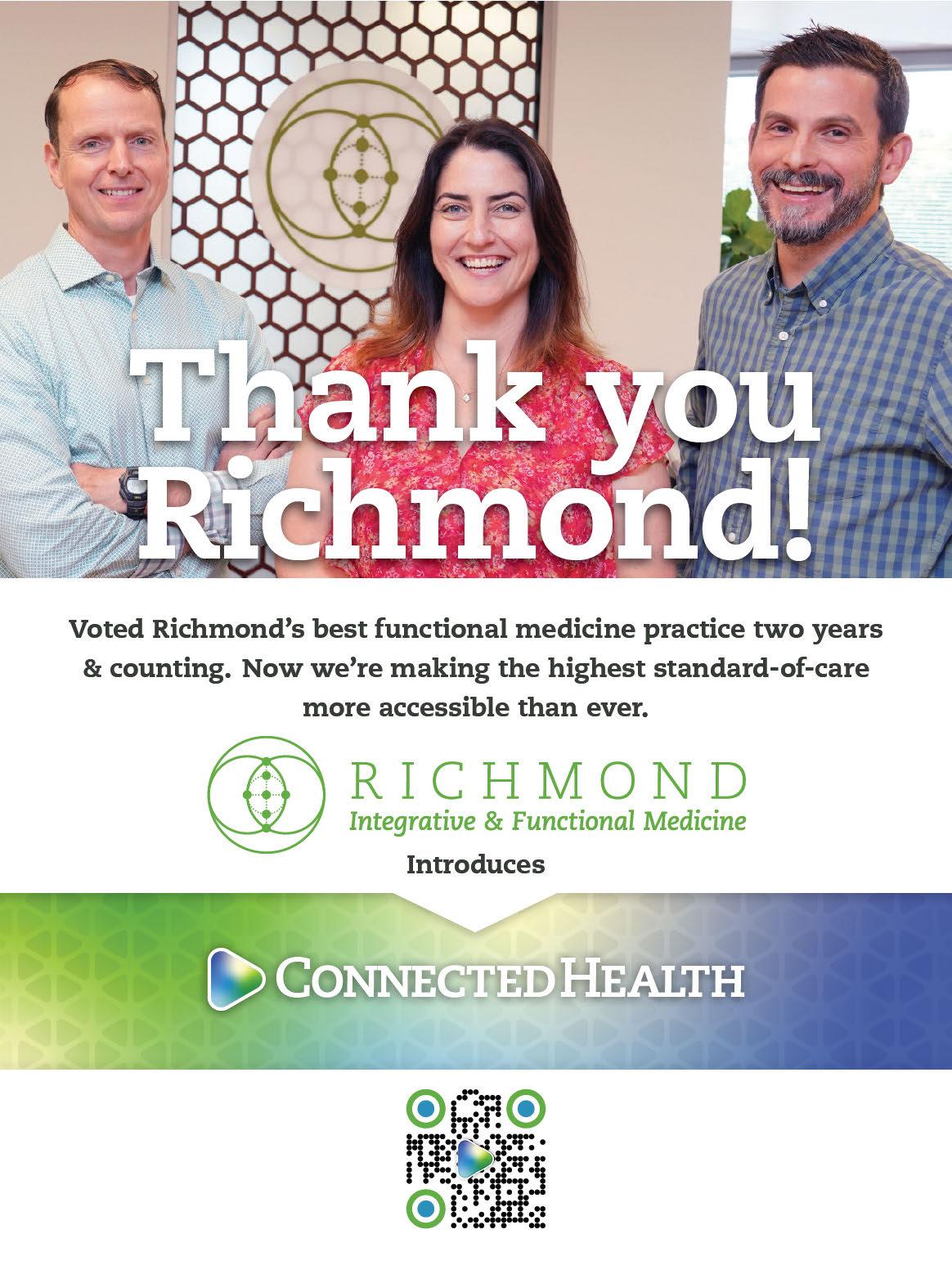
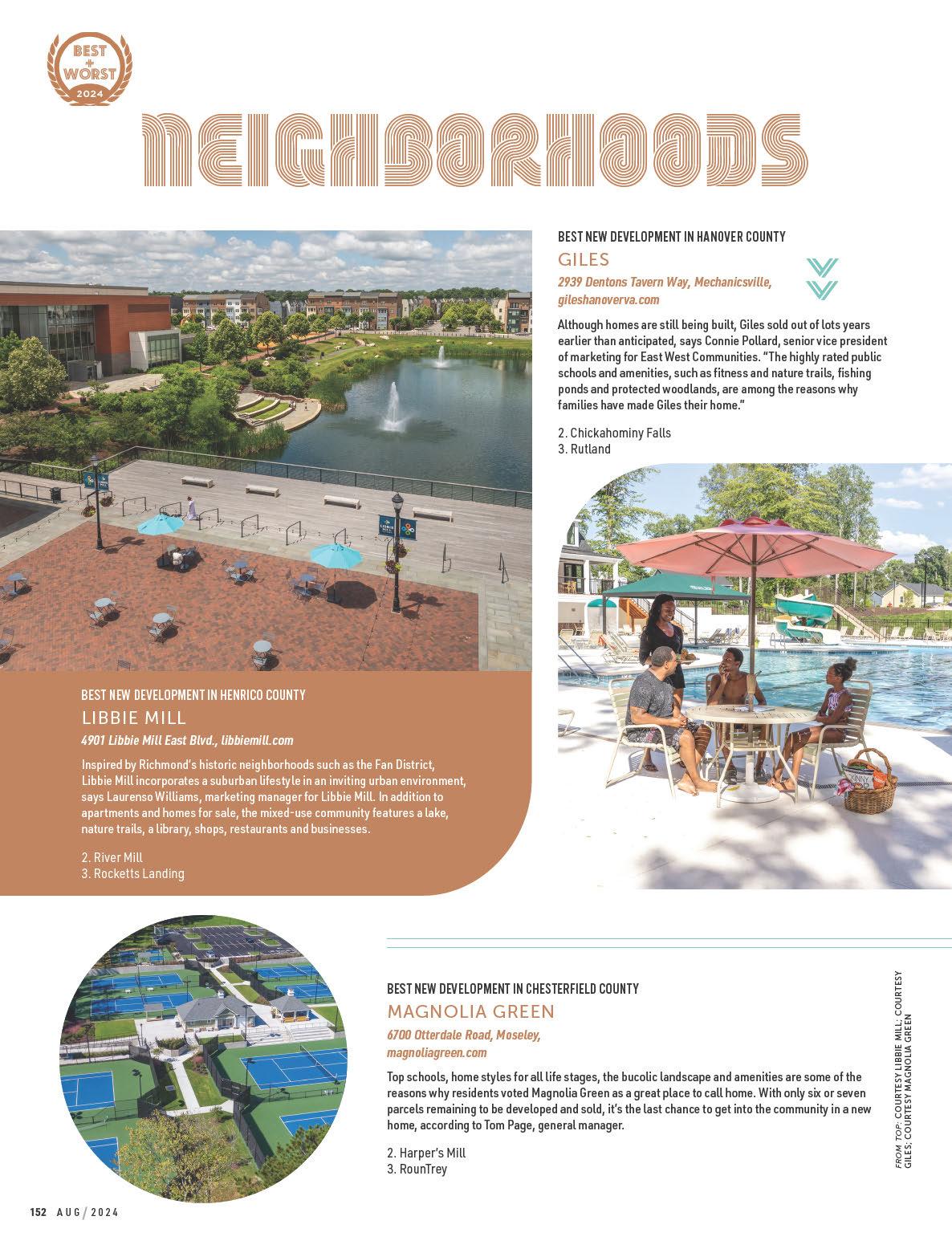


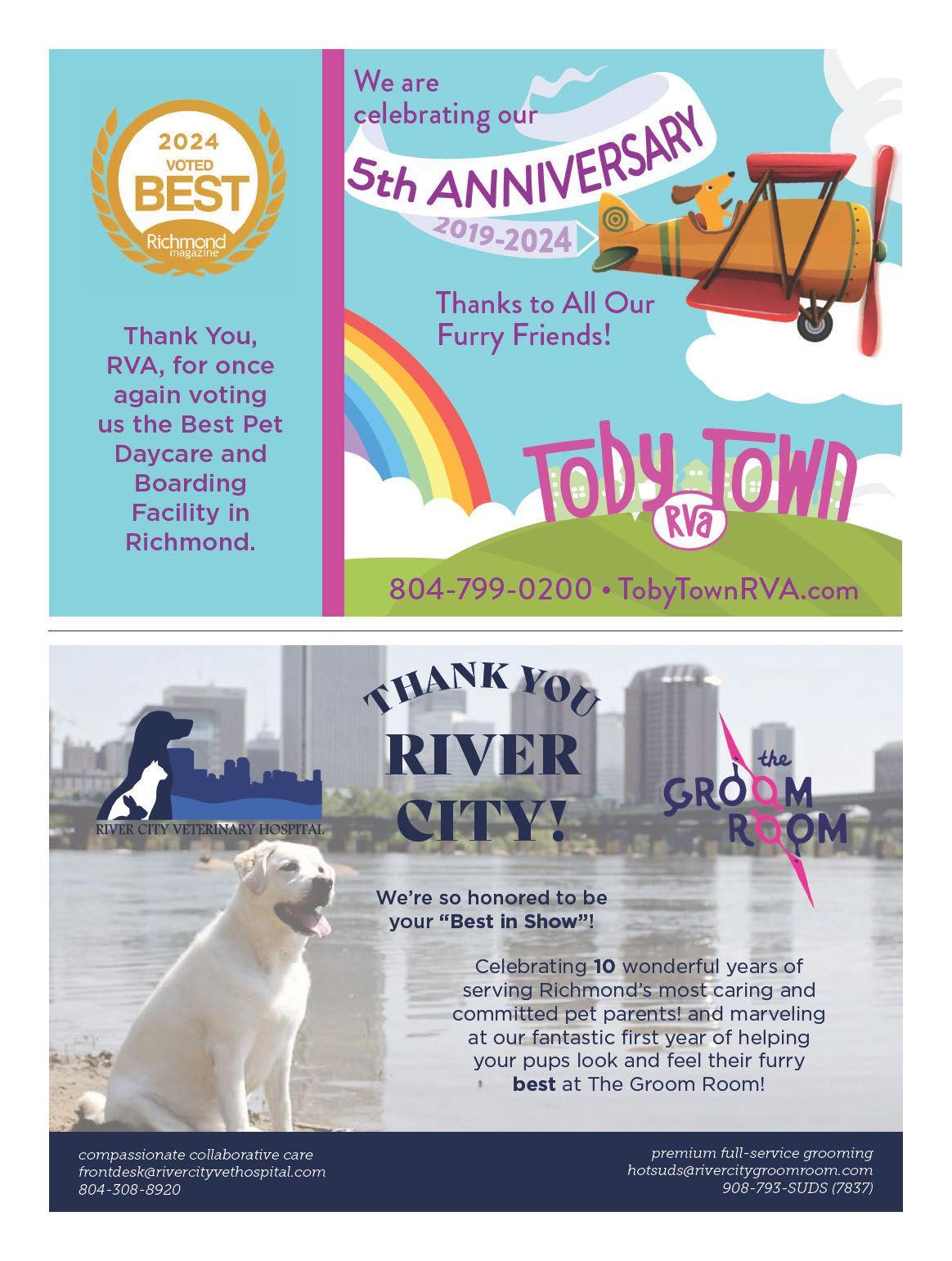
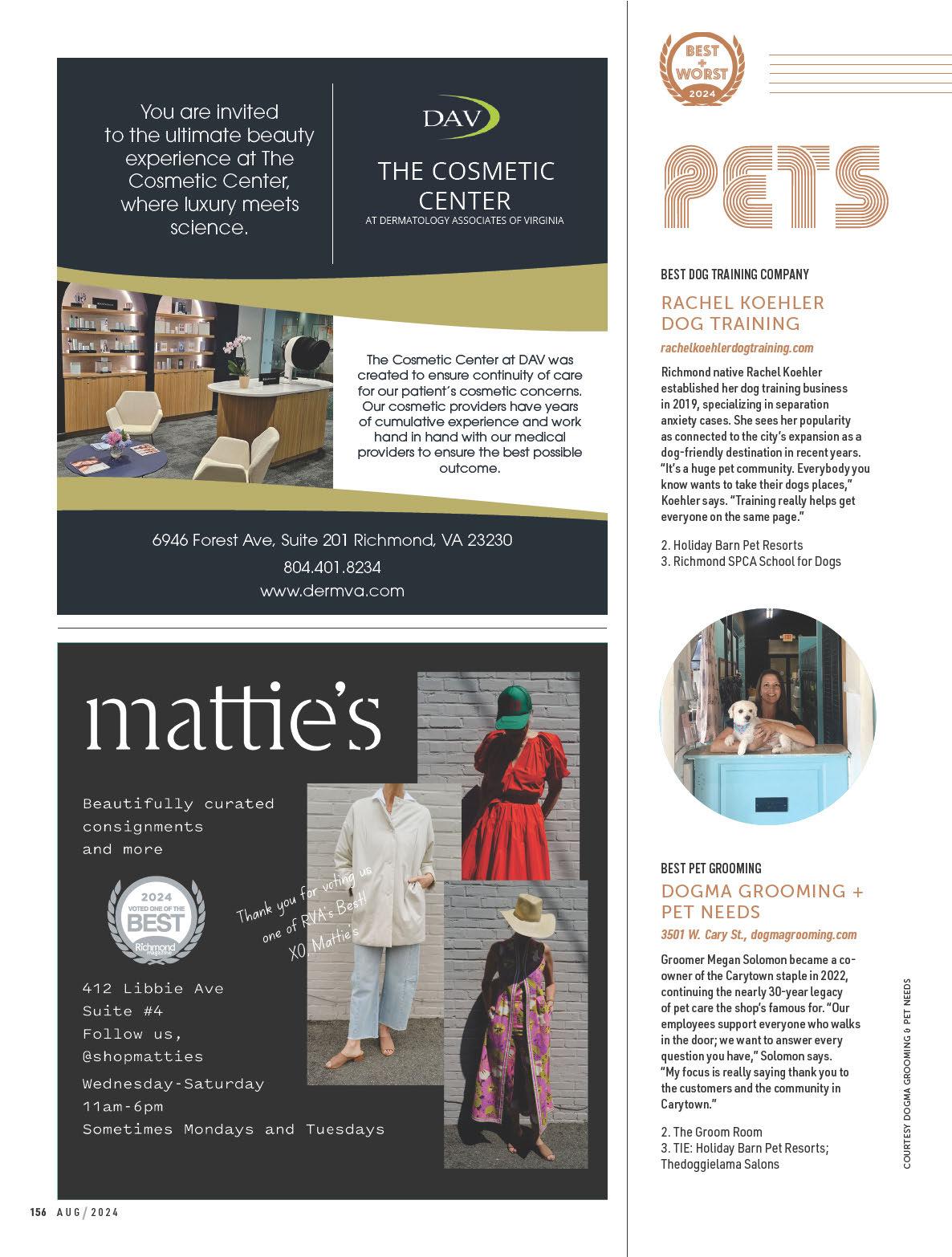
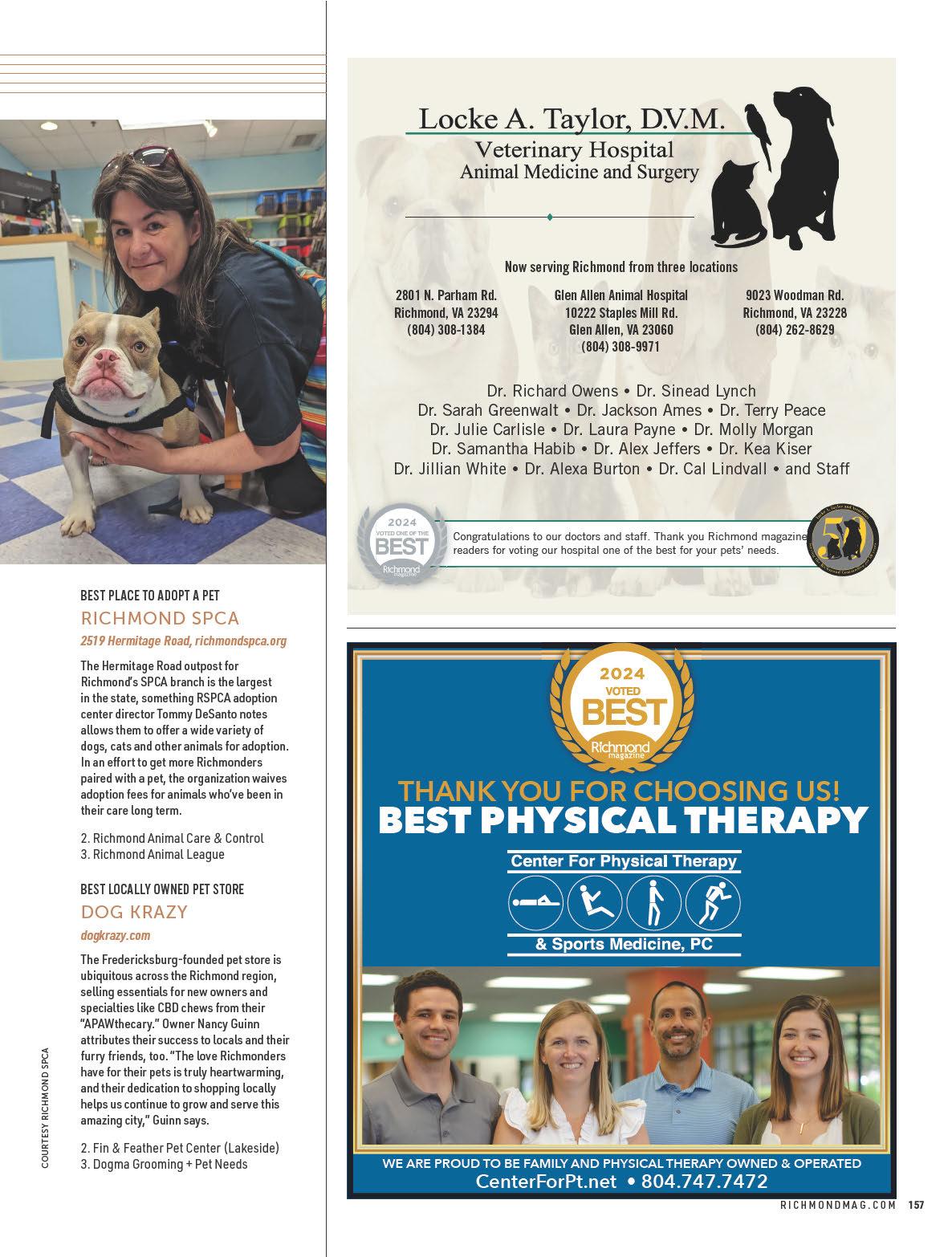

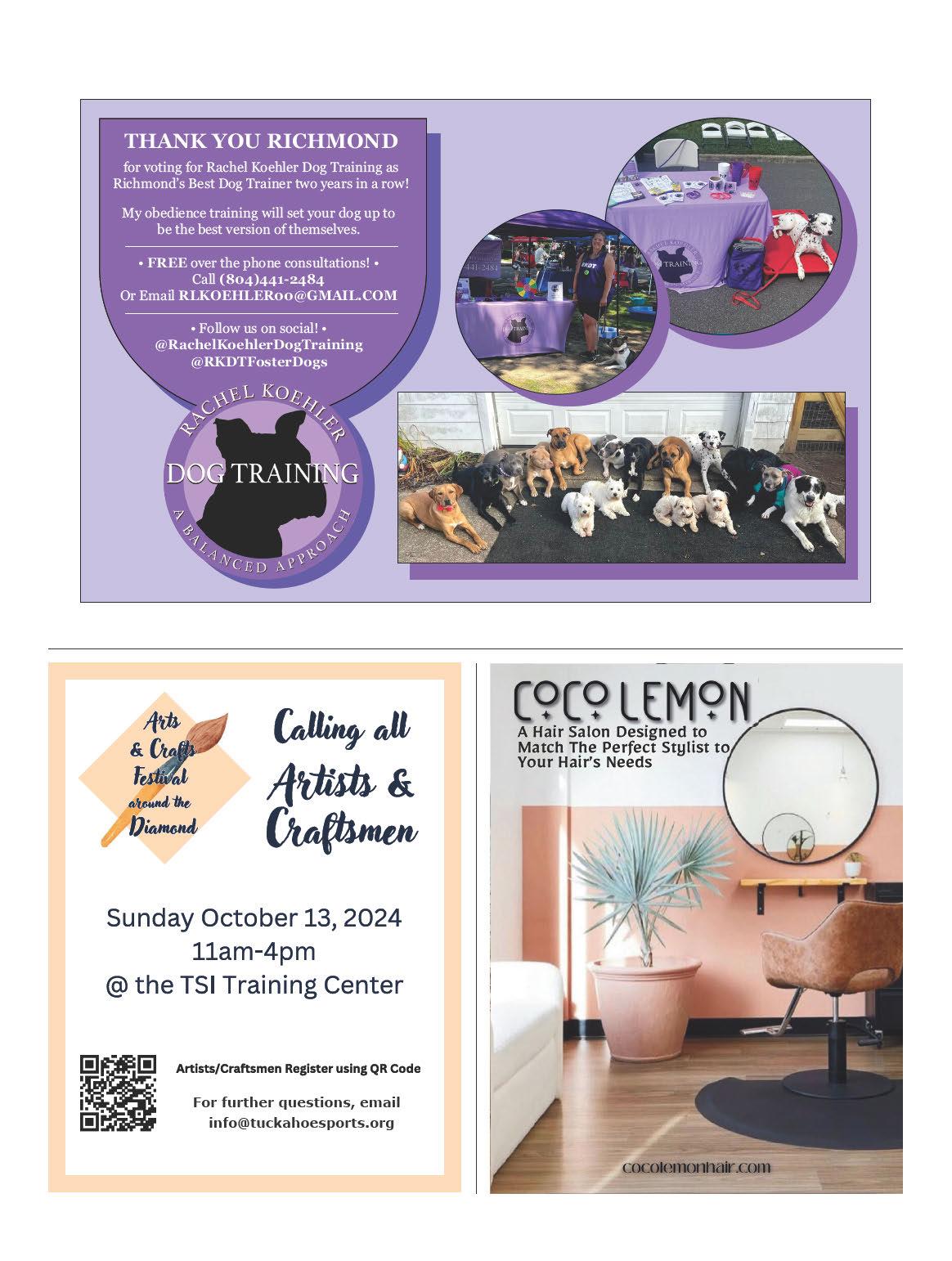


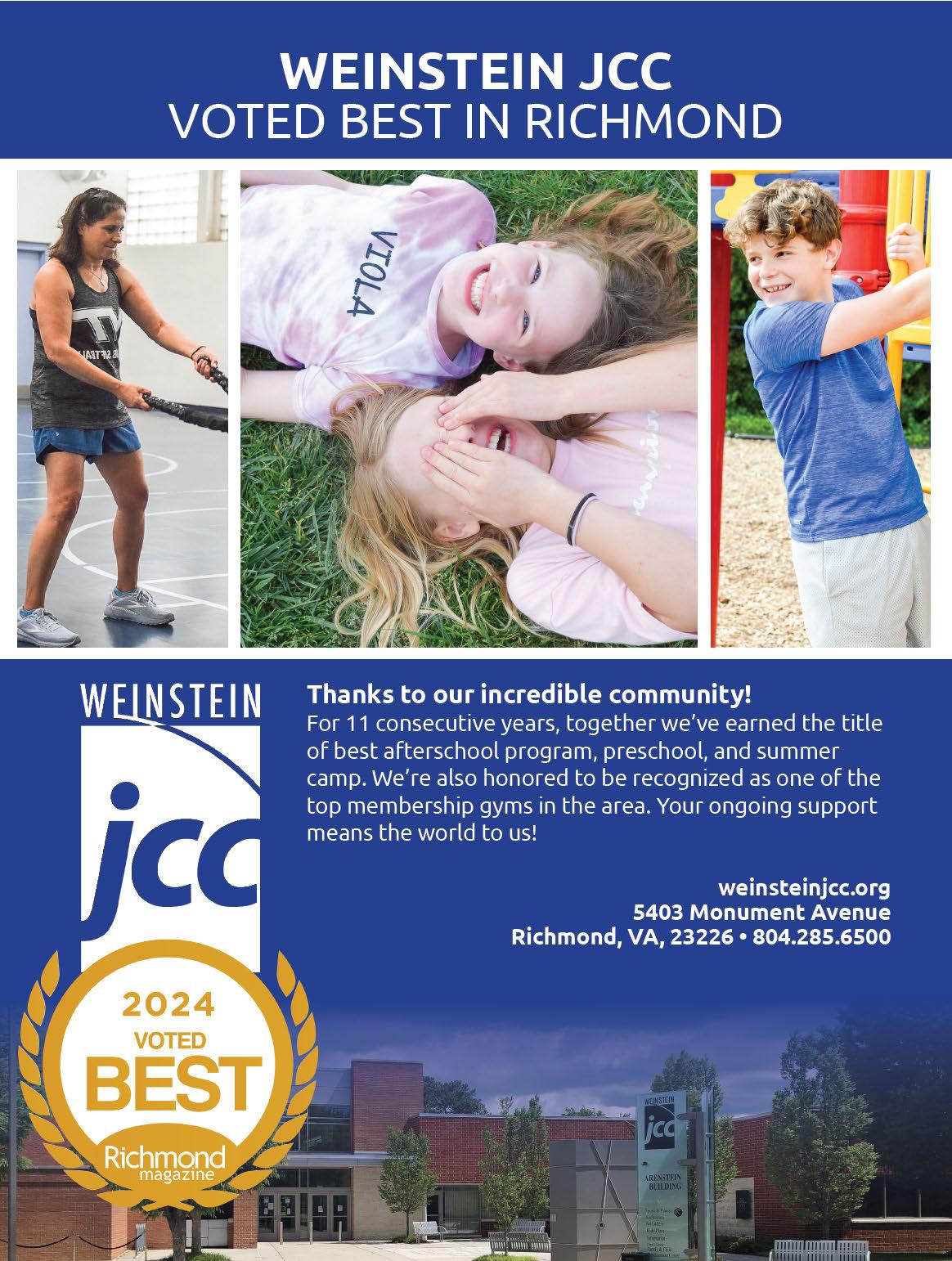


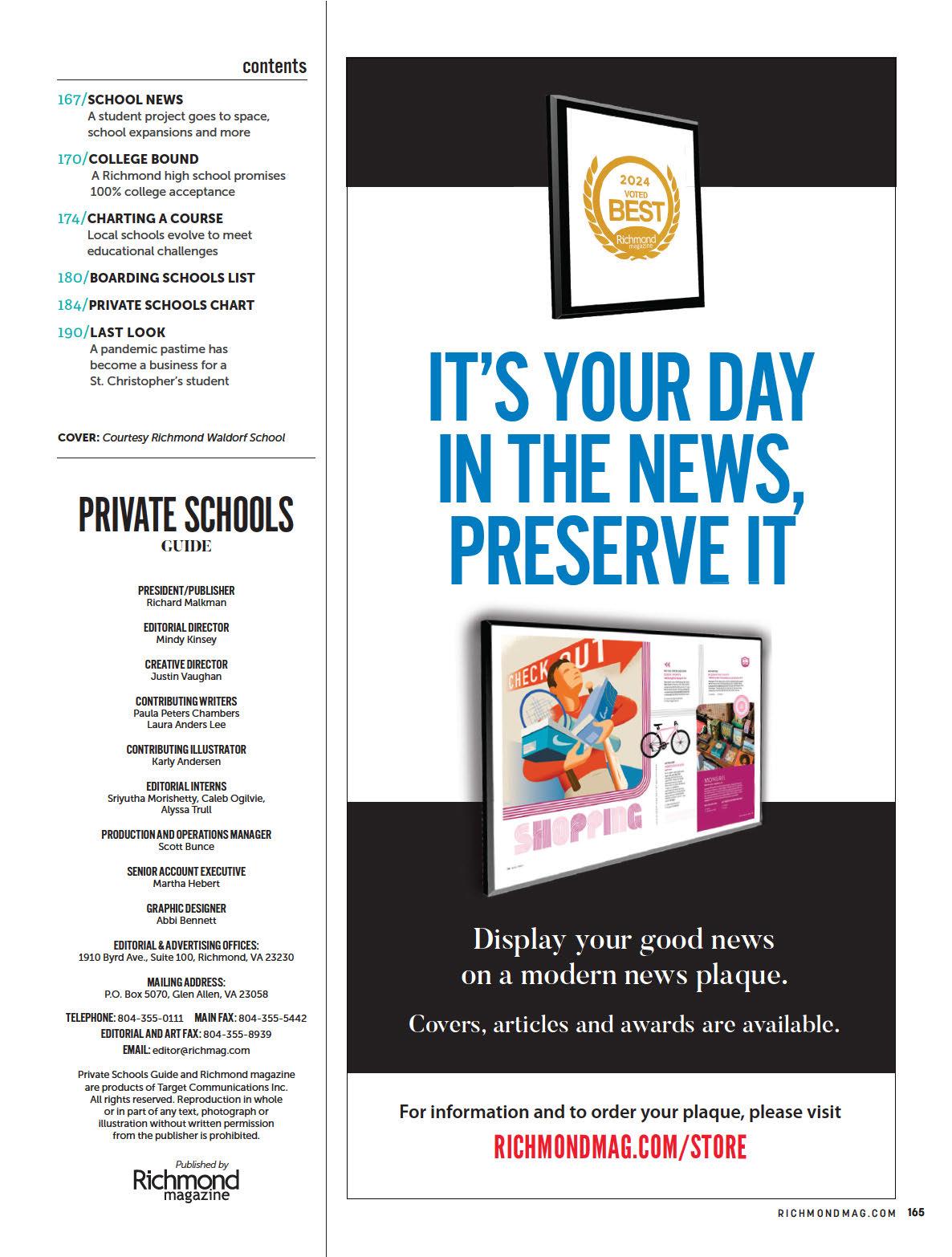

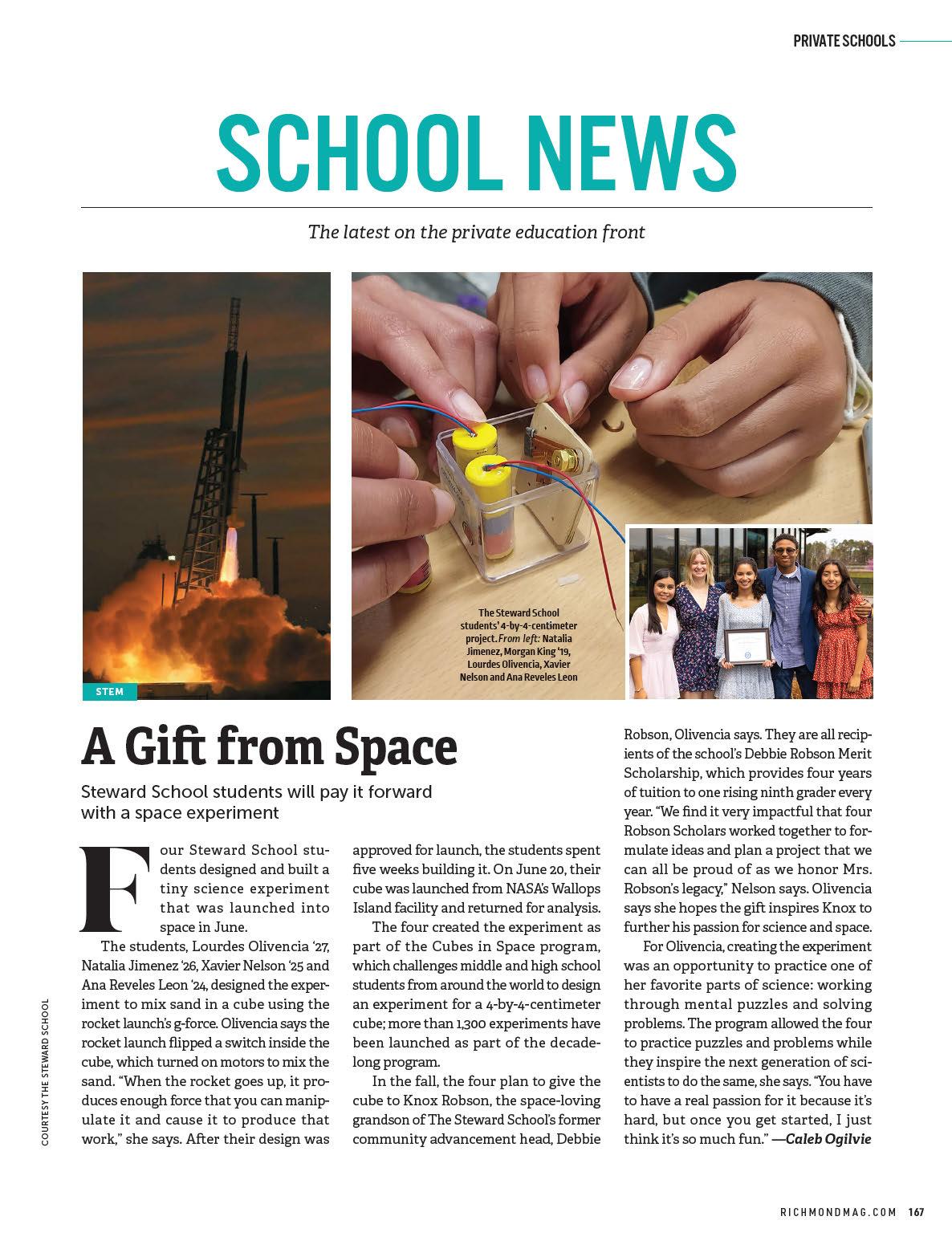
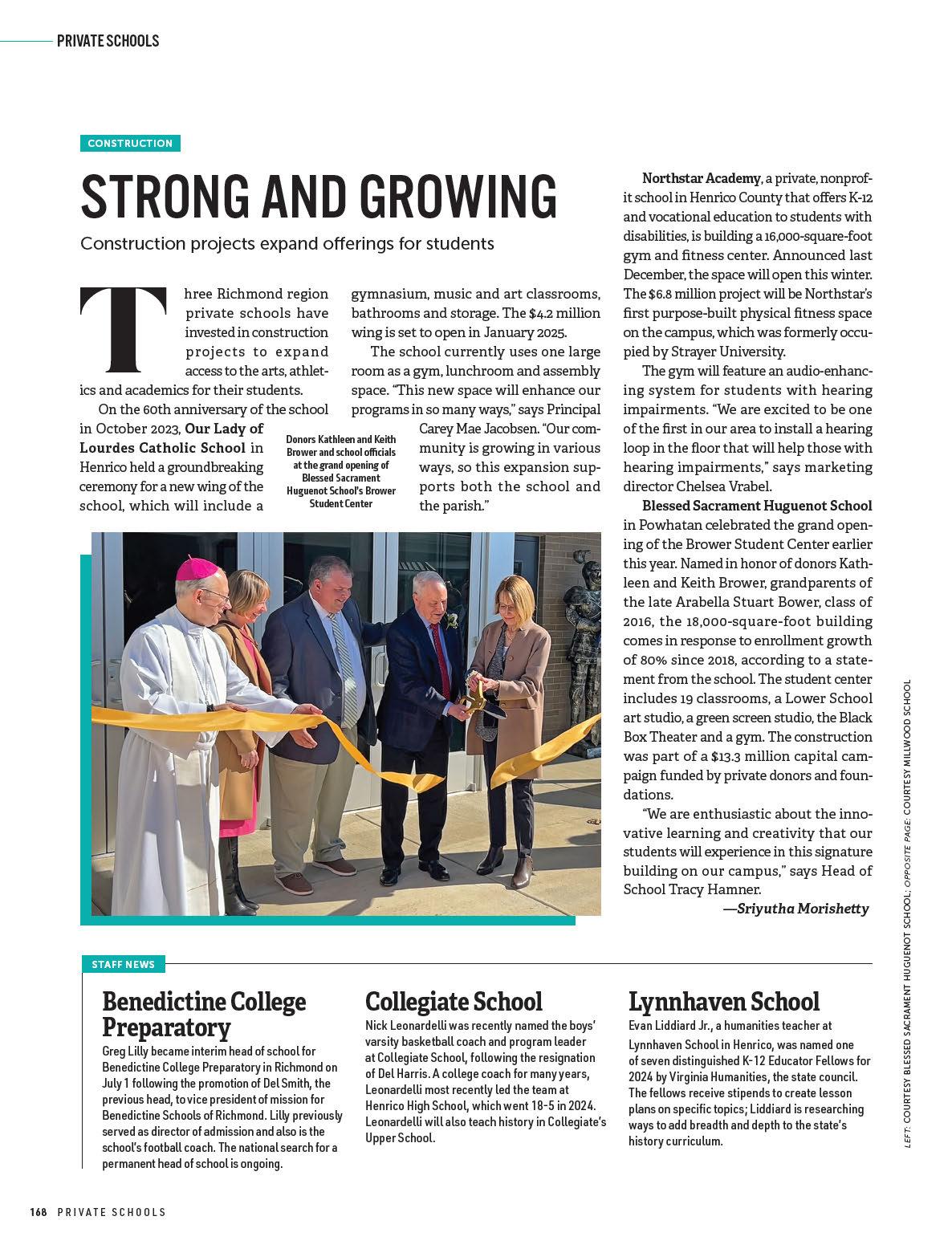




associates want to work for a company that has a purpose, there’s an important workforce development component and these students do really good work in a really cost-effective way. There are multiple ways you win as a corporate work-study partner, in addition to doing something good for the community.”
Class of 2024 graduate Ricardo de la Rosa says working for Davenport & Co., Kinsale Capital Group and Bon Secours Richmond Community Hospital helped steer his career path and prepare him for the real world. He’s earned a scholarship to Virginia Military Institute, where he’ll study civil engineering. “I’m the first in my family to go to college and it feels really good,” he says.
His classmate Jose Bautista says he also made the most of work-study programs. In Dominion Energy’s talent and acquisition department, he noticed which applications made it to the top of the pile, what schools those candidates a ended and what degrees they’d earned. A er a work-study at James River Insurance, they hired him as a summer intern for $17 an hour, which helped him buy a car. At Troutman Pepper law firm, Bautista, who’s the first in his family to attend college, relied on his employers

for guidance.
“Virginia Tech has been my dream school, and I got to meet so many alumni, make connections and get phone numbers,” he says. “When I found out I got a full ride to their aerospace engineering program, one of the ladies there was the first person I told. She got super excited and hugged me. It was really nice because she felt so proud of me.”
When hearing about the many success stories at Cristo Rey, Quinn can’t help but think about all the other kids in Richmond who aren’t afforded the same access to a college preparatory education. “One of the things you realize when you get involved with Cristo Rey is how much talent goes to waste in our city — and it’s just wrong,” he says. “These kids are unbelievably talented and having an environment like Cristo Rey allows them to understand that. The talent is there — it just needs a platform to discover itself.”
Cristo Rey Richmond wants to grow from 240 students to 350. They have the space on the former Benedictine College Prep campus, but to supplement the tuition, they’ll need to sign on 40 more work-study partners. Quinn hopes more companies like his will see the benefit of partnering with Cristo Rey.
“Richmond has tremendous resources for economically disadvantaged kids, whether it’s daycares, a erschool programs and middle school education, but we’ve never had a high school like this,” he says. “It’s the last mile in the pipe — this is why Cristo Rey is so important.”

By PAULA PETERS CHAMBERS
Change is a constant in schools. Beyond the obvious — students are ever-growing individuals with specific needs and interests — educational philosophies continue to evolve in response to societal, governmental, business and parental demands.The COVID-19 pandemic upended education in a manner unseen for generations. Richmond magazine reached out to several local schools that follow well-established curricula to see how — or if — their approach has shifted.

RICHMOND WALDORF SCHOOL
1301 Robin Hood Road; 804-377-8024, richmondwaldorf.com
Following the approach of Austrian scientist and philosopher Rudolf Steiner, who began teaching the children of factory workers in Stu gart, Germany, in 1919, the Richmond Waldorf School focuses on multisensory experiences, the beauty of the natural world, the power of community and le ing children learn at their own pace.
“Waldorf was created as a response to the first world war,” notes Alexandra Porr Mazeres, the school’s marketing and advancement specialist. “We talk about the head, the heart, the hands — integrating the body and mind. We talk about an education model that will help people build relationships that connect [people].”
To that end, teachers move upward in grade level with their class, a practice called looping. Mazeres’ son had the same lead teacher from first through fi h grades. One teacher just finished a loop that ran from first through eighth grades; in the fall, the teacher returns to
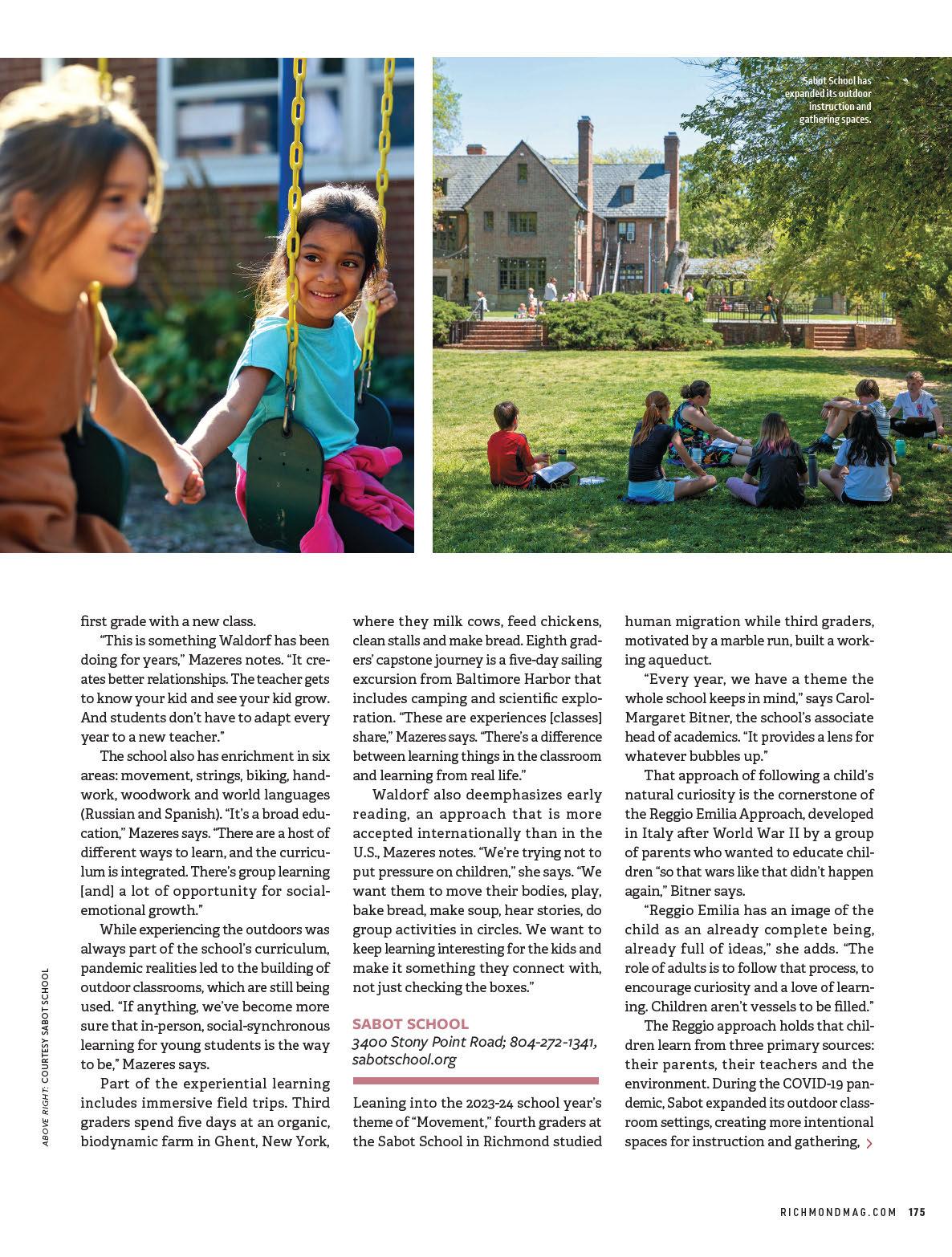

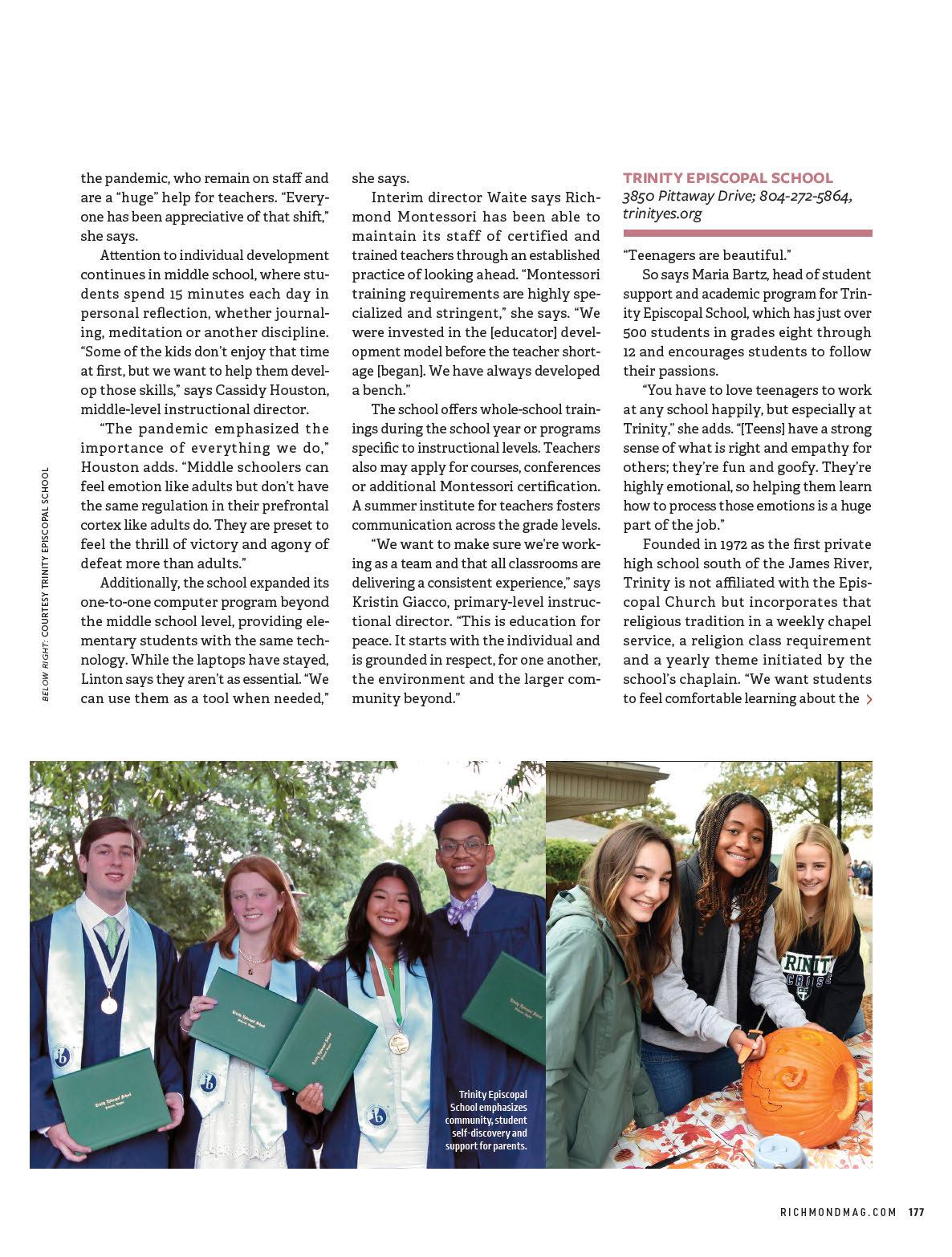





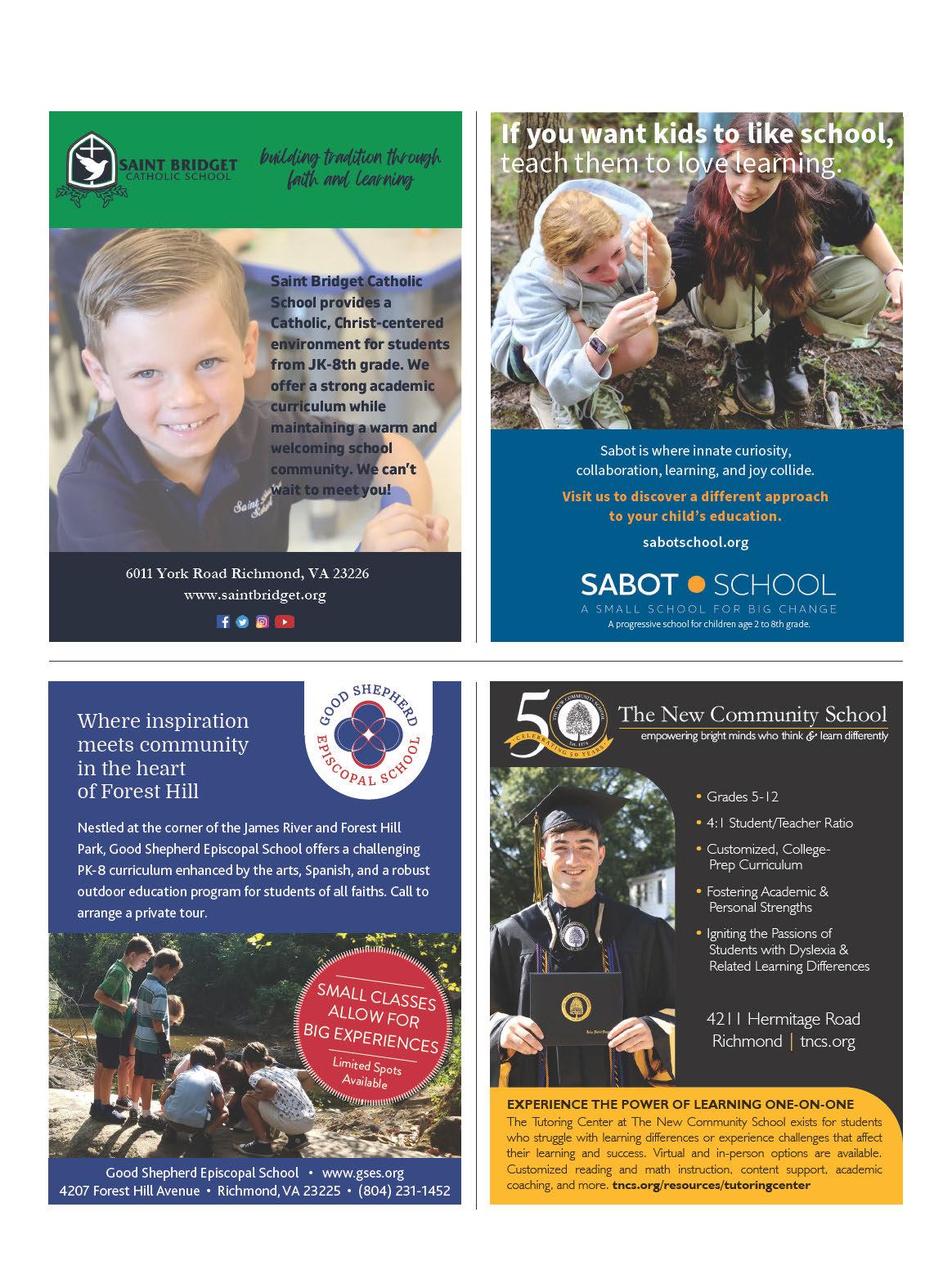


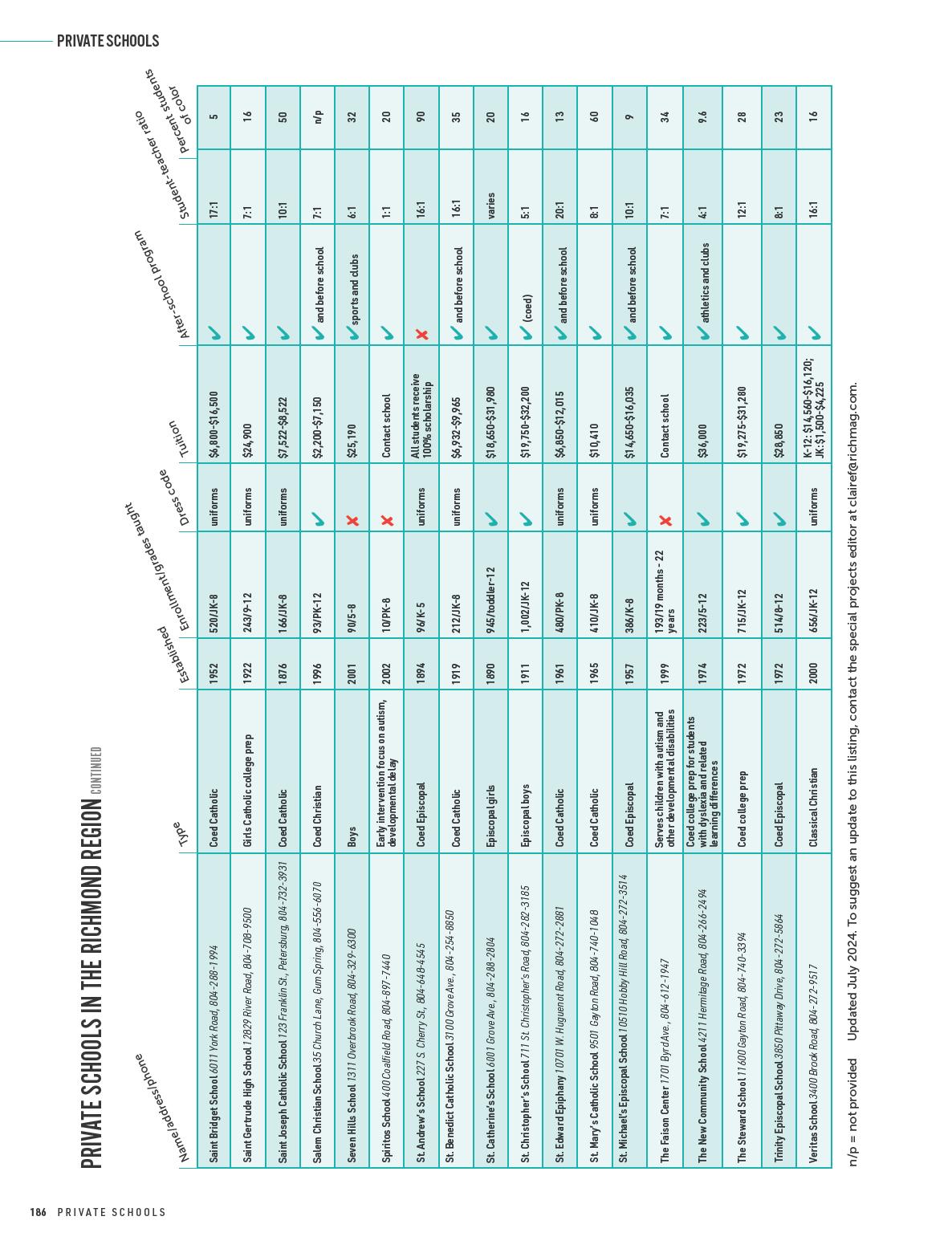
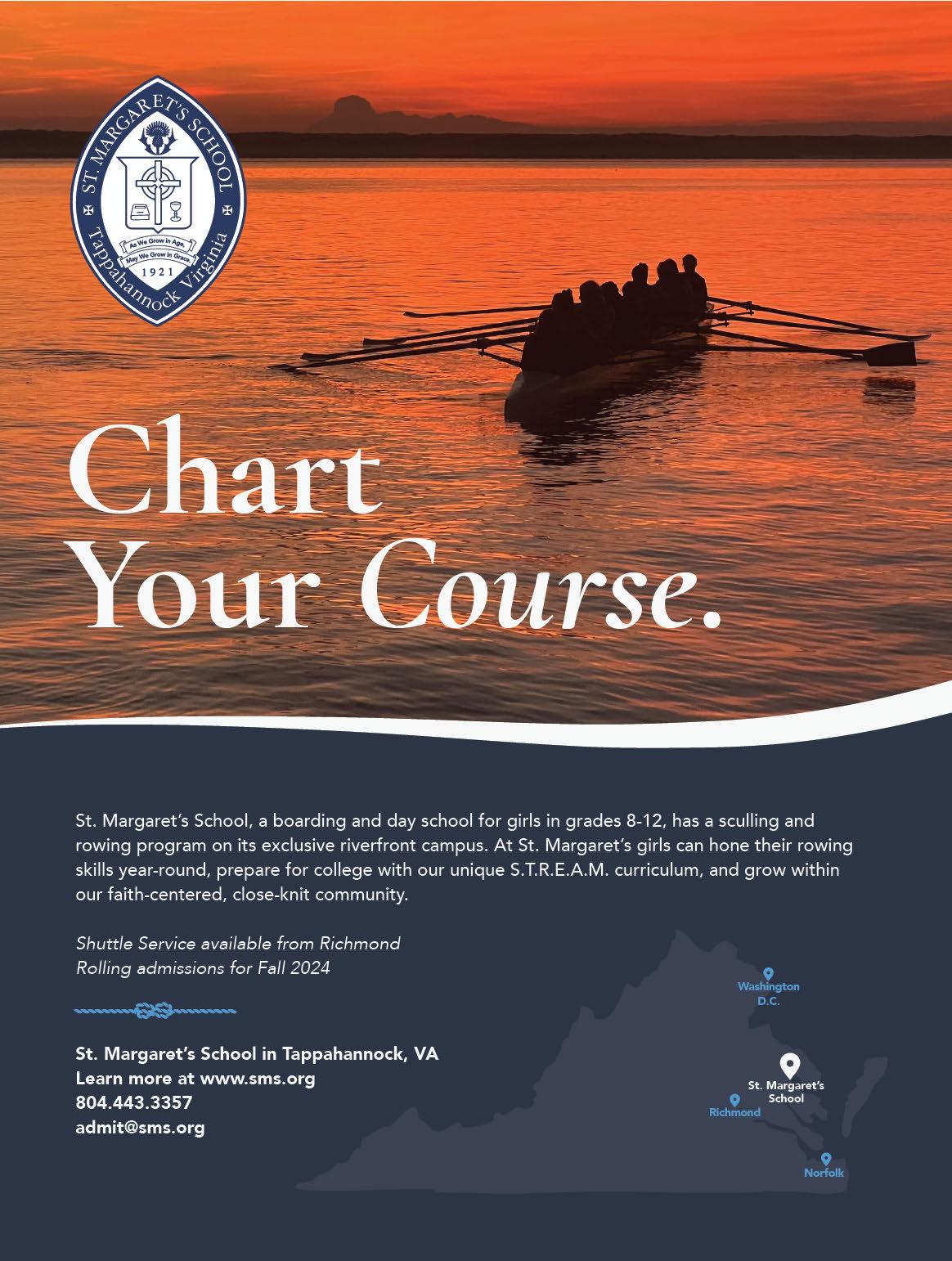





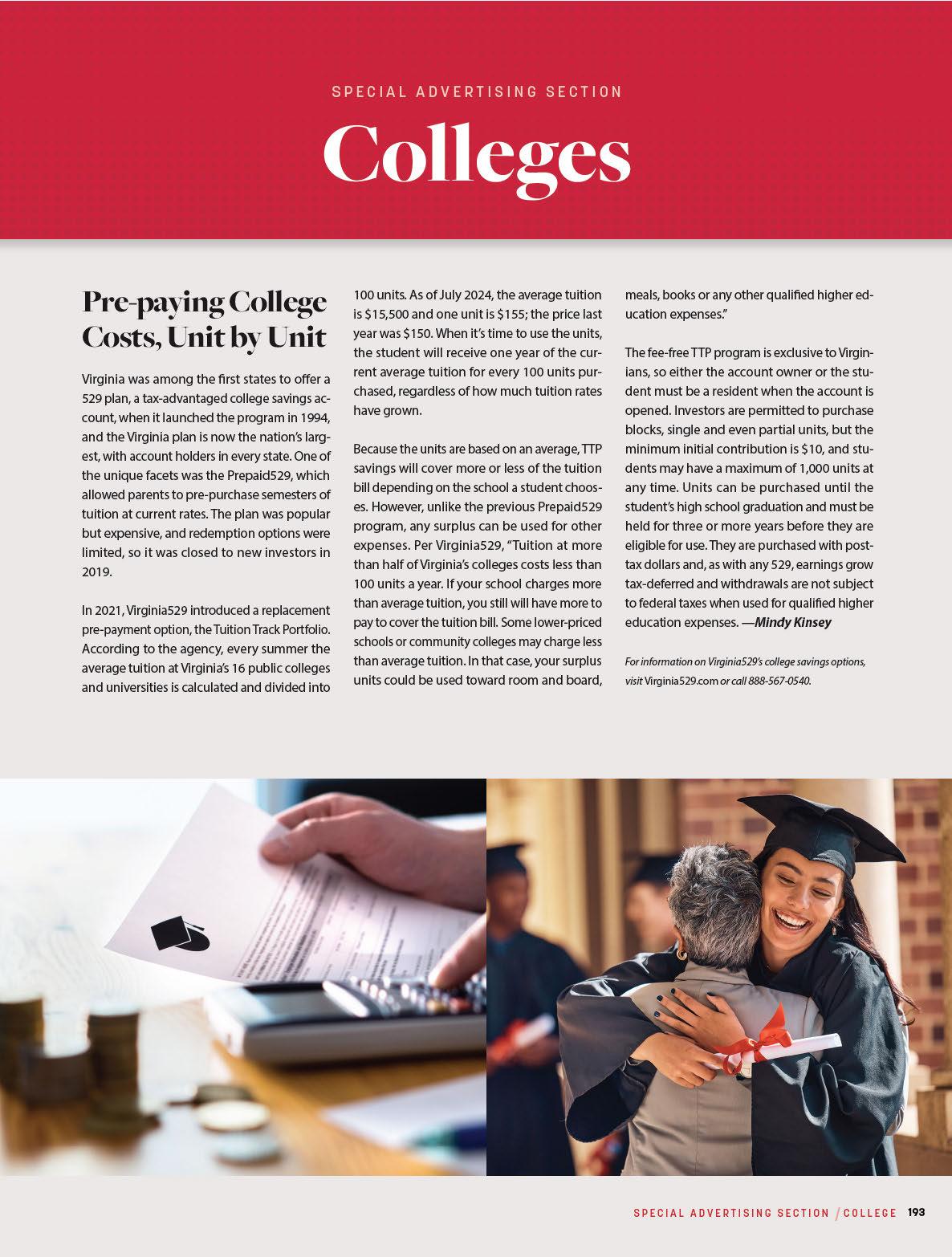
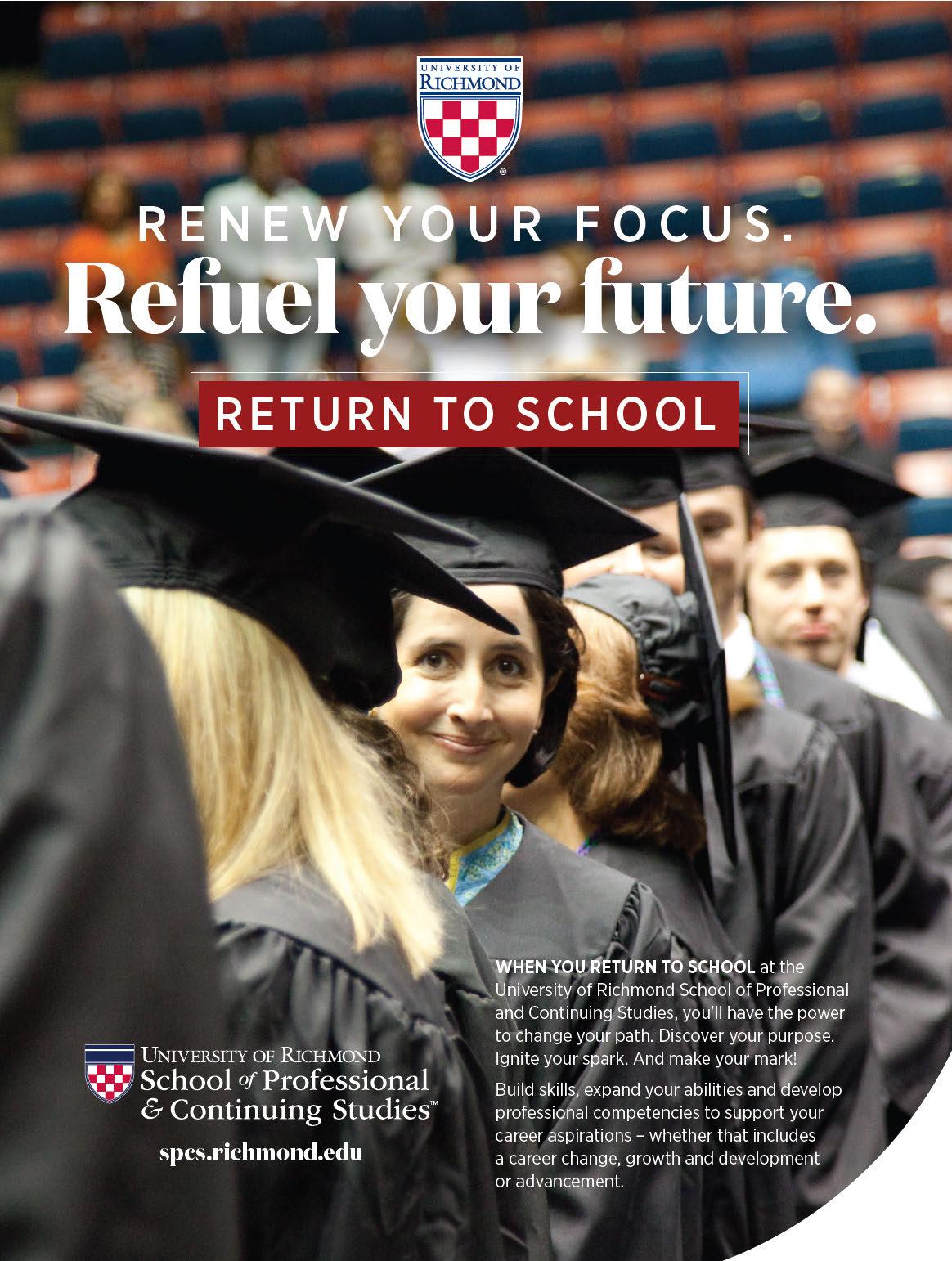
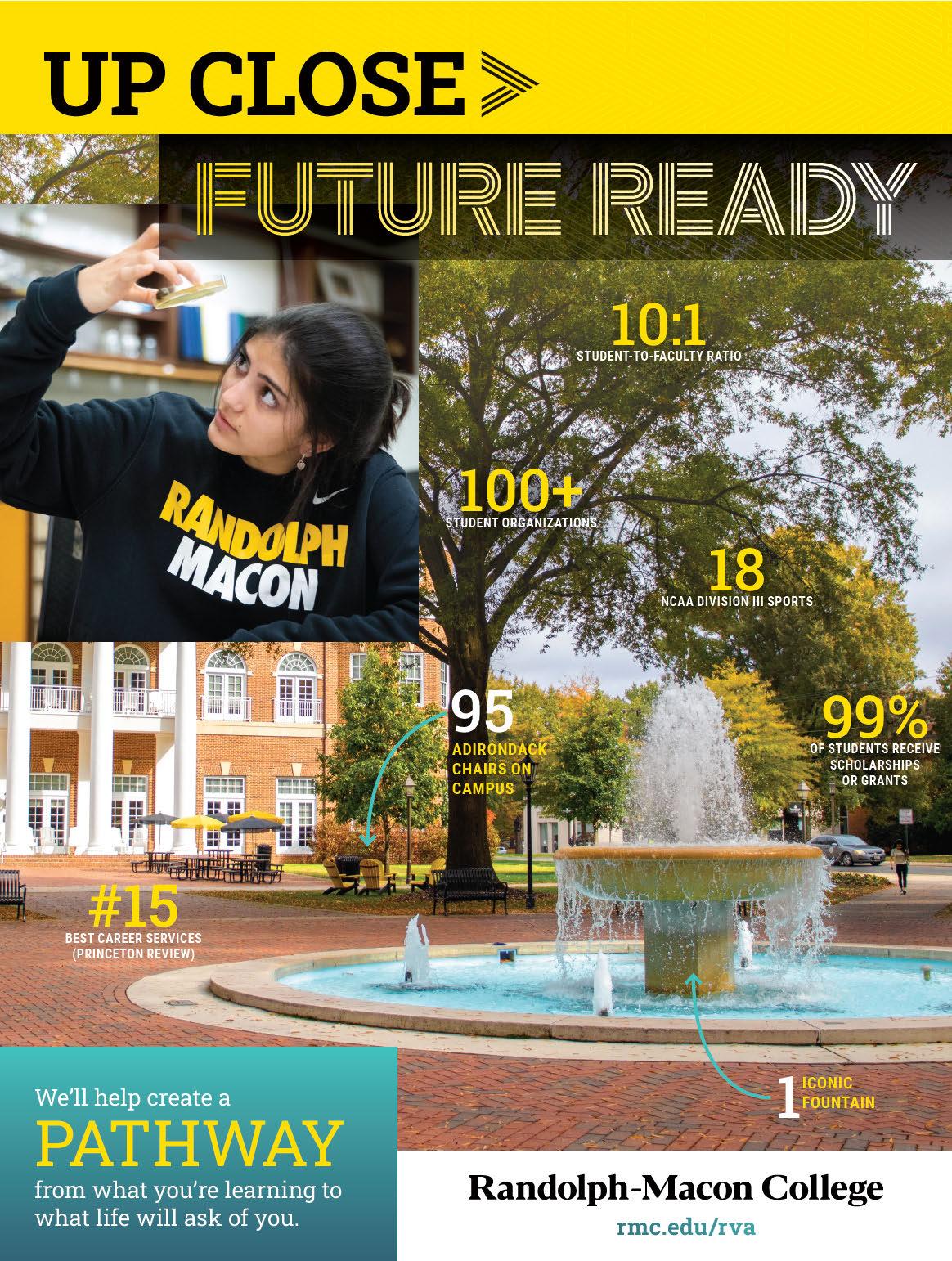
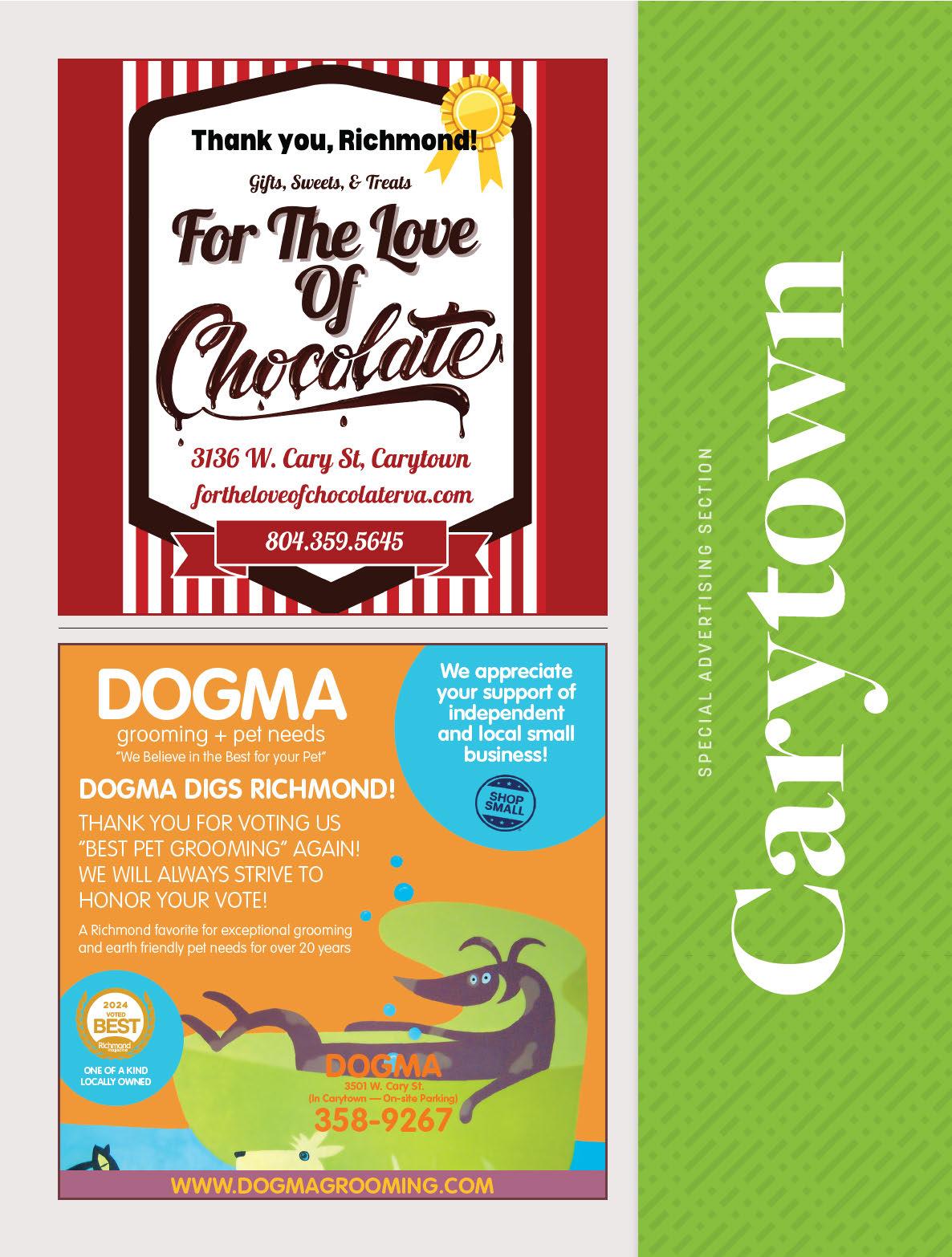


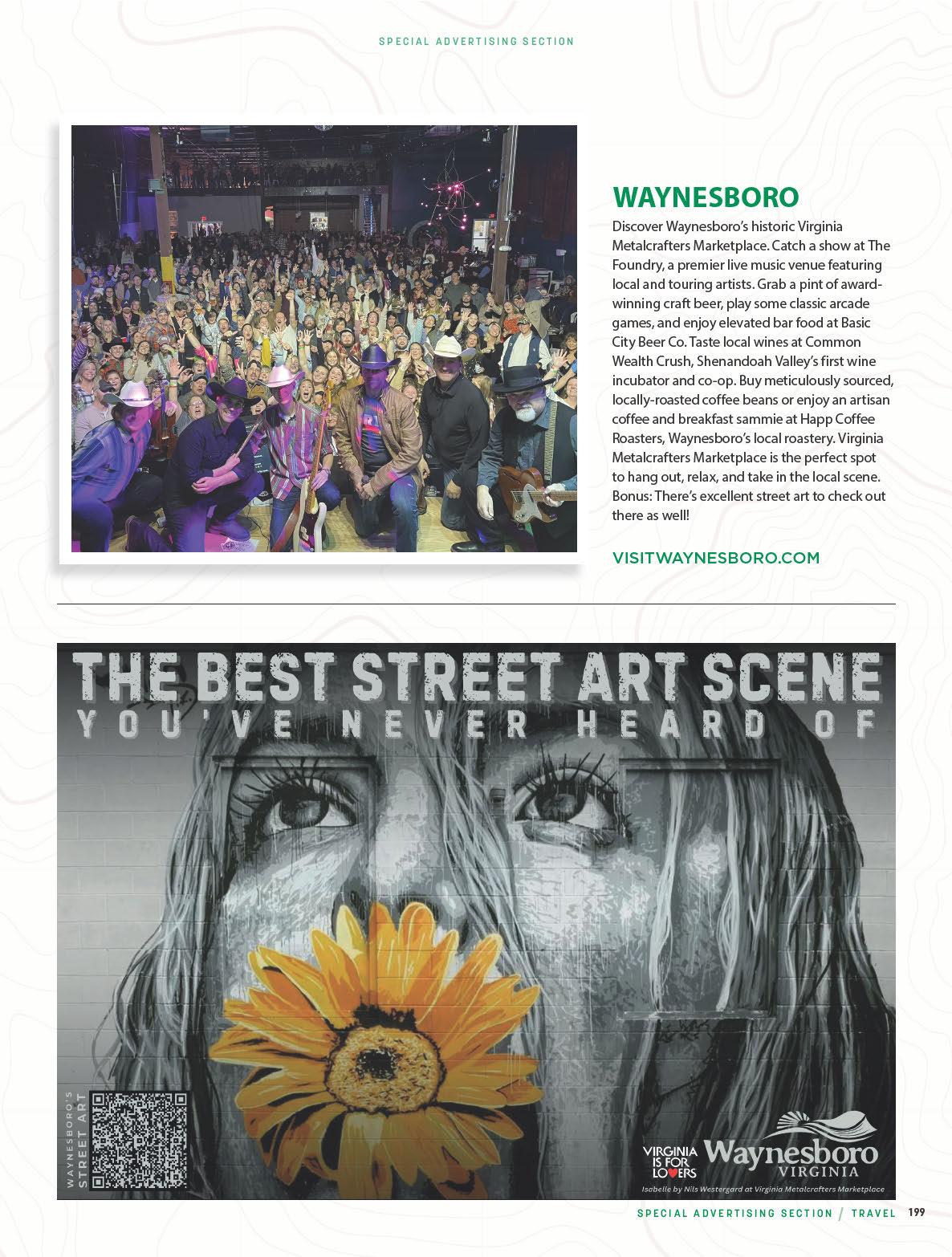

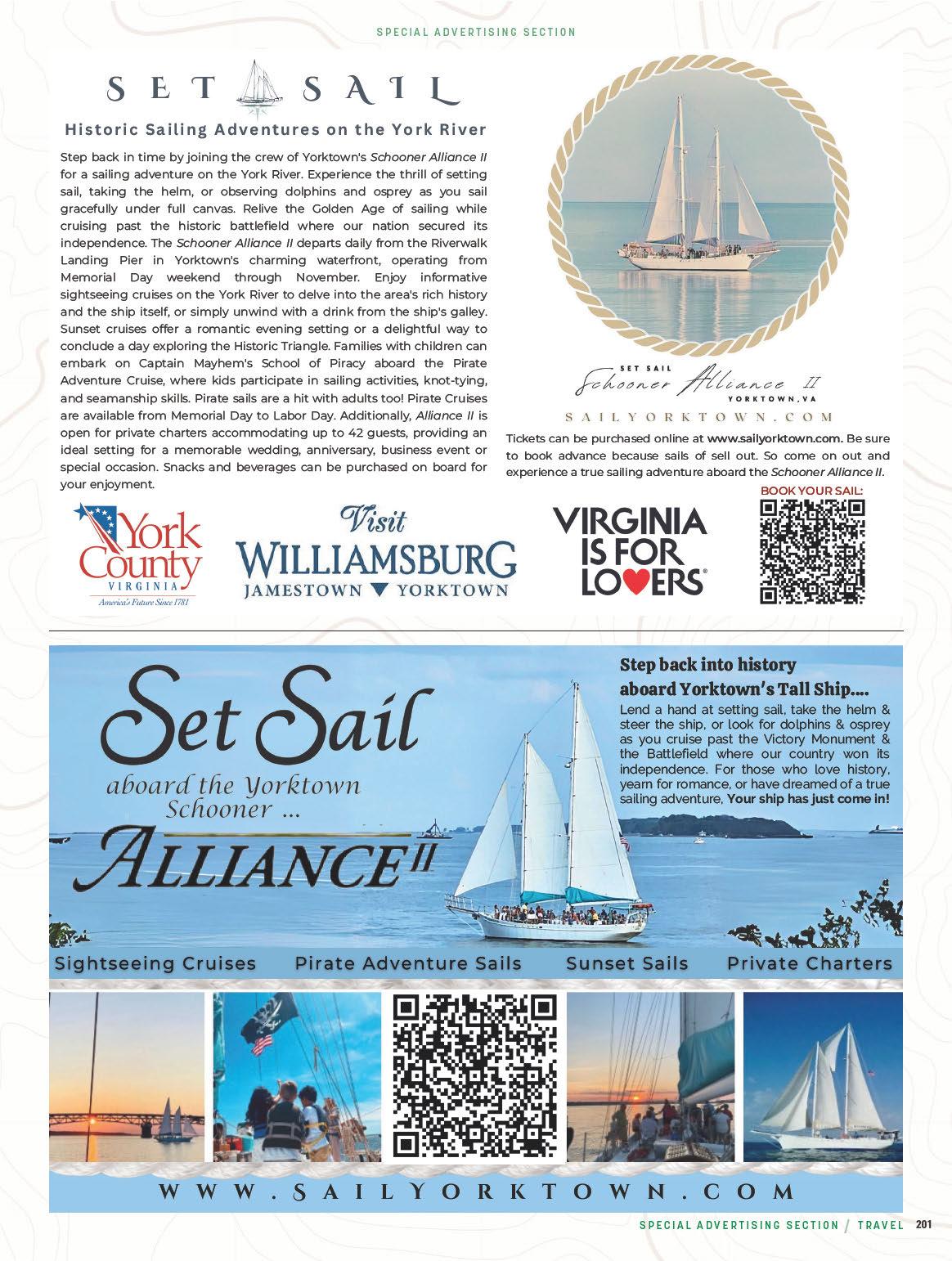
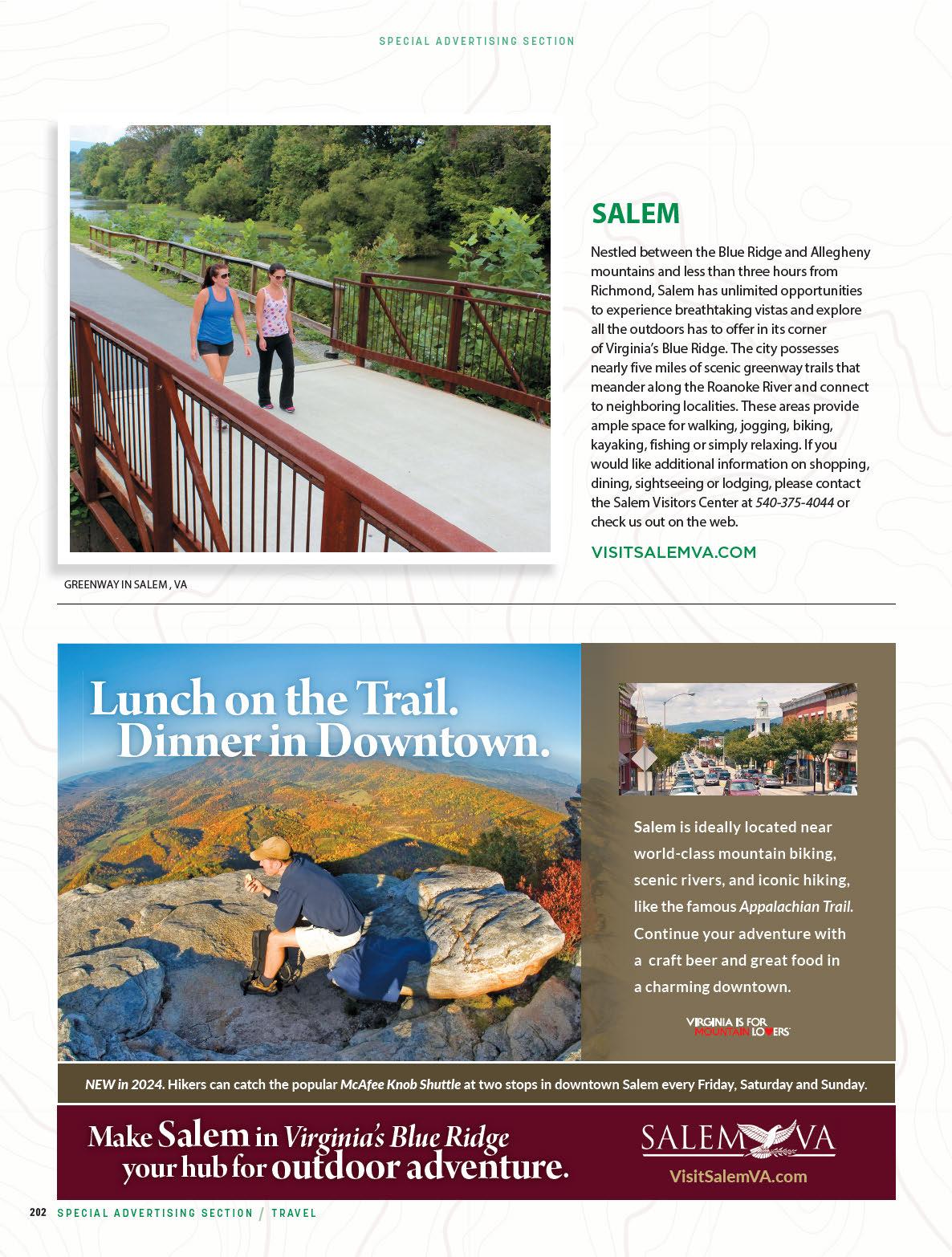
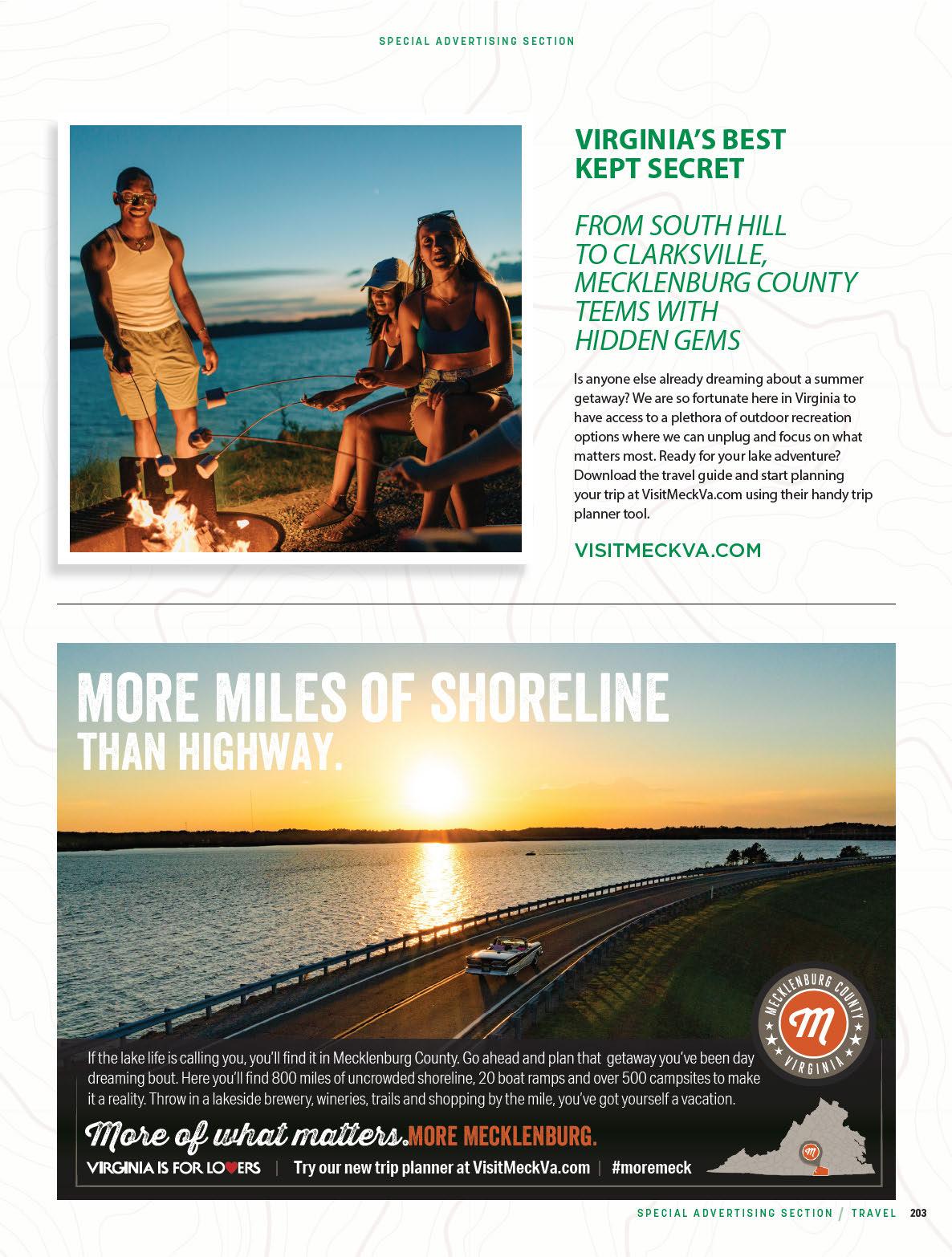

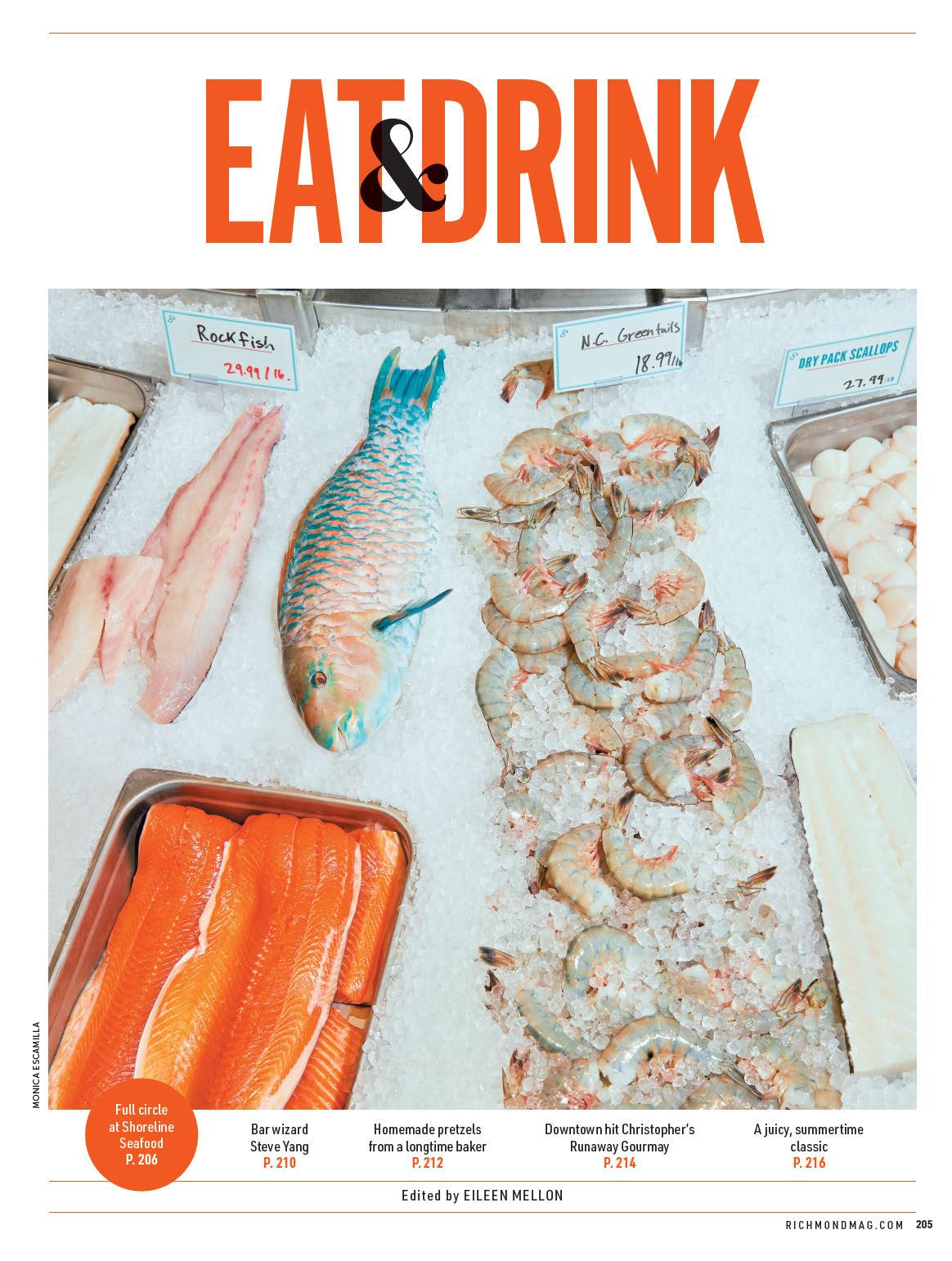
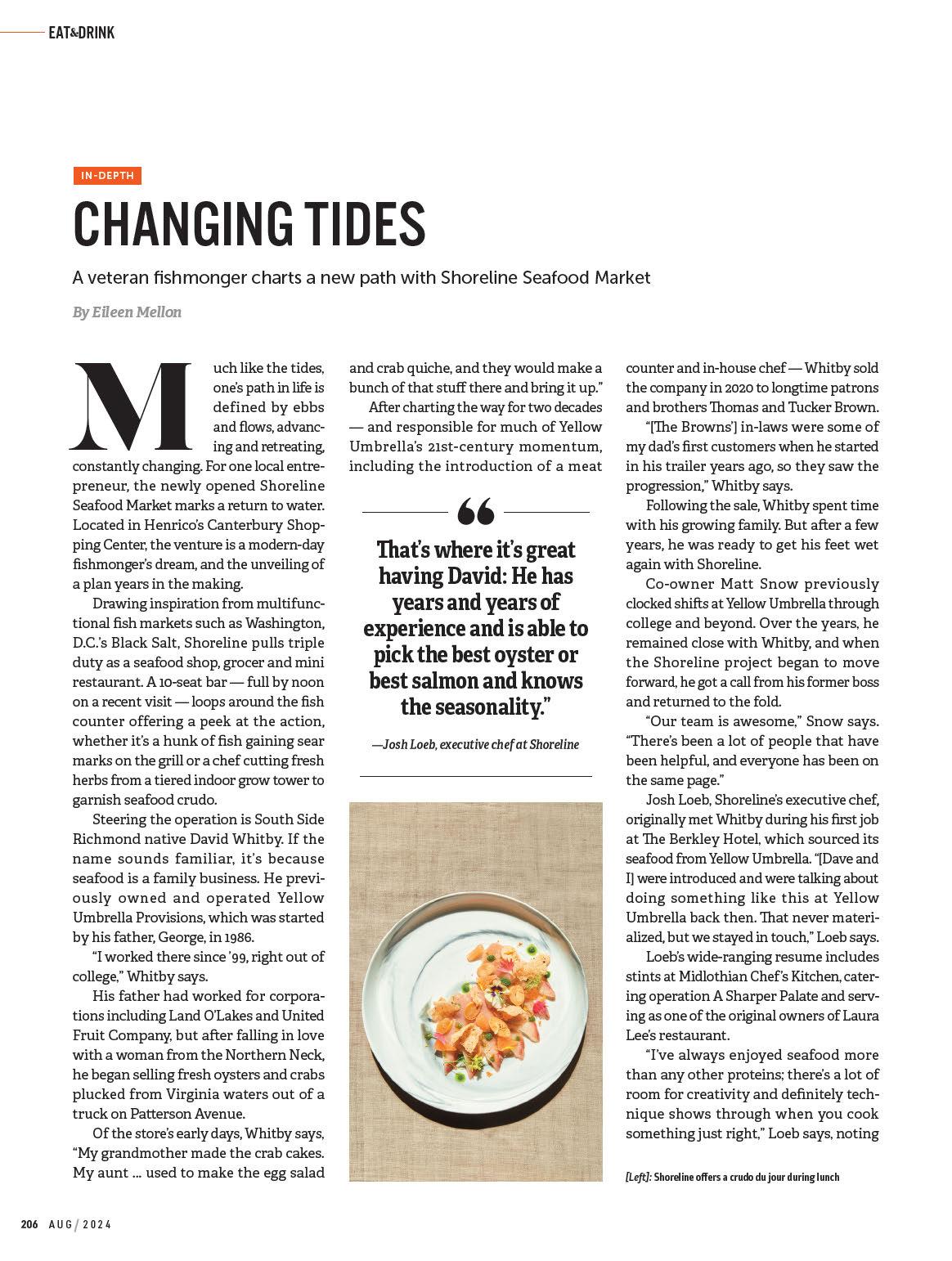

that he draws influence from Asian and Mediterranean cuisines. “That’s where it’s great having David: He has years and years of experience and is able to pick the best oyster or best salmon and knows the seasonality.”
Although the menu is ever-changing, during lunch, diners can usually expect jumbo lump blue crab served on a bu ery roll, a grilled catch of the day, and the popular and perfectly shareable sticky rice fries — crisped rice cooked with ginger, scallions and yuzu spices, formed into logs, fried and served with a side of creamy, heat-tinged Shark Sauce.
If you’re looking for the freshest fish in the house, opt for the crudo du jour. An early-summer version featured hama-
chi with crisp celery hearts, slivers of daikon radish, crushed pork rinds and dots of housemade Fresno hot sauce.
Specials double as ways to showcase a prime catch and utilize the whole fish. They’ve included a smoked seafood sausage sandwich — topped with fennel giardiniera, zippy Spanish guindilla peppers and mustard — and an ode to Brunswick stew dubbed Fishwick Stew, studded with grilled fish and shellfish.
For shoppers, crushed ice cradles li leneck clams and local oysters, tiger prawns, tuna steaks and slabs of toro, swordfish, Ruby snapper, halibut, and scallops in the fish case. ere are also frozen crab legs, lobster tails, octopus, a he y collection of tinned fish, and plenty of grab-and-go
items such as grilled tuna salad.
Shoreline plans to introduce dinnner service, a no-substitution, multi-course tasting menu curated by Loeb, at the end of the month. A preview dish plated white anchovy with celery root remoulade, pickled shallots and capers.
And while stepping into the local waters again has been exciting, Whitby says there were some initial moments of uncertainty. “Leading up and building out the design, that was great, but opening the door, it took me a minute to be like, ‘Is this right, is this a good idea?’” he says. “But no, it’s been great, I wasn’t ready to give it up. is is something di erent that Richmond hadn’t had. We’ll do this for a bit and hopefully can scale it; we’ll see how it takes o a er a few years.” R
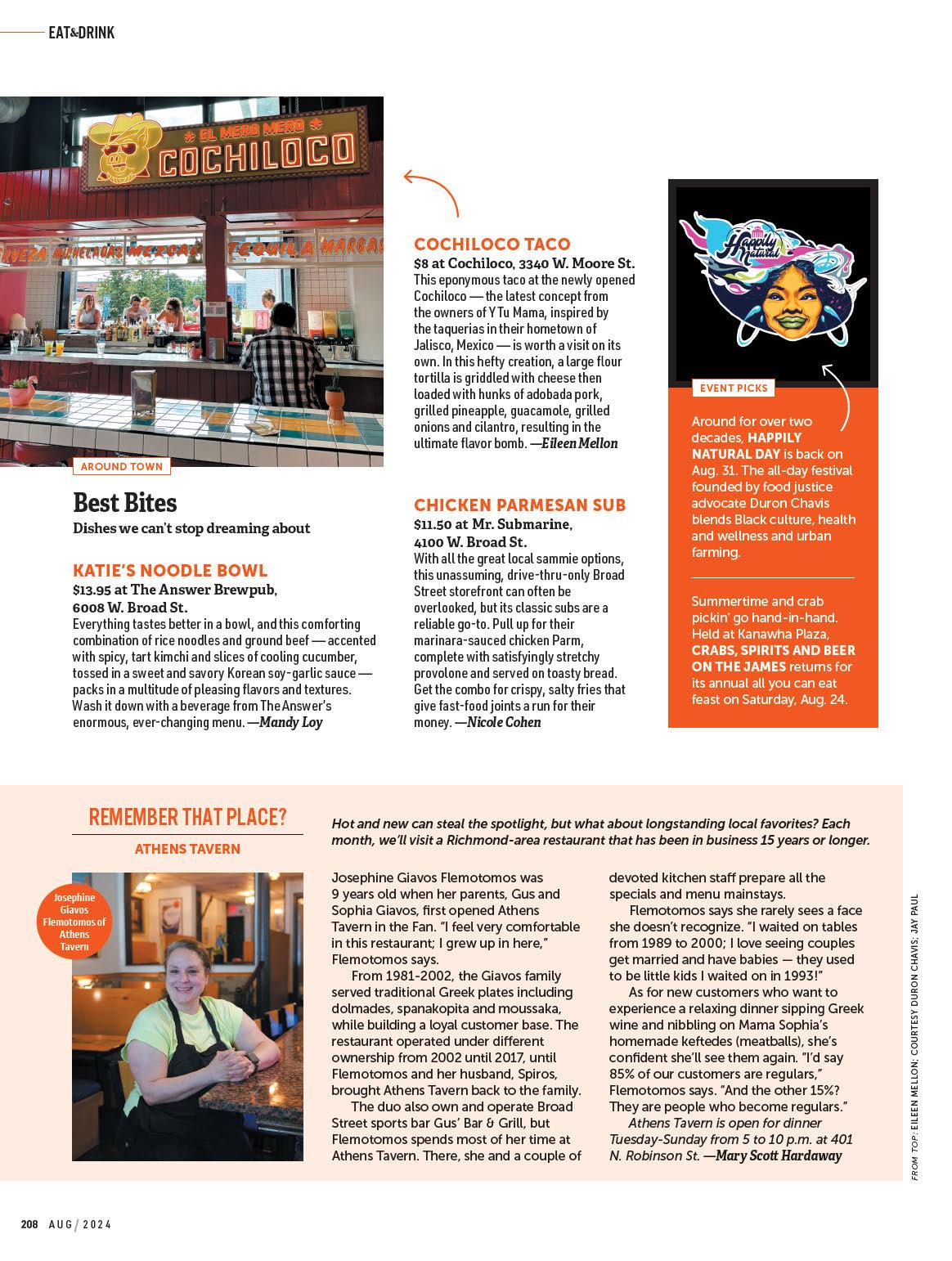
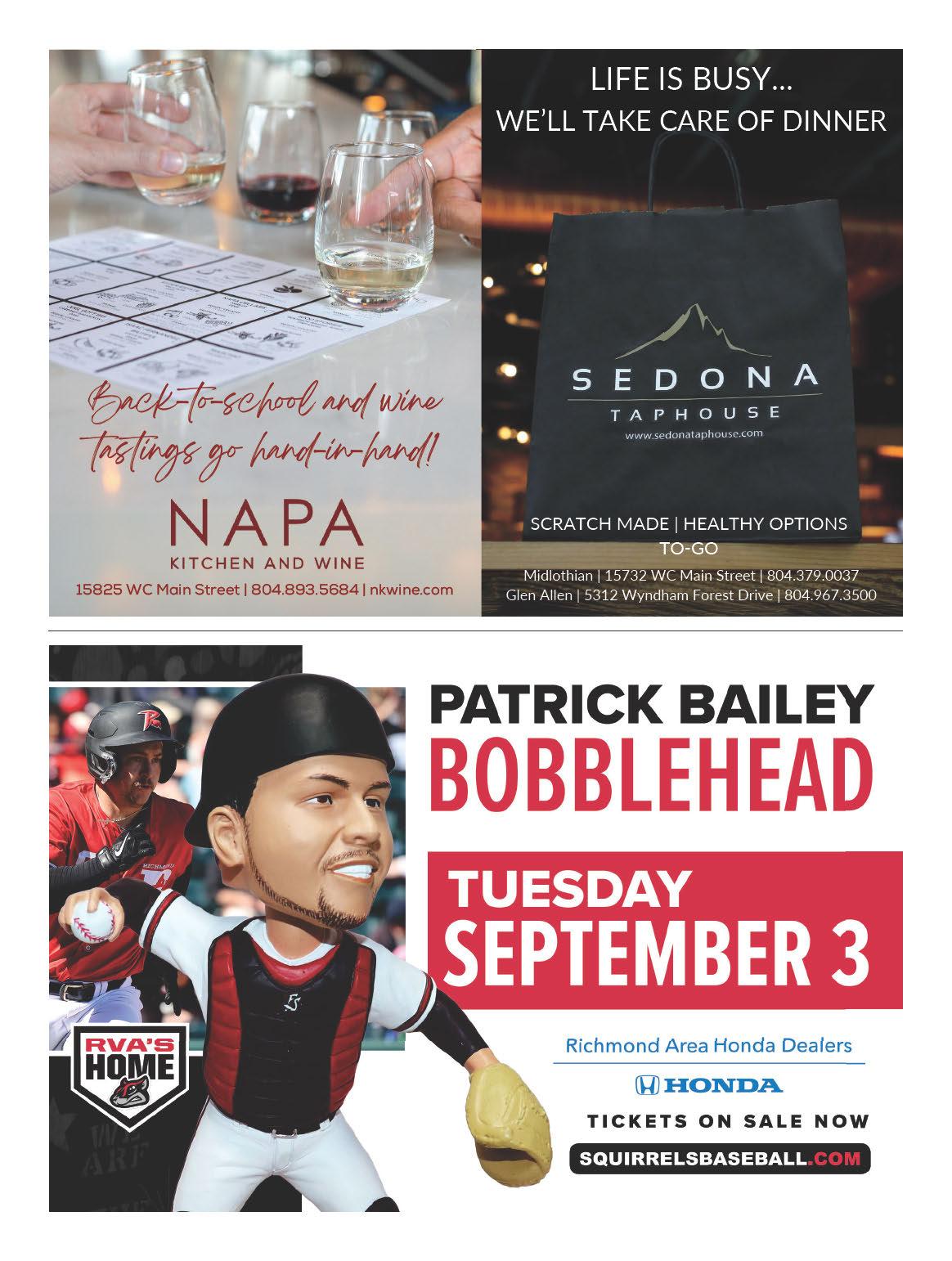







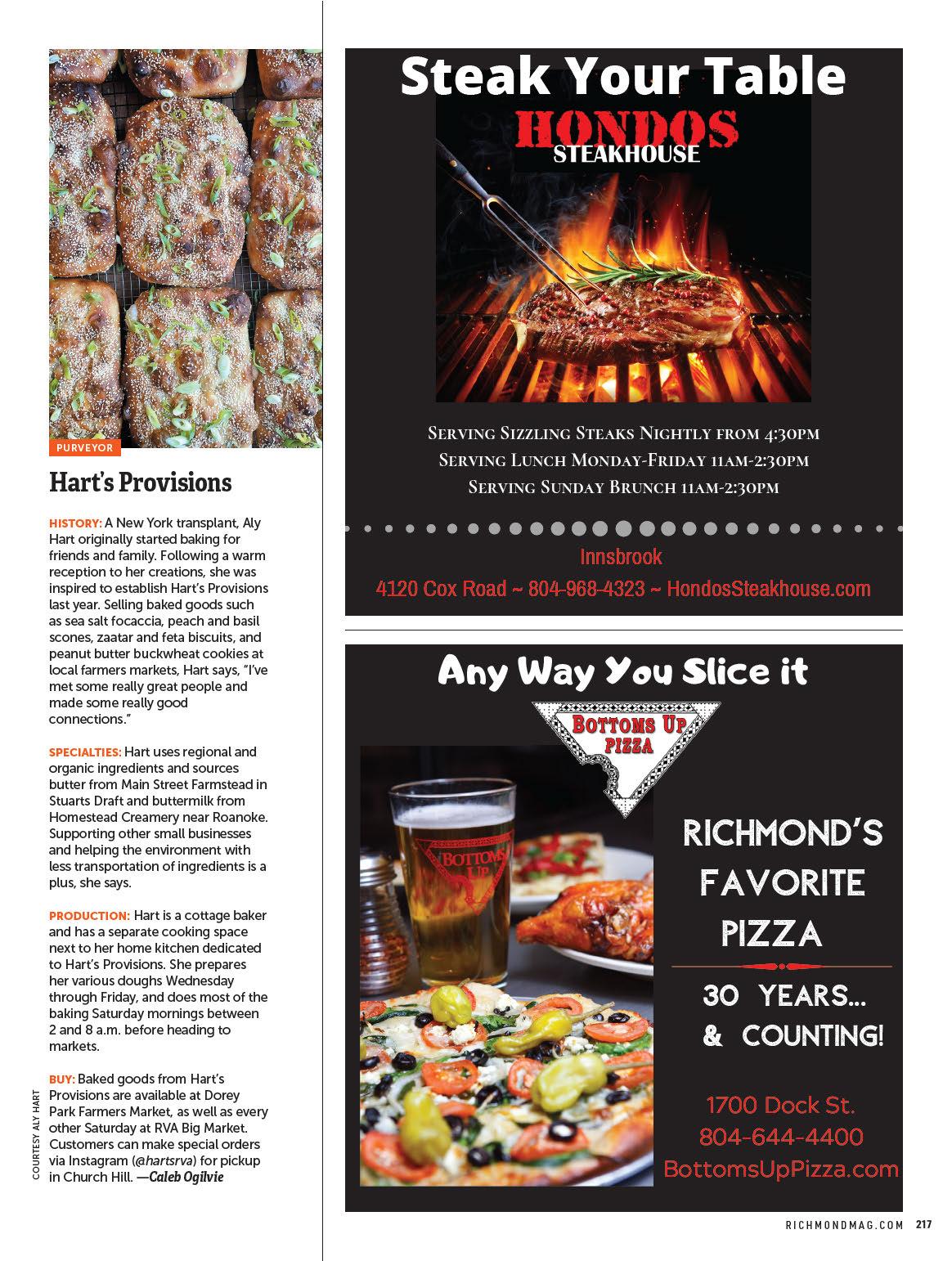


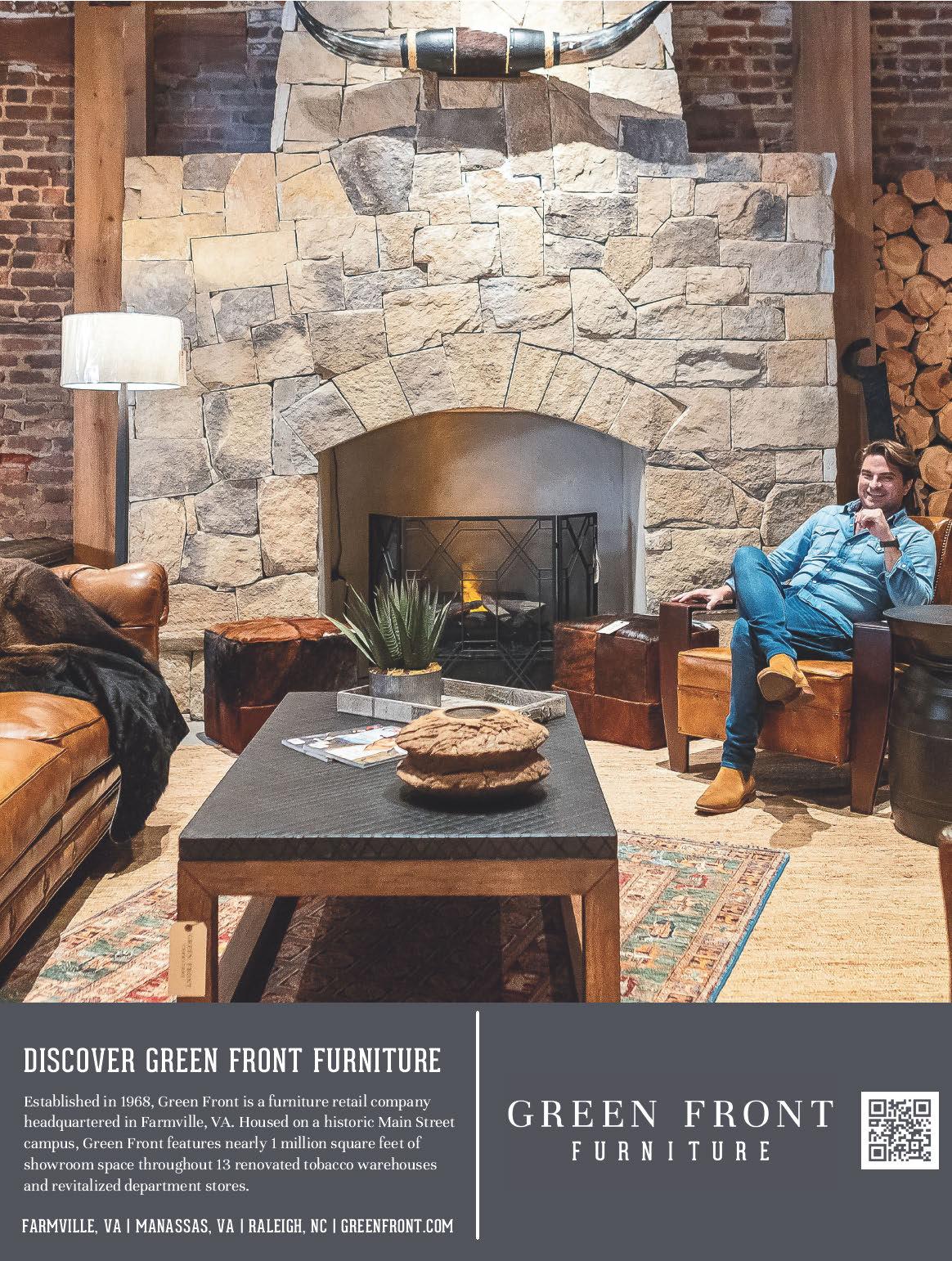

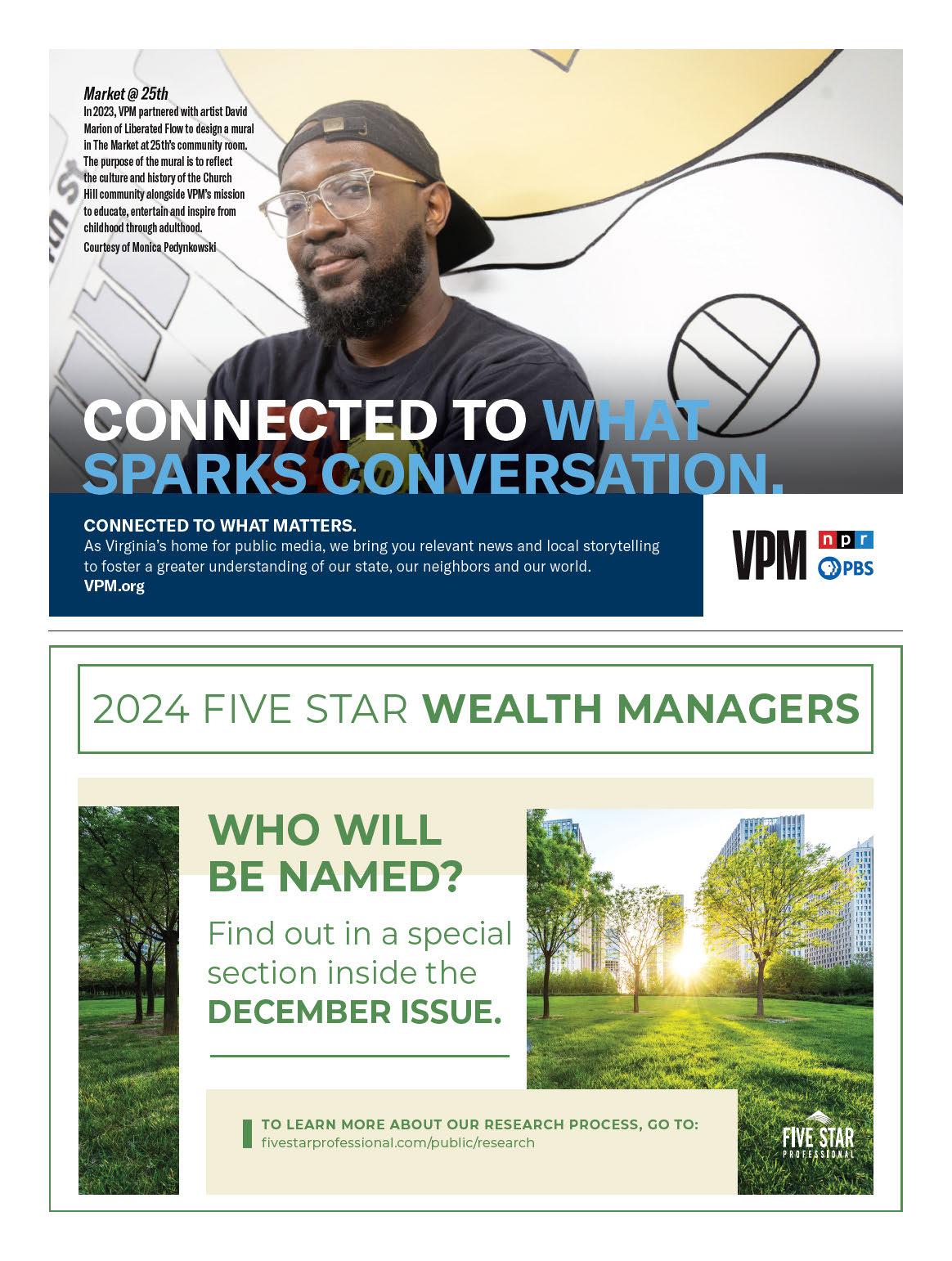
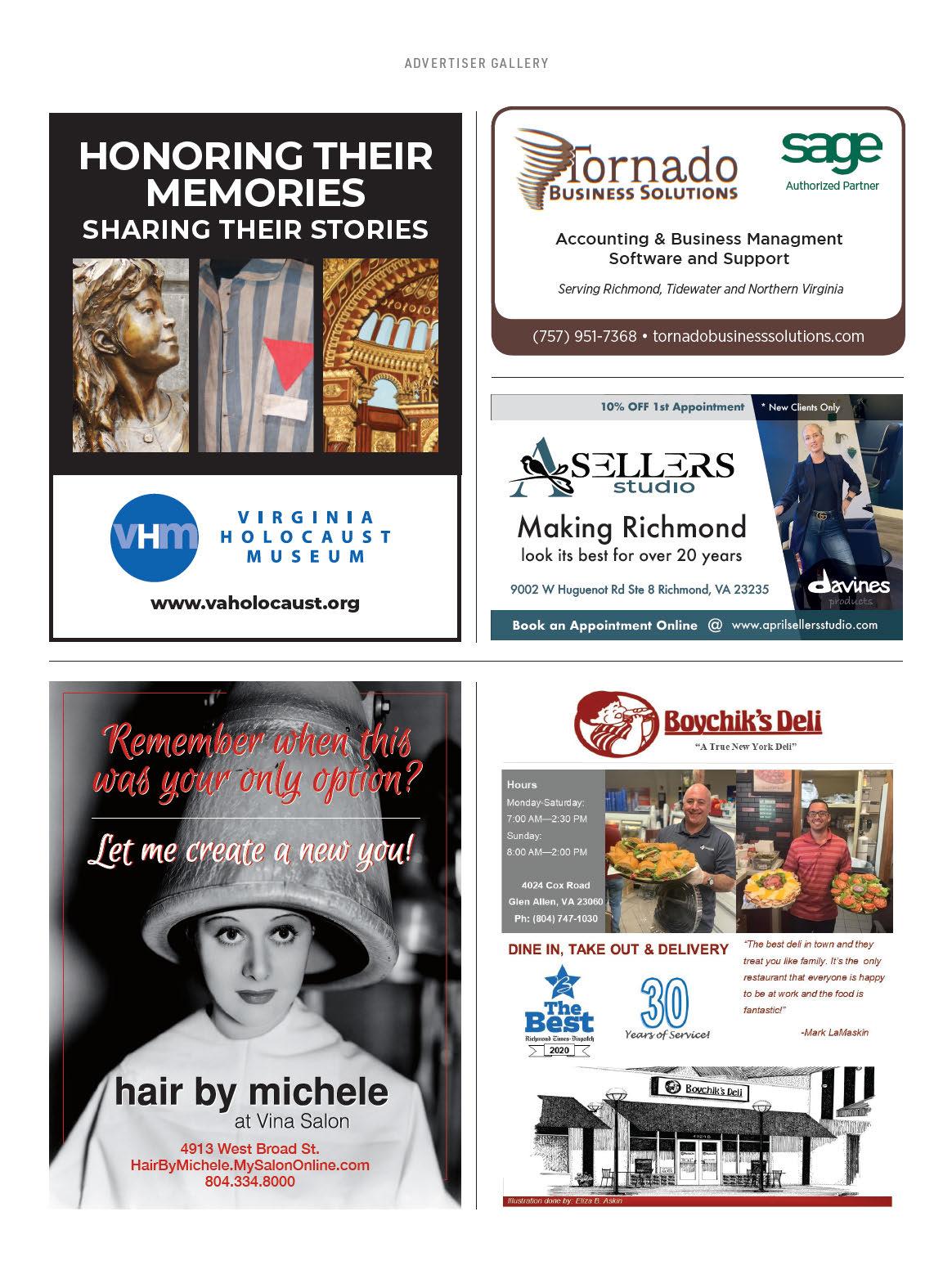
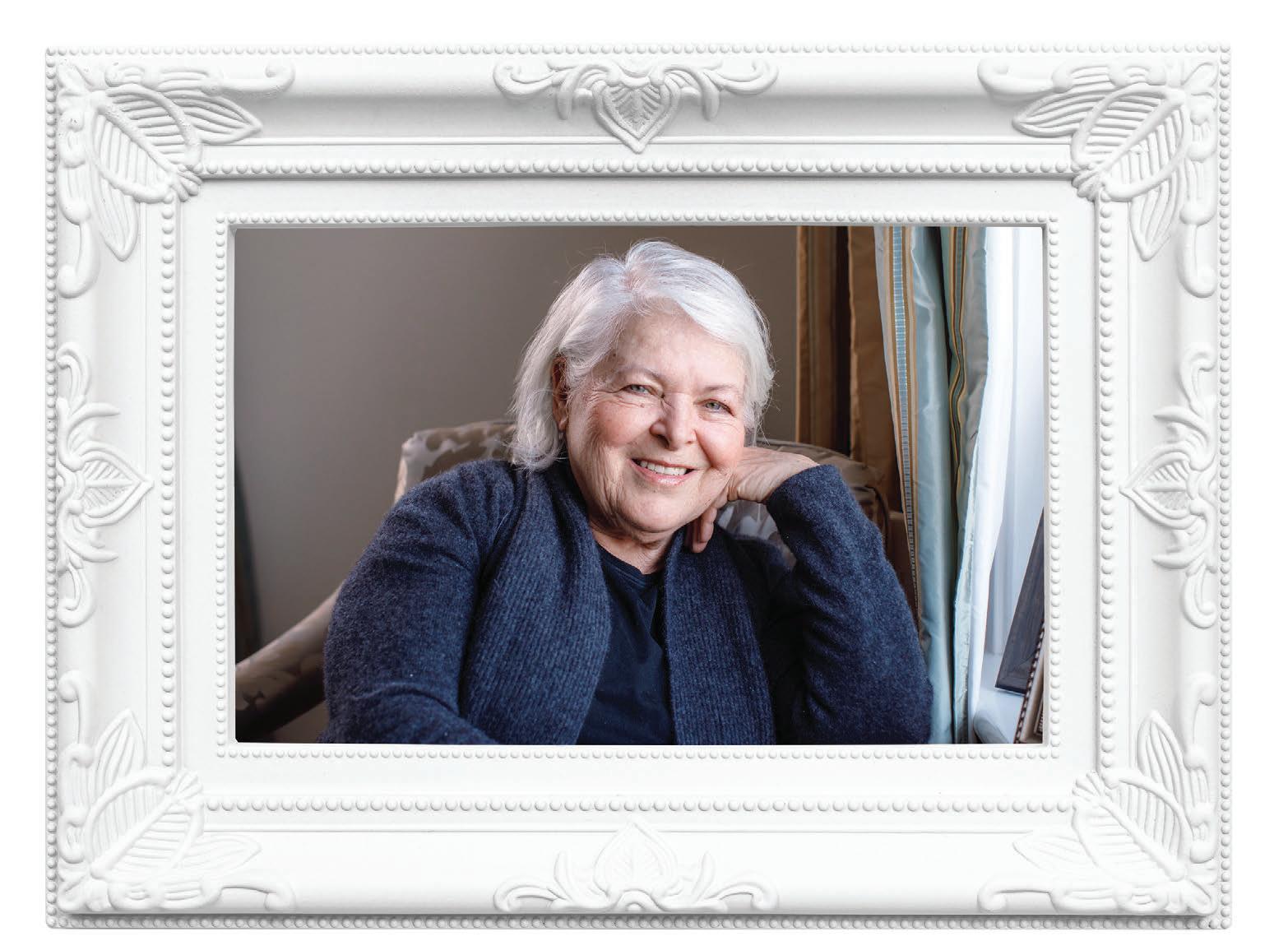
on June 28.
Stella Dikos, tenured chef, beloved Greek matriarch, heart of Stella’s restaurants and markets, and yia yia to all, died peacefully at 82.
A humble heroine, she began cooking in Richmond as a young immigrant and would go on to feed her community for over 50 years. Just days before her death, she was in the kitchen folding her signature spanakopita.
Embodying culture and class, Dikos preserved the traditions she had known since childhood and introduced them to Richmond. Through her, diners got a lesson in flaming saganaki, dolmades, the importance of quality and the concept of meraki — putting your soul into something. She made the city fall in love with Greek food and, more profoundly, with her.
was an immigrant. … You don’t know how happy that made me and how included I felt.”
For many, Dikos was Richmond. She made an impact that rippled through generations and was a source of light for those around her, making people feel seen, understood, loved and nourished — the core of human existence. From the bohemian days of The Village to her namesake restaurant and markets, Dikos was a Richmond legend, and her gentle yet powerful imprint on the community and its culinary scene will extend long beyond her years.
See more photos taken around Richmond at instagram.com/richmondmag.
In a 2019 interview with Richmond magazine, she said, “[Patrons] accepted me even though I
“I’m very lucky that I was strong, and I wasn’t aware that I was,” Dikos said. “I pulled through. There were times I thought I would lose my mind, but I pushed and pushed and got up every morning. The years were tough, but I went through with dignity and took care of my family. I worked hard and got the respect of the community, and for that I’m grateful.” —Eileen Mellon

